

In this exclusive interview, we talk to John about his career, his new book Love, Pain and Money: The Making of a Billionaire, selling his ‘baby’, why anyone could do a better job than some of our politicians, and much more.











In this exclusive interview, we talk to John about his career, his new book Love, Pain and Money: The Making of a Billionaire, selling his ‘baby’, why anyone could do a better job than some of our politicians, and much more.








Meeting the billionaire founder of Phones4u, John Caudwell, at his house in Mayfair with the Business Leader team was an interesting first assignment as Editor. The beautiful home is just a sizable symptom of Caudwell’s success. Sitting in the interview chair while the team was setting up the cameras, I couldn’t help but think about the stories I’d read about Caudwell in preparation for the interview. The “ginger curly-haired” boy from Stoke was now one of the UK’s most renowned and influential business leaders.
We’ve profiled several other self-made billionaires in this edition, and taken a look at whether or not rapid growth can be toxic, along with a deep dive into levelling up: is it a political catchphrase or the future of economic prosperity? We’ve spoken to several experts, but we want to hear your thoughts on these topics. Connect with us on LinkedIn and add your voice to the thousands of leaders and entrepreneurs in the Business Leader network.
Entries for our national Scale-Up Awards are open until April 26th. Celebrate your company’s success by submitting your story to our prestigious panel of judges, including Dragon Touker Suleyman, CEO of the ScaleUp Institute Irene Graham OBE, and investor extraordinaire John Stapleton. Thanks to the brilliant sponsors of the awards whose dedication to UK enterprise shines bright for all to see: BKL, CapEQ, finnCap Group, Rocketmakers, Servcorp, Growth Lending, and Give a Grad a Go. Raise a glass to a successful Q2.
Josh Dornbrack Editor Editorial@businessleader.co.uk | @JDornbrackEDITORIAL
Josh Dornbrack - Editor
E: josh.dornbrack@businessleader.co.uk
James Cook - Digital Editor
E: james.cook@businessleader.co.uk
Serena Haththotuwa - Digital Editor
E: serena.haththotuwa@businessleader.co.uk
Alice Cumming - Editorial Assistant
E: alice.cumming@businessleader.co.uk
DESIGN/PRODUCTION
Adam Whittaker - Head of Design
E: adam.whittaker@businessleader.co.uk

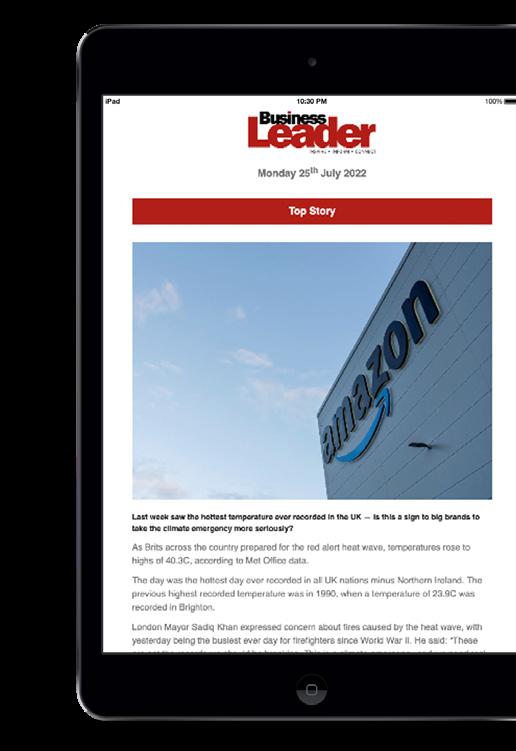
SALES
Sam Clark - Head of Awards Sponsorship
E: sam.clark@businessleader.co.uk
DIGITAL & WEB
Nick Barnes - Video Editor
E: nick.barnes@businessleader.co.uk
Gemma Crew - Marketing Manager
E: gemma.crew@businessleader.co.uk
Rosie Coad - Marketing Executive
E: rosie.coad@businessleader.co.uk
CIRCULATION
Adrian Warburton - Circulation Manager
E: adrian.warburton@businessleader.co.uk
ACCOUNTS
Jo Meredith - Finance Manager
E: joanne.meredith@businessleader.co.uk
DIRECTOR
Oli Ballard - Director
E: oli.ballard@businessleader.co.uk
MANAGING DIRECTOR
Andrew Scott - Managing Director
E: andrew@businessleader.co.uk
Business Leader Magazine is committed to a zero carbon future and supports the World Land Trust by using recyclable paper wrap rather than plastic polywrapping. Carbon-balanced PEFC® certified paper, which is sourced from responsible forestry, is produced in an environmentally-friendly way to offset our CO2 emissions.

New research from open banking platform Yapily reveals businesses are potentially losing up to £656m in missed revenue at the last mile.

The research, which polled 2,000 adults in the UK, found that 52% of those surveyed have ditched at least one online purchase in the last 12 months due to a poor experience at the online checkout.
The need to manually input card details (25%), merchants not
accepting their preferred payment method (19%), and payments being blocked due to suspected fraud (15%) were among the most popular reasons for consumers abandoning their online purchases.

Abandoned sales were mostly priced between £21 and £60 (69%) and £61 and £100 (25%), with the average value of a discarded shopping basket sitting at £30.
A community of peers, advisers, customers and investors isn’t just a nice-to-have: many entrepreneurs claim community is critical to growth. However, over half (55%) of Series A founders claim engaging contributors in their business is their biggest challenge, according to the latest research by Koos.io.
Almost two-thirds (64%) of Series A founders said that sharing their business success with those who contributed was key to their success and growth, while almost twofifths (39.4%) recognised that building a loyal, supportive and engaged community of contributors was a contributing factor to helping their fundraising case.
At the same time, three-fifths (60.6%) admitted that demonstrating their business’s growth and impact has been the most challenging aspect when fundraising.
Wise, the global technology company, has released new research showing that banks took £3.6bn in often hidden FX fees from small- and medium-sized businesses in 2022.
Detailed in a new report, The Cost of Going Global: How are banks stifling dreams of overseas growth for UK SMBs?, it was found that last year all UK businesses lost £4.2bn in FX fees when selling goods and services overseas. The report details the scale of the problem for SMBs, which is compounded by exchange rate volatility and banks often hiding their fees.





For the sixth year in a row, Finland has been named the happiest country in the annual World Happiness Report published by the Sustainable Development Solutions Network, a global initiative of the United Nations. Research shows that satisfaction correlates with a wellfunctioning democracy, free elections, free press, and a low corruption index, along with inclusive social security services helping those who need assistance. These aspects combine to create a perception of well-being, and in these areas, Finland remains at the top globally.
Antti Aumo, Head of Invest in Finland from Business Finland, commented: “In Finland, the idea is that a well-functioning welfare state creates the prerequisites for a favourable business environment, enabling companies and individuals to succeed. This safety net functions as a trampoline in Finland, giving an extra lift for Finnish people and companies.”
As one of the world’s most competitive and open economies, Finland offers an outstanding launchpad for businesses. Here are three factors that create corporate happiness
Did you know that Finland enjoys the lowest corporate tax rate in the Nordic region and one of the lowest rates in the EU? The corporate tax rate in Finland is 20%, which is a fraction lower than the EU average (21.3%).
It all starts with education in Finland. The world-class educational system here is the foundation of the country’s cutting-edge research and innovation. With affordable daycare and free schooling available for all from preschool through university, Finns are not only highly educated and skilled but also represent the highest level of digital talent in Europe.
Finland ranks as the most stable country in the world2 when measured by political, social, economic and cohesion indicators. The business environment here thus offers extraordinarily high levels of continuity, trust, and transparency.

Transparent governance and effective state institutions are among the pillars of our well-functioning society, which in turn also reduces risks for international businesses.
PerfectTed is led by entrepreneurs, housemates and best friends, Marisa Poster and brothers Teddie and Levi Levenfiche. Together they have created Europe’s first matcha green tea-powered canned energy drink, which has now been launched in Tesco stores.

Powered by organic, ceremonial grade matcha, an antioxidantrich, Japanese matcha green tea,
PerfectTed contains 80mg caffeine (equivalent to a Red Bull or a small cup of coffee) and a more enduring and stable energy source.
Marisa Poster, Co-founder of PerfectTed, said: “We’re thrilled to partner with the UK’s leading grocer to grow the natural energy category and make healthier matcha green tea energy more accessible to consumers nationwide”.
Glovo, a multi-category app, has announced the launch of Impact Fund, a first-of-its-kind in the rapidly growing delivery industry where a small amount of Glovo’s earnings from every order will be dedicated to boosting Impact & Sustainability projects.
By the end of 2023, the Impact Fund will have dedicated up to five million euros (£4.4m) for projects related to supporting local communities, climate action initiatives, the digitalisation of small local businesses, closing the gender gap in tech, and upskilling programmes for couriers. This includes funds that have been allocated to these projects since mid-2021.


Staffordshire-based Top Online Partners Group, which owns the UK’s cashback site TopCashback, has expanded into Australia with the launch of TopCashback Australia.
The new cashback site already features over 600 popular Australian brands, offering members savings on everything from fashion to food, travel, technology, and much more.
Like its UK counterpart, the site’s aim is to help its members save as much money as possible by securing the best cashback rates on offer.
TopCashback Australia joins the group’s five-strong network of existing cashback sites (UK, USA, China, France, and Germany) which have a membership base of over 21 million people worldwide.
The new launch also marks a key milestone for the group as it’s on a mission to become the world’s best and biggest cashback provider.
Last year, TopCashback won the Queen’s Award for Enterprise in the International Trade category, which recognises businesses who have demonstrated substantial growth and commercial success overseas.
Graham Jenner, Director of International Growth of Top Online Group Partners, says: “We are delighted to add yet another country to our ever-growing list of international cashback sites, which brings us a
step closer on our journey to become not only the best and most respected cashback provider in the world, but also one of the biggest.
“With our focus on giving our members the best service and cashback rates, we’re confident that we have a winning service that is exportable across the globe.
“We look forward with optimism to continued growth and expanding into even more territories.”
Indigo Sun has reported its best-ever results, recording a turnover of more than £26m and almost £5.6m profit in its latest financial year.
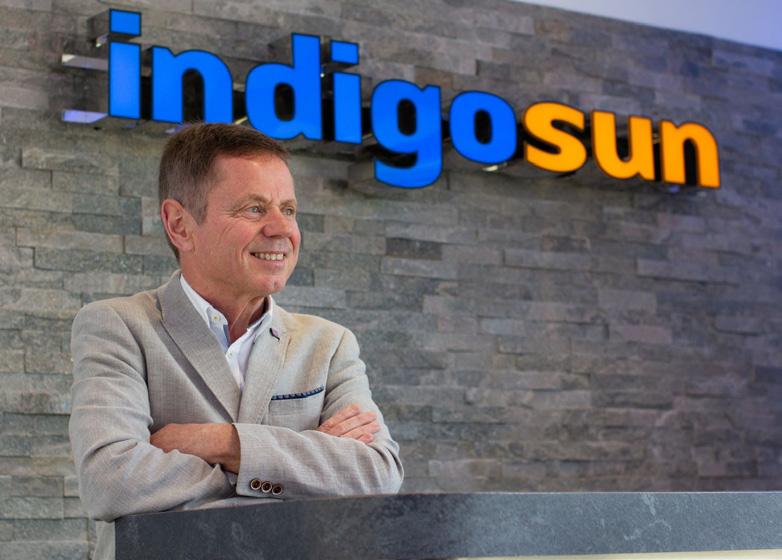
The family-owned Scottish business has seen both turnover and profits double on the previous financial period when performance was hampered by months of Covid lockdowns. However, owners of the firm, which is headquartered in Stirling, say the impressive figures far outstrip performance even in preCovid years, giving the business a platform for an ambitious period of expansion.
Frank Taylor, 72, the founder and CEO of Indigo Sun, said: “In 2022 we saw full freedom from Covid closures. As the economy reopened, our customers were determined to get back to normal and to go on holiday with great enthusiasm.”

Amazon UNIVERSITY Esports has launched UNIVERSITY World, a project that brings the Metaverse to the esports and education sectors to connect students across the globe.
UNIVERSITY World is the newly launched virtual world of Amazon UNIVERSITY Esports, the esports and education project aimed at university students from 16 countries on four continents. In this newly designed space, students, and
wider audiences who want to access the space, will be able to interact with each other, both in a central hall common to all countries, as well as in the specific rooms of each one.
This will create a community among players from all over the world, being able to communicate through the integrated chat, score points to win prizes through different mini-games, and other multiple activities.
The UK’s number 1 search and discovery platform for home furniture and furnishings has raised £3.4m in seed funding following on from a £1.8m pre-seed in 2020. This brings the total funding to over £5.2m since the platform launched.

The business has attracted an impressive list of investors, both male and female who have a varied background and bring different insights and value add to
ufurnish.com, such as Michele Connolly, Partner at KPMG and Rosaleen Blair, founder and Chair of Alexander Mann Solutions.
Deirdre Mc Gettrick, the founder of ufurnish.com, comments, “It is invaluable to be able to reach out and share challenges and opportunities from my business with my investors. Often given their experience, they have insights over and above what I might have considered”.
The Bank of England has raised interest rates for the 11th time in less than 18 months. Following the latest jump in inflation, interest rates have risen to 4.25%. With interest rates going up again, the Bank of England hopes to drive inflation down.
However, Pietro Castelli, Head of Finance at Board, says the rise will place further pressure on businesses. He comments: “New data by Board International reveals a fifth (22%) of businesses do not have the tools to deal with another interest rate rise. There are lots of different ways companies can mitigate against economic fluctuations – increasing prices, changing suppliers, leaving, or entering new markets – but leaders must ensure that their planning and decision-making processes have the agility to deal with multiple scenarios and adapt quickly. In other words, they must develop a new set of planning muscles.”
With its growth of 522% over the past year, UK CBD company TRIP has become the fastest-growing soft drinks brand. The brand is growing at more than twice the rate of the second fastest-growing brand (compared with other brands with over £500,000 in sales the year before).

Founder Olivia Ferdi described the year’s achievements as “a special milestone for us, showing how far TRIP has come in our mission to destigmatize conversations about mental wellbeing and rework misconceptions about CBD, helping millions prioritise their health.”
But why the sudden demand? Studies show that people are increasingly giving up drinking, and since most alcohol alternatives generally don’t have the same calming effect, people are switching to CBD drinks to help them unwind without the threat of a hangover.

As a business leader, you know that the hardest climb isn’t Kilimanjaro, Denali or Everest. It’s the CEO’s leadership journey, and it’s fraught with all kinds of challenges and opportunities, setbacks and advances. The good news is you don’t have to go it alone. You can travel with an experienced guide who knows the lay of the land and an elite team of peers who’ve got your back.
You can equip yourself with world-class resources to navigate changing environments and uncertain conditions. You can take an approach forged over 65 years and travelled by 100,000+ CEOs of small and medium sized businesses around the world.
With that kind of support, how high could you ascend?

If you’re ready for the climb of a lifetime, the path starts here. Learn more at vistage.co.uk





Almost everyone on the planet has an obsession with the mindset of a billionaire. Many of these super-wealthy individuals began life with a distinct lack of a silver spoon and have scratched, clawed and worked ungodly amounts to achieve this privileged status.
Making the trip to meet with John Caudwell, founder of the Caudwell Group – which included mobile phone retailer Phones4u –at his house in Mayfair, showed just how far this young “ginger curly haired boy” from the streets of Stoke-on-Trent has come. In this exclusive interview, we talk to John about his career, his new book Love, Pain and Money: The Making of a Billionaire, selling his baby Phones4u, why anyone could do a better job than some of our politicians, and much more.
IF WE WENT BACK TO SPEAK TO A YOUNG CAUDWELL AND TOLD HIM THAT ONE DAY HE WILL BECOME A BILLIONAIRE, AND HELP OVER 65,000 CHILDREN AND THEIR FAMILIES THROUGH CAUDWELL CHILDREN, WHAT WOULD YOUR REACTION BE?
Even if you’d have asked a 30 or even 35-year-old John Caudwell… I would have been incredulous. Helping the children that might have been likely from day one, because I’d always had desire to help change some parts of the world as much as I was able to. However, you can’t do that without the wealth. You can do little bits without the wealth, but you can’t do big things without the wealth.
I would have never thought that I could be a multimillionaire, let alone a billionaire. You make your first bit of money, and then you start thinking, “could I get into the Sunday Times Rich List?” Looking back, it seems like such a superficial target to have, but you measure your success over years in different ways. In those early years, being valued at say £50m and making the Sunday Times Rich List seemed like I’d hit the jackpot.
COULD YOU TELL US ABOUT THE EARLY YEARS OF BUILDING THE CAUDWELL GROUP?
It originally started when I was trading cars. If I needed to call a customer, and couldn’t get to a BT phone box, I’d lose
the opportunity for the car. Then I saw this guy come into the auction with a great big suitcase phone, and thought, “wow, what is that?” This is 1986, so none of us had ever seen a device like that. I went over and started chatting to him and found out that it was a (very large) mobile phone.
I just thought it was incredible that this device existed because I didn’t know anything about them. I went back to the office and tried to find a supplier of mobile phones. Given where we are today, it’s unbelievable looking back because you couldn’t find anybody that could sell your mobile phone. I rang BT, who owned Cellnet at the time, but nobody knew anything about it.
I eventually set up a dealer account with Motorola and bought 26 phones. I lost money every month for two years.
WHEN YOU WERE LOSING MONEY, DID ANY PART OF YOU THINK THAT IT WAS TIME TO PACK IT IN AND ADMIT FAILURE?
I was making about £5,000 a month in car sales and losing about half it, which was very painful. But I absolutely believed in the future of mobile phones. I could not see why they wouldn’t catch on. At that time, I certainly didn’t see phones becoming the product they are today where every single person has one or more, but I did see every businessperson having one.

The turning point was two years later. I had six people running my two businesses, and then suddenly three of them resigned. As a result, I had to focus on the mobile phone business, and within three or four weeks, I turned a £2,000 loss into £20,000 profit. All of a sudden, I found levers that I could pull that were hugely profitable.
THE CAUDWELL GROUP WAS KNOWN FOR HAVING GREAT TALENT. HOW DID YOU MANAGE TO RETAIN THAT TALENT?
It’s not replicable in every business, but there’s a number of levers you can use to motivate people. One of the levers for me was that I was intending to be the UK’s most successful cellular business. Most people who are ambitious want to be part of a hugely winning formula, so the prestige of working in the Caudwell group was one of those levers. However, it’s nowhere near enough on its own. You also have to make sure that what you’re doing is paying people appropriately, putting in big bonuses for exceptional performance, but for the top people, I always put in a wealth creation scheme. It was designed in such a way that gave me quite a lot of control, but at the same time, it gave the employee a real chance of a significant payday.
THE CAUDWELL GROUP WAS WELL KNOWN FOR ITS COMPANY CULTURE. IN A WORLD OF WORKING FROM HOME, DO YOU THINK IT WOULD BE DIFFICULT TO BUILD A SIMILAR CULTURE TODAY?
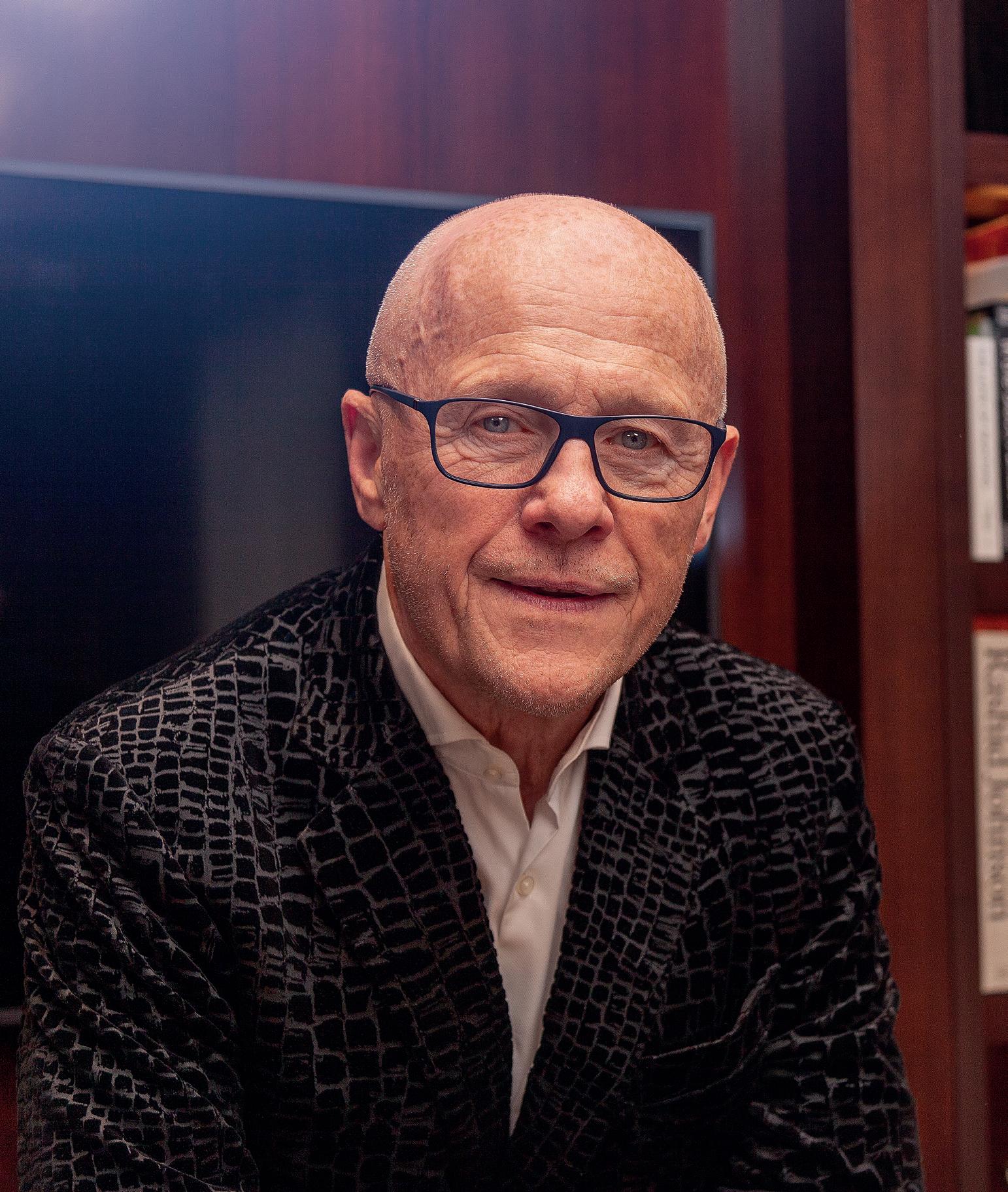
I think from a point of view of employee relations, undoubtedly, it would be more difficult. I never believed in working from home, and I still don’t. It’s good for certain people, certain employees and certain situations, but what you want is a big dynamic environment, where everybody’s learning from each other. Where managers can coach, peers can help, and you get a dynamic environment that’s exciting.
If you’re an architect working from home, you don’t need that buzz while you’re designing things. But a business like Phones4u, and the wider Group, was all based on dynamicism, excitement and hype. We were also big on teaching and coaching – how can you do that if people are working from home?
COULD A BUSINESS LIKE PHONES4U BE REPLICATED TODAY?
It can’t be replicated now no. It was a land grab by the networks. Both the networks and the manufacturers desperately needed volume, as it was a real crucial part of the game. That gave me negotiating power. Not that that was easy, it was a constant edge of the seat thing, because every time I negotiated a deal enabled me to grow market share. Every time I grew my power, they tried to clip my wings.
They were constantly looking at how they could get the best out of Phones4u, but not let us get too powerful. And they did some horrible things over the years. One of the reasons I ended up selling the business in 2006 was because the stress level of managing a business where you’ve got somebody who completely controls your existence is a very uncomfortable place to be.
“MOST PEOPLE WHO ARE AMBITIOUS WANT TO BE PART OF A HUGELY WINNING FORMULA, SO THE PRESTIGE OF WORKING IN THE CAUDWELL GROUP WAS ONE OF THOSE LEVERS. HOWEVER, IT’S NOWHERE NEAR ENOUGH ON ITS OWN.”
WHEN YOU EXITED THE BUSINESS IN 2006, WAS IT A DIFFICULT DECISION OR DID YOU HAVE YOUR HEART SET ON SELLING?
Selling the business was very much an evolution. I’d had about 16 years of massive stress, and some of the challenges I faced were potentially terminal. One of those challenges was Motorola cancelling my contract in the early days, when it was 90/95% of my business. I found a way through, but each time you go through that, the stress levels are enormous. It was a very difficult and lonely place to be.
After 16 years of fighting like that, I also realised that I hadn’t fulfilled much of my charitable endeavours. At that time, I’d founded Caudwell Children and we’d helped about 4,000 or 5,000 children, but it was nowhere near the change that I wanted to make during my lifetime. I ended up just thinking, maybe the time is right to sell. From then, I started positioning the company for a sale, which went through a few years later.
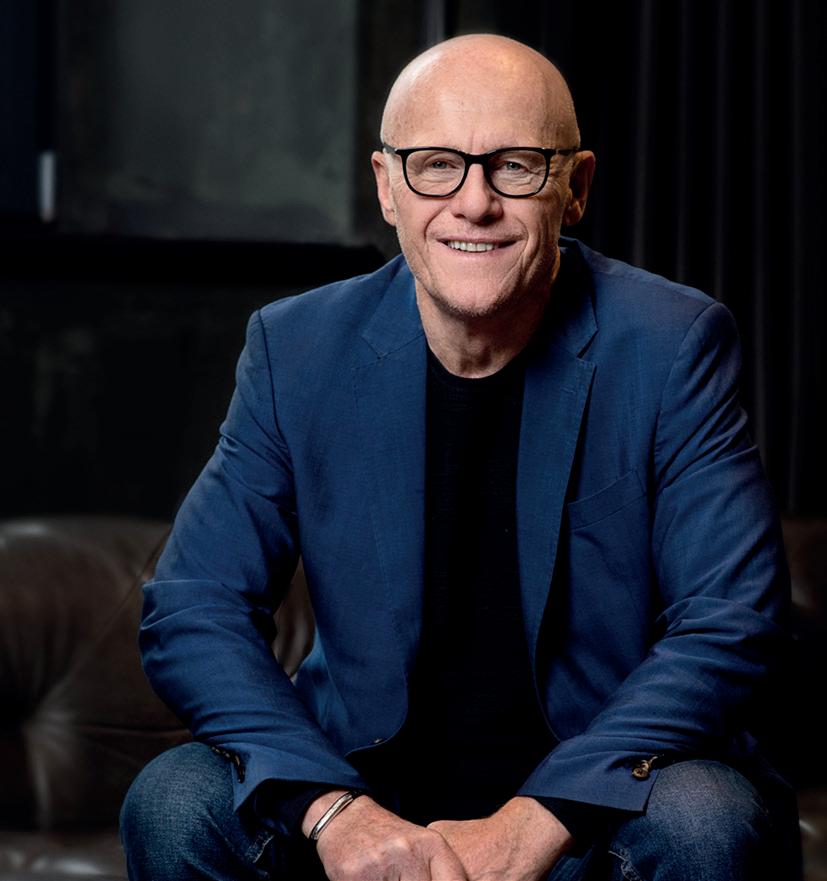
DID YOU HAVE ANY SELLER’S REMORSE AFTER EXITING YOUR BUSINESS?
It was an interesting progression. If you go from 2002, can I really sell this baby? Because it’s exactly that, I’d grown it from zero and there was only me, to having over 12,000 employees. In certain aspects like distribution of phones and accessories, we’d become the biggest in the world. The sense of satisfaction and achievement that goes with that is huge. It’s your entire life, your family, your ego, it’s your identity, it’s everything. So in the early days, it was very, very difficult to admit that I’m selling my baby. However, as we got nearer to the sale, the stresses and pressures were just continuing at a massive pace. When we were going through the sale process, it was really hit and miss all the way through, and when the day came when we finalised the deal, it was actually a massive sense of relief. That feeling has never changed because it then enabled me to do everything that I wanted to do from a charitable perspective and from other opportunities.
SOME PEOPLE BELIEVE IT’S BEST TO PREPARE FOR A SALE FROM WHEN YOU FIRST START YOUR COMPANY, BUT OTHERS BELIEVE THAT IT CAN BECOME A DISTRACTION WHILE BUILDING A BUSINESS. WHICH APPROACH DO YOU BELIEVE IS BEST?
I’d say both. As long as you’re not ducking and diving and manipulating the situation, the two are one in the same side of the coin. They only become different sides of the coin, if you’re taking short-term strategies to try and sell your business, selling it out on a high but actually sacrificing the future as a consequence.
We see that happening in business all the time, where some chief executive sacrifices the future by under investing. You’ve got to take this balanced view of grooming the business in the most profitable way. For the short-, medium- and long-term.
WHAT ARE YOUR THOUGHTS ON THE TREND OF COMPANIES RAISING A LOT OF MONEY, WITH WILD VALUATIONS, BEFORE EVEN TURNING A PROFIT?
I think it’s easier to become super wealthy today than it’s ever been because of the
dot-com boom, which of course, came and went and now is back again. If you’ve got a globalised strategy with an internet-based product of any sort that can be successful, you can roll that out on a phenomenal scale. In my day, you couldn’t really do that.
Towards the end of Phones4u, we of course had internet sales, but the internet only really came into its own in the last 10/15 years. With the internet today, the opportunities are immense. If you get the right product or right application, your ability to create billions of wealth is phenomenal. That that was never the case 30 years ago.
WHAT IS YOUR PROGNOSIS FOR THE UK ECONOMY CURRENTLY?
Well, I’m very disappointed with where we are. In March 2020, I launched Caudwell Pandemic Recovery because I visualised the catastrophic consequences of the pandemic on the economy. There were four focal points, but the main one was to have a huge area somewhere in the UK, which for a number of years would be a tax-free enterprise zone.
It would only be for environmentally friendly technologies. We would recruit businesses from all over the world to come to this zone, and they’d because of the tax advantages that we’d be able to give them. One of the reasons I was a very strong Brexiteer, was because you could not do this as part of the EU. They just wouldn’t allow it. Having this enterprise zone could have created a huge future for Britain.
We’d still be in the same economic gloom that we’re in today, but the future would be brighter. We could be saying, “We’ve already got 50 companies signed up for this, we’ll get another 1,000 and we’ll be producing environmental technologies that the whole world will be wanting in the future.”
We would be able to export the product and the intellectual property all over the world, and Britain will be booming in 10 years’ time. We’d have something to tell the world that would be phenomenally exciting and positive. Unfortunately, the Government has done nothing. I’m devastated for the UK, because the opportunity hasn’t been grasped, and there was a massive opportunity. Now we find ourselves in a mess with the economy looking like growing the least and in Europe, and the “Great” in Great Britain slipping away. The politicians have just not done the right job.
“I THINK IT’S EASIER TO BECOME SUPER WEALTHY TODAY THAN IT’S EVER BEEN BECAUSE OF THE DOT-COM BOOM, WHICH OF COURSE, CAME AND WENT AND NOW IS BACK AGAIN.”
THERE’S A TRAIN OF THOUGHT THAT BILLIONAIRES SHOULD BE BROUGHT INTO DISCUSSIONS ABOUT POLICY, AND THE DELIVERY OF THOSE POLICIES BECAUSE THEY AREN’T AFFECTED BY A FOUR- OR FIVE-YEAR CAMPAIGN CYCLE LIKE POLITICIANS ARE. WHAT ARE YOUR THOUGHTS ON THAT?
I think anybody getting involved could do a better job than some of our politicians. The problem with politics is people get in it for the wrong reasons. They get in it for power. They get in it for fame. So all the time, they’re just driving for a different set of objectives. What we really need is politicians who are commercially minded, who are driving Britain as a PLC, because that’s all we are. We need to create wealth, and from that wealth, we can look after the poorer members of society, we can provide wonderful social
services, great health care, etc, etc. However, if the business doesn’t prosper, we can’t do any of that. First and foremost, we need to get the business right, and we never do.
YOU’RE A BIG ADVOCATE OF SUSTAINABILITY, AND YOU PUT YOUR MONEY WHERE YOUR MOUTH IS WITH YOUR DEVELOPMENTS SUCH AS 1 MAYFAIR. YOU ALSO FAMOUSLY PREDICTED THE 2008 FINANCIAL CRISIS BEFORE IT HAPPENED. LOOKING AT SUSTAINABILITY AND WHAT IS GOING ON IN THE GOVERNMENTS AROUND THE WORLD AT THE MOMENT, WHAT DO YOU THINK THE FUTURE HOLDS?
If you asked me what are my big concerns in life, number one is the viability of the earth to survive. I don’t think anywhere near enough is being done. It’s not just about climate change, it’s one of the factors, but the real issue is water shortage.
My number two concern is security and the very toxic world we’re living in. Russia’s invasion of Ukraine, megalomaniacs in North Korea and the relationship between Russia and China, what we seem to have is a real attack on Western style democracy. These genocidal people who don’t spare a thought about human life and who are prepared to slaughter as many people as they will need to do to fulfil their own objectives. Going back to the Greek Empire, Roman Empire, British Empire, it’s always going to be the case, but I think, for me, the Russians invading Ukraine, have really brought that home in a big, big way.
HOW DID YOU FIND THE EXPERIENCE OF WRITING YOUR BOOK, LOVE, PAIN AND MONEY: THE MAKING OF A BILLIONAIRE?
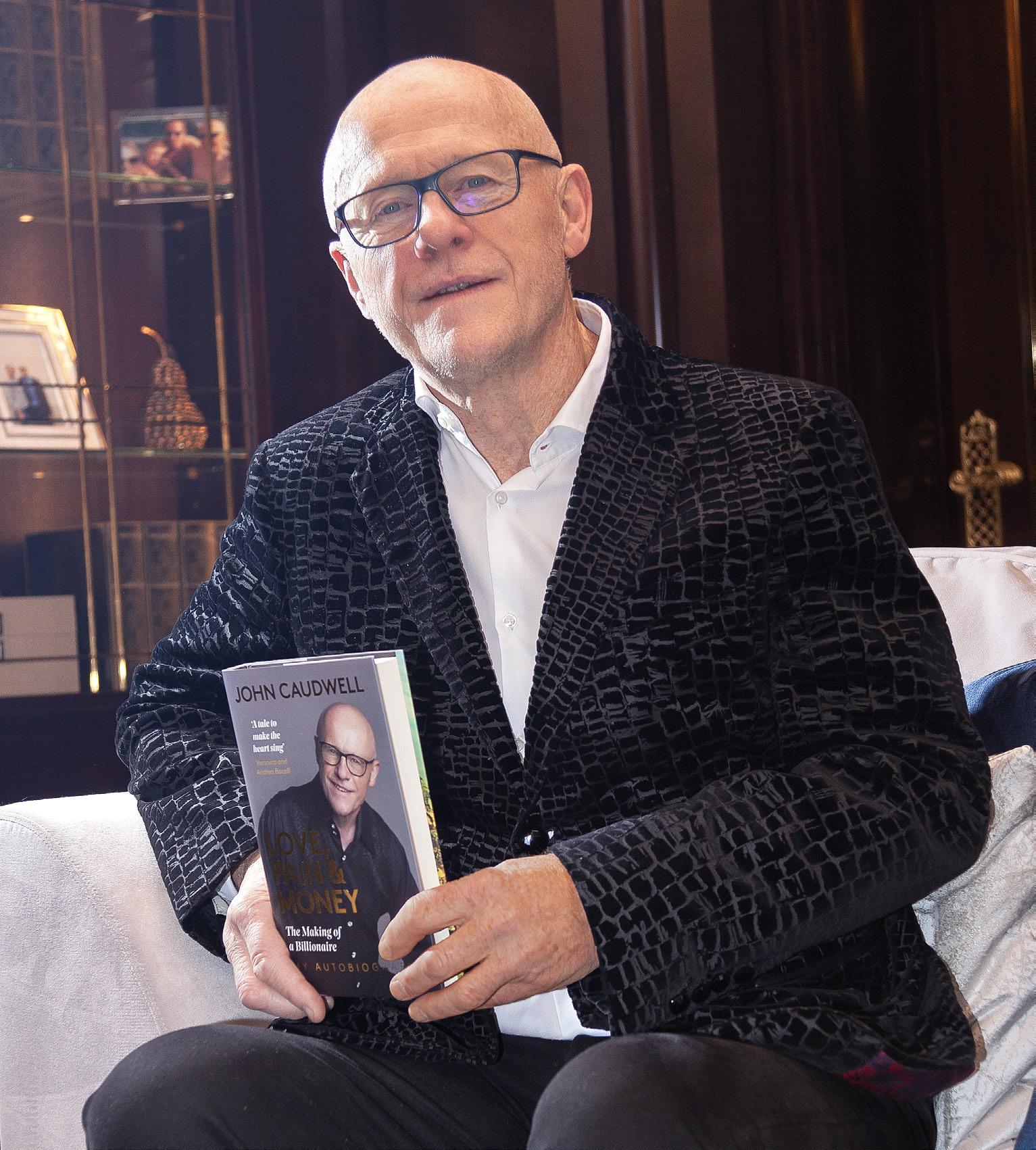
It came about as a result of the pandemic, because I suddenly couldn’t go anywhere. I suddenly found a little bit of spare time, and people have been encouraging me to write an autobiography for 20/30 years, so I suddenly bit the bullet and slowly started doing it.
It was incredibly emotional, because I had to search to the depths of my darkest moments in life to tell the story. Some of those stories were very emotional for me reliving devasting memories. However, despite being sad and painful it was enjoyable. That’s why the “pain” comes into the title, as my life is all about love, all about pain, and all about money.
“THE PROBLEM WITH POLITICS IS PEOPLE GET IN IT FOR THE WRONG REASONS. THEY GET IN IT FOR POWER. THEY GET IN IT FOR FAME. SO ALL THE TIME, THEY’RE JUST DRIVING FOR A DIFFERENT SET OF OBJECTIVES.”
If these uncertain times have presented an opportunity for organic growth and you need funding, our expertise spans debt, equity and everything in between.
Put simply, our advisory service builds funder confidence in you and your business. We present your growth strategy to the right funders, in the right way and negotiate the best terms for you, giving you the best chance of unlocking your growth potential. Here’s how we can fund your growth ambitions:
• Business acquisition financing
• Growth funding
• Management Buy-in & Management Buyout financing
Whether it’s to become an owner, strengthen your market position or to expand your existing portfolio, our M&A experts help individuals and management teams to buy a business at the right price, on the right terms, and with the right funding in place. Here’s how we can help accelerate your growth:
• Acquisitions
• Management Buy-in (MBI) & Management Buyout (MBO)
• Business mergers
When it’s time to sell the business you’ve grown, our ‘sellside’ advisory services help owners sell to the right buyers, at the right price, and on the right terms whilst maximising and protecting the value you have created. Here’s how we can help you sell your business:
• Developing your business exit strategy
• Business valuations
• Business sales (Trade, Private Equity, MBO & EOT)
• Pre-sale tax planning advice
VISIT: SHAWCORPORATEFINANCE.COM
BOOK A MEETING: 0330 127 0100
“Shaw & Co very effectively ran first our debt raise and then subsequently our equity deal – recognising and addressing our needs extremely competently throughout both processes. Our faith in Shaw & Co’s expertise to deliver these transactions to completion was vital as it allowed us to maintain focus on ensuring the performance of the business met the expectations of our shareholders and investors.”
Dr Simon Tyler, Chief Commercial Officer at CatSci Ltd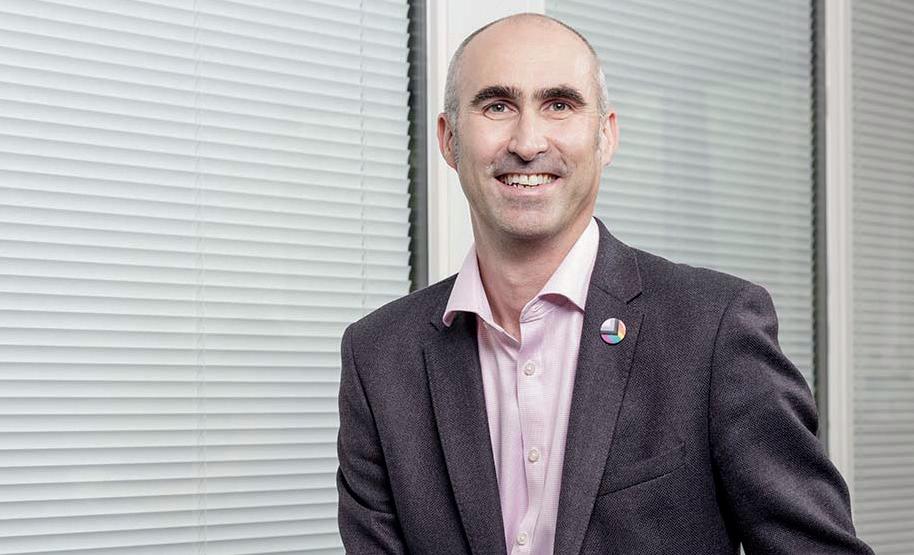
Our entire approach is focused on helping you achieve your greatest ambitions. We succeed only when you do – whether raising finance, buying a business or selling one you have grown.
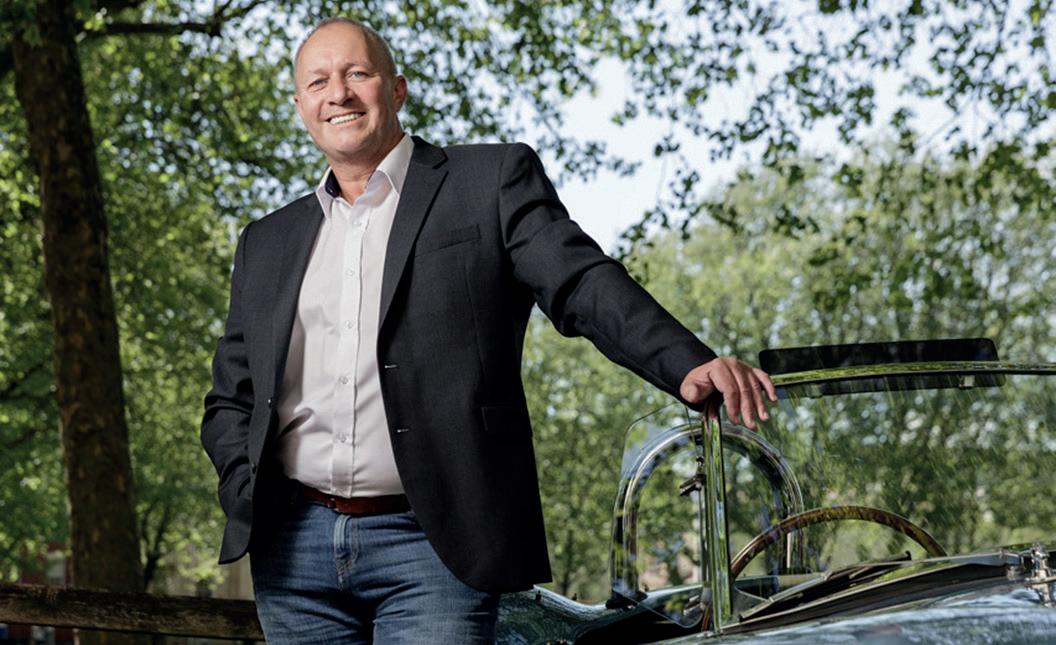
£26M TRADE SALE OF KEEP IT SIMPLE TO THE PANOPLY HOLDINGS PLC
“I would enthusiastically recommend Shaw & Co to anyone looking to go through the same process we just completed.”
Grant Harris, Founder & CEO at Keep IT Simple Ltd
For many business founders, selling their firm will be the culmination of their hard work. Founders sell for different reasons. Some run out of cash, some find their business doing so well that buyers come knocking, while others realise they need help from an acquirer to take their business to the next stage of its journey.
Whether you’ve just started your business journey, or have been building your company for some time, our warts and all guide to selling a business will help you understand what goes into selling your baby.
Every founder will have their own reason for wanting to exit a business. Perhaps you’ve had a dispute with a co-founder, or sales are slowing. It’s important to remember the reason you’re selling your business throughout. This will make the process more focused as you will come back to the original purpose of the sale at every step of the way. Deals can take a long period of time, and buyers will want to know the reason for you
selling, so identifying this is an important part of the process.
WHAT TYPES OF EXIT STRATEGIES ARE THERE?
MBO
MBO or Management-Buy-Out is when the company is sold to its senior leadership team. An MBO makes sense if your management team is integral to the business and they have become essential to the fabric and DNA of the company.
MBOs come in two different forms. Buy-In Management Buyout (BIMBO) is when the management team brings in an outside manager to facilitate the acquisition, whereas a Vendor Initiated Management Buyout (VIMBO) is when the existing senior management team initiates the business purchase.
MBI
The opposite of an MBO is an MBI or Management-Buy-In. While an MBI involves a business’s internal management team purchasing the company, an MBI involves an external management team acquiring a
company and replacing the existing management team.
MBIs usually take place within companies with a weak or undervalued management team. Despite this, an MBI has the advantage of having existing managers who understand the business while acquiring it.
Selling to a private buyer is the quickest way to sell a business as private equity investors don’t need to raise money for the purchase. As a result, founders might not receive the full value of the business.
Private equity investors won’t get involved in the running of the business, therefore founders will need to ensure buy-in from the senior management team or exist within the business for some time.
This sale involves selling the business to a competitor, either nationally or internationally. This can sometimes be a good move for small to medium-sized businesses because competitors are likely
to value the business in a way that investors may not. Typically, this type of sale can add more value to your business.
This type of sale involves selling to a customer or supplier and can be both international and national. Selling your business internationally can be lucrative due to favourable UK exchange rates. However, a vertical sale usually takes more time than other types of sales and the company’s senior management team may need an incentive to continue within the business.
Otherwise known as an IPO, this is when a private company’s shares are offered to the public. IPOs can be very lucrative, making it appealing to founders. However, going through an IPO can be a long and expensive process, making it an unlikely opportunity for smaller businesses.
When it comes to selling your business, it’s good to have a structured approach. Here are some steps to follow to ensure your transaction runs smoothly: Research tax you might need to pay
When you sell your business for a profit, you need to pay capital gains tax on any amount over your tax-free allowance. Despite this, there are a few tax reliefs that can lower this expense, including business asset disposal relief, business asset rollover relief, incorporation relief and gift-hold over relief.
You will also need to think about the VAT your company pays – this can usually be transferred to your buyer and should be thought about during the deal.
Next is the part you’ve been waiting for. It’s time to get your business valued. A business’s valuation is decided based on physical assets, projected profits, the industry and your business’s reputation. It helps to get an expert to come up with this valuation. A valuation
isn’t necessarily what your business will sell for but will help set your expectations when selling.
If selling to a buyer, they will carry out extensive and comprehensive due diligence on your business to ensure they’re making the correct decision buying your company. It’s recommended to get a legal professional to help with this process as any holes in the business will surely put potential buyers off. Even though due diligence may seem tedious, it also brings any issues in your business to the surface, so can be tremendously beneficial to your firm.
Some of the things you may want to do in preparation for due diligence includes gathering financial documents and tax returns, paying off any liabilities, making it clear what the position of the shareholders is, and reviewing contracts with employees and clients.
Be ready to negotiate
An important part of your sale process will be the negotiation stage. If selling to a buyer, they will likely want to get your business for a lower price than you are asking for. In this case, you’ll want to remember what your business was valued at and don’t be afraid to put up a hard bargain.
Despite this, it’s worth having some space on your side of the bargain and be willing to settle for a little less than what you have said you want. Make sure your buyer has the necessary experience and capital to successfully buy your business without any setbacks.
Choosing the right time to sell your business can be the difference between a modest and eye-watering sale. Not all sellers will have the luxury to, but selling when your business has high profits and is in a good state is likely to attract more buyers and secure a good deal.
It’s also a good idea to sell when the economy and market conditions are doing well, and there’s an increased appetite for acquisitions.
After your sale is finalised, you will need to make clients, partners and employees know how the sale will impact them and the company. You should avoid doing this during the sale process to avoid any disruptions, or in case the sale falls through.
Essentially, the best exit strategy depends on many factors including the size of your business, your management team and whether they want to run the business, if you’re desperate to sell, and whether you want a fast or profitable sale. No matter how you decide to exit your business, it’s important to prepare your business for a sale effectively – hopefully, with this guide, you will be able to do just that.
IPO activity suffered a bit of a reality check in 2022 after the dizzying heights of the previous year. With interest rates rising, high inflation and economic growth slowing globally, 2023 could be another year where IPO activity is subdued. As of March 8th 2023, there have been 25 IPOs on the US stock market in 2023, compared to 70 this time last year, a drop of 64.23%.
However, according to a survey conducted by KPMG, 16% of UK Capital Markets leaders expect IPO activity to pick up in Q1 2023 and 72% believe an upturn can take place in the second half of the year, so confidence of a stronger 2023 remains. Here are five IPOs which could happen this year.

In April 2022, Bloomberg reported that Blockchain.com, a company that develops an online cryptocurrency wallet and provides tools, statistics and charts for cryptocurrency markets, started interviewing banks for an IPO. However, sources told Bloomberg that the IPO may happen in 2023, or perhaps not at all. If an IPO does happen, Blockchain.com’s regulatory approval issues with the Financial Conduct Authority (FCA) could suggest a US listing is more likely.
Happy Drinks Co makes a range of soft drinks and flavoured, low-calorie tonic waters which are free from chemical sweeteners. In an interview with The Times in March last year, the Liverpool-based startup, which also trades as Skinny Tonic, said they were hoping to float within 18 months. Following its most recent funding round in April 2022, the company reached a valuation of £48.7m.
Sports gamification firm Low6 successfully raised $5m in January last year in what several news outlets described as a pre-IPO funding round. Although no concrete plans for an IPO have been announced by the Birmingham-based company, Low6 raised an additional $500,000 from Australian online wagering company, BlueBet in October 2022, meaning it might be edging closer to an IPO in 2023.
Cornish Lithium is a mineral exploration company focused on the sustainable extraction of lithium and other battery metals. The firm was initially set to IPO last year, but in an interview with The Times in October 2022, the eco-technology company said their flotation was being put on hold because of tough market conditions and is now unlikely to happen until 2023.
eToro is an online stockbroker that enables its users to trade shares, ETFs and cryptocurrencies. Operating in over 140 countries, the Israeli company was expected to IPO via a special purpose acquisition company (SPAC) deal in mid2022, after a previous delay from December 2021. However, in July 2022, eToro announced the $10bn deal with FinTech Acquisition Corp V (FTCV) was mutually terminated. Although no IPO has been confirmed since, it’s likely the company will attempt to go public again in the near future.
Typically, the overall time required to sell a business is between 9-12 months. As you might expect, this can vary depending on the business being sold or the type of transaction.
At BCMS, each sale process we run will be tailored to meet the specific need of the client, and therefore may vary from the illustration below. However, as a guide, you could consider the process as segmented into three stages, each of which lasts approximately three months:
Stage 1: Preparation
This stage is crucial and involves a thorough review of your business, from a legal, financial and commercial perspective. It also involves market research of your competitors and analysis of your position within your core markets, as well as profiling and identifying potential buyers. In this stage, you will need to develop a robust financial forecast based on historic Key Performance Indicators (KPIs) and known new opportunities.
A Virtual Data Room is also prepared in readiness for Due Diligence. One output of this phase is a detailed Information Memorandum (IM), which you can think of as being the Sales Prospectus for your business. It provides detail on all aspects of your business – operational, commercial, financial – and will also include a section on future growth opportunities.
Stage 2: Go to Market
Creating competitive tension is critical to successful negotiation, and this stage
includes contacting potential acquirers and building a market for your business. At BCMS, we do not approach any buyer unless you have confirmed you are happy for us to do so.

Upon signing of a Non-Disclosure Agreement (NDA) to ensure confidentiality, interested buyers/investors are provided with your IM. After that, Initial Offers are invited, terms discussed, commercial synergies explored, and additional information exchanged. Following this, selected buyers are asked to submit a Final Offer.
Following agreeing and signing Heads of Terms with your preferred buyer, there will be an Exclusivity period.
Once we have the commercial terms agreed in principle, the buyer will take the next month or so to conduct its Due Diligence (DD). This is a detailed review of all key aspects of your business and its operations. Typically covering commercial, legal, financial and tax matters, its purpose for the preferred buyer is to verify its valuation and assess future risk.
Once DD is complete, the focus moves for all parties to finalising the Share Purchase Agreement (SPA) and any ancillary legal documentation such as Service Contracts.
When should you start exploring the sales process?
Preparation is critical, so you do need to plan ahead. A rule of thumb would be to identify a
date when you would ideally like to exit your business and then work backwards from there – at least two years.
There are some key questions to consider as you begin to explore a sale. To mitigate risk, an acquirer may wish to keep you in the business for an extended handover post sale. Could you avoid this if you made some senior level hires now and transitioned yourself out of the business? How is your business performing today, how might it be performing in a year or two, what might you do now to influence that performance? What else might be improved in the meantime?
A corporate finance advisor can help you answer these questions, fully evaluate all options and provide you with fresh perspective on key business decisions you might need to make. Start planning early and you can take control of the timeline. Remember, you are embarking on one of the most important journeys of your life.
For advice on your options and how to drive value in your business, contact BCMS

“Selling or securing investment for your business is a marathon not a sprint. We started seriously working on the business of securing investment 9 months before it happened. This isn’t a side line activity; this is a full on, full throttle experience which requires you to be on your game from the get-go.
“You are going through every contract that you have created, checking on every piece of IP and industry regulation with a fine tooth comb, and that’s before you gather irrefutable evidence of the growth potential of your brand to enable you to write a killer Investment Memorandum on why your business is the best in class. I am a fatalist, and when we met PZ for the first time 6 months before we eventually sold to them, I just knew they were the ones for us. They had a strategy into which Childs Farm would fit like a glove, they had real and tangible purpose for sustainability and wanting to become a B Corp, and the people are genuinely talented, capable and loved the brand.
“I can honestly say other than the moments of sheer exhaustion and terror at the amount we had to turn around each night for the last month, the external team and our internal team leaders. We had some slightly punch-drunk moments when the gallows humour came into play, but as a team we had a really fun experience, and all remain friends to this day.
“It also made me appreciate the loyalty they had too: I remember calling my R&D Director Dr Lou Norman one night at midnight to ask her to turn something around in 2 hours. She got up from bed without a qualm and got the work done. She was also in the office at 7am the next day. I could have done this to anyone of this core team. They were golden. Seeing these really loyal folks work shoulder to shoulder and made me unbelievably proud of their resilience, drive and determination.
“Of course, there were negative times which usually involved last minute turnarounds, being unable to find something vital and being asked the same question seemingly 15 different ways. But if it was that easy, everyone would be doing it. And they are not.”
(TO PROTECT THEIR IDENTITIES, THE FOUNDERS IN THESE STORIES ARE BEING KEPT ANONYMOUS)
Co-Founders A & B were clients of a strategic partner of mine and were looking to exit their business through a sale. They thought they had identified the perfect buyer for the business - and had an agreed valuation. However, the negotiations had taken a long time - nearly two years - and it turned out that they were so focused on the business sale process that they took their eye off the ball in terms of maintaining growth. In fact, the last set of figures that went into the document vault showed that the business had been flatlining for the last 12 months...
“The buyer had based their offer - as most
buyers do - on continued revenue growth. At the very last minute, Co-Founders A & B learned that the deal they had counted on was reduced by over one third. They were not prepared to accept the reduced valuation (having got used to a fixed figure), and everything fell apart.”
“Founder C ran a highly successful, fast growing, tech business. They had always planned that part of their growth strategy would be through acquisition, and thought they’d planned their first purchase well. However, there was a mismatch in understanding between the two companies about the rationale for buying the business,
complicated by a lack of clarity about the on-going role of the Founder in the business that was being bought, and a lack of understanding about the importance of cultural and values fit.
“I started working with Founder C the month after the acquisition, and the first year of our work together was largely spent dealing with the fallout from the deal and mitigating the impact on their business. Employees in the bought business (including the former MD) started to sabotage operations, due to a complete mismatch between the values and patterns of behaviour in the two companies.”

“Over the years, my business partner and I had chatted now and again about what we would be willing to sell the business for. This came into sharper focus when the owner of our biggest competitor flew to the UK, invited us to dinner in a country pub and wrote a number down on a napkin! It was a big number. We liked the number. But it was without context - was that an accurate valuation or a bargain? We simply didn’t know. At this point, we decided to attend a seminar held by a sell-side M&A advisor. We liked what we heard and engaged them to research our business and the potential buyers that it could attract.
We decided that we weren’t quite ready for sale, so we went away and refined several aspects of the business: Clarifying contracts, defining additional KPIs (and generating historical data), improving processes, as well as implementing a share option scheme to show commitment to our staff during a time that we thought they may find stressful or uncertain. We returned to the M&A advisor a couple of years later and took the business to market.
“There were some challenges - the buyer wanted to accelerate the purchase, to fit in with their own requirements. This necessitated us completing the due diligence in 6 weeks, which was a tall order. However, we did manage this. The warranties and indemnities took some serious negotiation time and we did run over schedule by about a week.
“It was a wholly positive experience. The changes we made within the business, originally for the purposes of the sale, were beneficial to the running of the business day-to-day. Personally, I also found the sale process to be ‘a bit of a rush’. By this time, I had been running the business for 15 years and the entrepreneurial adrenaline was no longer there - I found the sale process to be energising in the same way that the early years of the company were for me. When we selected our M&A advisor, we really didn’t know them that well, or how appropriate their recommendations were. Along the way, they made recommendations of lawyers to use, as well as wealth management advisors who could help make the most of our funds post-sale. Their recommendations turned out to be spot-on and along the way I got to work with several people who really were at the top of their game.”
“Selling your business can be a series of mixed emotions. However, when you find the right partner it settles any nerves. It’s important to make the decision based not only on your personal goals but those that align with your teams, customers and the company’s future vision.
“There weren’t too many challenges for us, it was a decision that was made easily due to the synergies between the brands and being
transparent with the buyer on your vision for a future combined model. Being honest about your teams strengths, future vision and values is important.
“Picking the right partner for the future is more important than the price point. Knowing that you can build something amazing together when combining resources or your team and customers are in good hands if you are selling to completely exit.”


“Our business was not actively for sale, but we were approached by a consolidator in our sector. However, once we met the company, the deal and the price were not to our liking. Off the back of this, we approached other consolidators in the sector telling them that although we weren’t for sale, we might be willing to listen to offers. One of them came back and said they would be interested in buying us. A few phone calls and we very quickly agreed a deal. The deal then went to the lawyers, which took another four months until we signed on the dotted line.
“It was generally a positive experience. The reasons for this was that the deal structure was perfect (all cash, in three tranches within 90 days of the sale) and the price was above market multiples at the time of sale. There was also very little handover required (purchaser's preference).
“The two biggest challenges were the legals of the deal and telling my team, along with the fallout from that. The purchaser's lawyers were American which caused issues, but they, as a plc, had a number of key people who all wanted their two cents worth on the minutia of the contract wording. This all meant we spent way too long on the legals. I had the difficult task of not only telling my team that we'd sold the business, but also that the new owners were giving them all three months notice. Unsurprisingly this caused major upset.”
Thomas Clark, partner and corporate lawyer at Moore Barlow, highlights the most common pitfalls that business leaders fall into when planning and preparing for a sale. Any M&A advisor will tell you about the mad rush in the run-up to a deal completing. But those final days and weeks are normally the culmination of months, if not years, of preparation.
Selling a business is a monumentally complex operation, with potential pitfalls at every stage.
Here are the biggest mistakes I see businesses make, and how to ensure you don’t do the same.
Leaving it too late
When a business owner starts thinking about selling for the first time they are, at best, 18 months to two years away from a successful completion.
That’s the length of time needed to get all your ducks in a row.
The majority of this planning is to make the business as attractive, organised and profitable as possible.
The legal work ahead of a deal focuses on ensuring the buyer does not find anything concerning in their due diligence. This includes: making sure company books up to date; ensuring agreements with suppliers and customers have change of control provisions; and checking the business has appropriate internal policies.
For example, employment contracts which follow best-practice and include realistic and enforceable restrictive covenants will make the business look well run.
Early tax planning is also vital. The higher the value of a business, the more complicated it becomes to structure it in a tax-efficient way, so owners should do this as soon as possible. Effective tax planning is difficult to do with a sale approaching.
Business owners should start personal tax and estate planning to manage any windfall they receive from the sale.
Underestimating the resource needed Often owners don’t appreciate that selling a business is a job in its own right. The drain on time and people power can impact business-as-usual activity.
Sales run most smoothly when the seller establishes a ‘deal team’ – people who are taken partially away from the day-to-day to manage the transaction. Included in this team will also be external legal and financial advisors.
Identifying the right external support early is essential – look to firms with specialist M&A experience.
It’s important that there is cover for the deal team. Sometimes this means hiring more senior resource or upskilling future leaders. This also makes the business more attractive because it is not so reliant on the founders and key board members.

Not thinking about post-sale
Owners can be caught up in getting the deal over the line and de-prioritise a crucial stage of a deal – what happens afterwards.
Quite often, a sale agreement will require the owners, board members or key leaders
For more information on selling a business, please contact thomas.clark@moorebarlow.com
moorebarlow.com
to stay on the pay roll for a period to manage the transition. It’s also common for a seller’s payout to be based on future earnings or other performance milestones.
This makes it essential to set the business up for further growth post-sale. Buyer’s will want to see, for example, that efforts are made to retain key staff – incentive schemes are useful here.
An Enterprise Management Incentive (EMI) may be useful. This is a share scheme approved by HMRC that facilitates low tax options for employees, alongside various tax reliefs for employers as well.
Growth shares or other equity arrangements can also ensure that key staff are retained, and performance continues to advance post sale.
There’s no easy way to sell a business and, while the rewards are often worth it, the process can be overwhelming. The key for any would-be-seller is appreciating the size of the task, finding the right colleagues and advisors, and starting the work immediately.
DEAL VALUE: ESTIMATED TO BE $20M OVER FIVE YEARS INCLUDING CASH AND ROYALTIES
The Healing Company has recently announced its acquisition of Chopra Global’s well-being experiences businesses, in a partnership for both companies. Dr. Deepak Chopra has spent a lifetime bringing integrative healing to hundreds of millions of people, authoring more than 90 books, creating educational content for his 20M social followers, leading thousands of events, and developing best-in-class healing products and experiences that have changed lives worldwide.
With this bold vision in mind The Healing Company and Chopra Global enter into this partnership, working to usher the brand into a new era of growth. Chopra Global sits at the nexus of three high-growth sectors: integrative healing ($100bn market, 22% CAGR), Ayurveda ($7bn, 15% CAGR), and meditation ($5bn, 30% CAGR), and reached over 100 million people last year.
Dalata Hotel Group has acquired a newly finished hotel 192-bedroom hotel, bar and restaurant, at 240 Seven Sisters Road, adjacent to Finsbury Park Station, will launch in the summer under the Maldron brand. Dalata were advised by lawyers at the Bristol office of international law firm Osborne Clarke.
DEAL VALUE: UNDISCLOSED
The French group GBH has announced their agreement to acquire Mangrove Global Ltd. London-based Mangrove joins SPIRIBAM, which coordinates all of the spirits activities of GBH, the familyowned and diversified group founded in 1960 by Bernard Hayot.
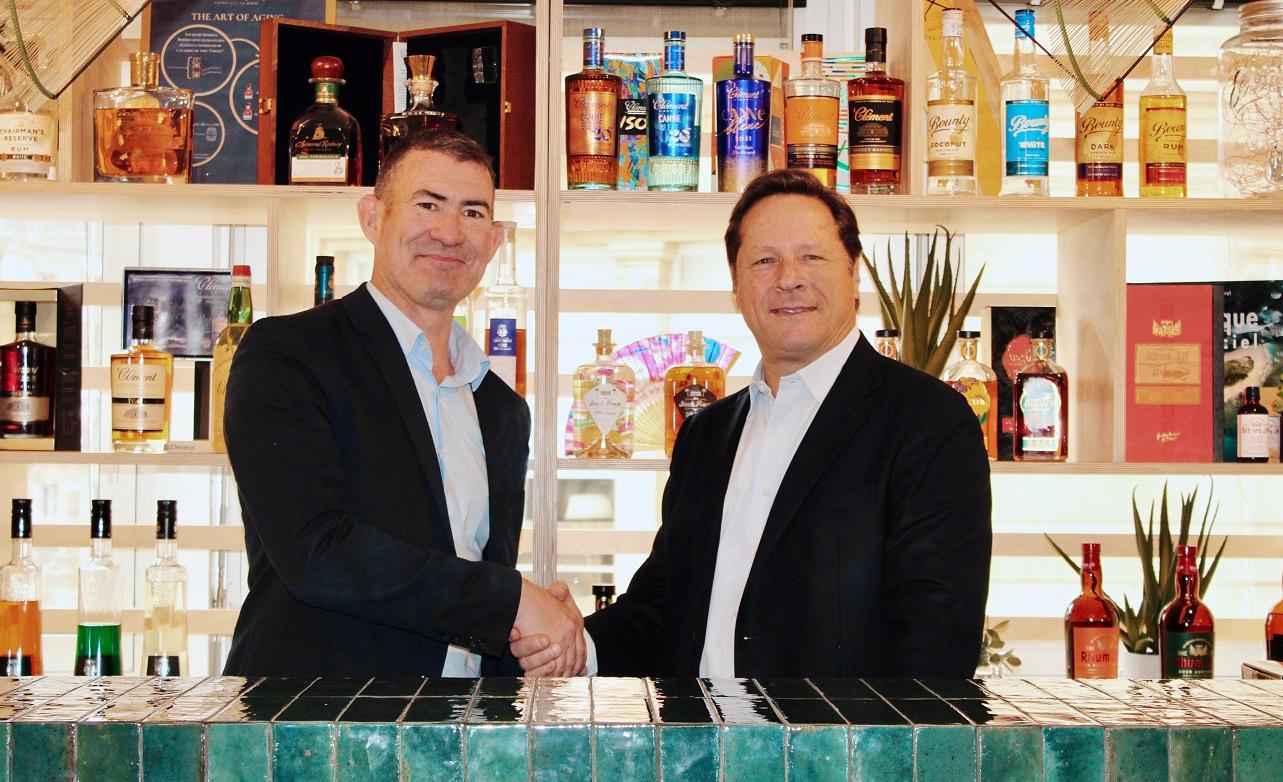

Nick Gillett, Co-Founder and current Managing Director of Mangrove, remains at the helm of the company and will lead the distribution of all GBH rum brands for the UK. John Coe, majority shareholder and co-founder of Mangrove in 2006, leaves the business to focus on his other business interests after a remarkable career in the spirits industry.
Prior to opening, Dalata will invest in excess of £2m to enhance the property, which has expected stabilised annual earnings of £4m. It will be Dalata’s first Maldron hotel in London, its 18th in the UK, and will create more than 50 jobs.
Under the transaction, Dalata has purchased the entire issued share capital of Tide Developments Limited (TD4) for £44.3m from Furadino Holdings Limited. TD4 has a gross asset value of £45.1m and owns the freehold interest of the hotel property. The total consideration will be financed from Dalata’s existing cash and banking facilities.
“I WAS DELIGHTED TO LEAD THE OSBORNE CLARKE TEAM AS WE ADVISED DALATA ON ITS LATEST TRANSACTION. WITH EXCELLENT SUSTAINABILITY CREDENTIALS AND THE PROVISION OF OVER 50 JOBS, THIS ACQUISITION IS A FURTHER STAGE IN DALATA’S STRATEGIC UK GROWTH PLAN AS IT FURTHER EXPANDS ITS REACH.”
NICK SIMPSON – REAL ESTATE PARTNER, OSBORNE CLARKE
DEAL VALUE: UNDISCLOSED
Craven Street Wealth has successfully acquired London-based Bernard Barrett Associates Ltd. This follows the successful integration of Tarvos Wealth Ltd into the ambitious financial planning and wealth management group earlier in February, with this latest acquisition resulting in a group with the expertise of 18 Financial Planners, 11 of which have achieved Chartered Financial Planning status and a total of £1.25bn of assets under management.
All Bernard Barrett Associates staff will remain within the business immediately post-acquisition and continue to operate from a London office. Bernard Barrett will continue employment, over time phasing into a relationship management capacity, whilst Stuart Bates will join the Craven Street Wealth management team.
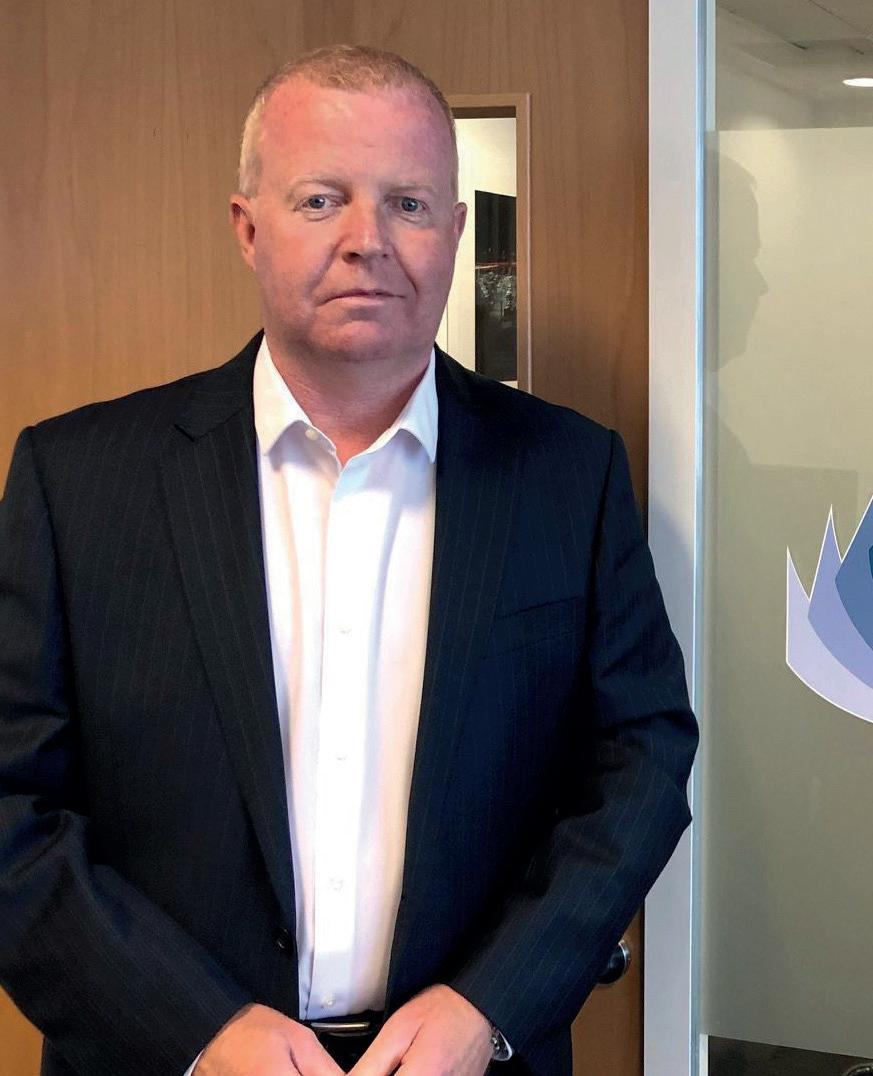
DEAL VALUE: UNDISCLOSED
Paramount Retail Group has recently announced that it has acquired the business of four major online retailers: Fetch, Medic Animal, Pet Supermarket, and Pet Meds, from the Speciality Stores previously owned by Ocado Group.
Generating a combined turnover of over £50m in 2021, the brands join a strong portfolio of companies owned by The Paramount Retail Group. This latest move positions Paramount as a major player in the pet sector.
DEAL VALUE: £30M
European orthodontic provider Impress has announced its exciting acquisition of London-based invisible aligner brand, Diamond Whites, creating the largest UK network of orthodontic clinics and expanding Impress’ offering of oral care, whitening products, and cosmetic dental treatments.

This acquisition will allow Impress and Diamond Whites to combine talent and operations to offer the best orthodontic patient experience across 60 cities in the
UK. In addition, Impress and Diamond Whites will launch cosmetic dental treatments under the supervision of Dr. Richard Marques.
Diamond Whites’ aligner patients will benefit from Impress’s tech-first approach to orthodontists in its flagship clinics across the UK. Impress clinics, orthodontic support and proprietary software will enable Diamond Whites to treat a variety of orthodontic patients, as well as more complex cases.
DEAL VALUE: UNDISCLOSED
RSK, a global provider of sustainable solutions, has announced the acquisition of Richard Irvin FM, a technical facilities management and energy solutions company. With a network of offices across Scotland and the north of England, Richard Irvin FM has a team of 230, including engineers, operations staff, project managers and compliance specialists, and an annual turnover in excess of £25m.
Chief Executive Officer Mark Buchan, who will continue to lead Richard Irvin FM, said: “We are delighted with the acquisition, and we strongly believe that joining RSK will help us move forward as a company, building and strengthening our reputation even further.”
As RSK continues to deliver its ambitious growth strategy, it now comprises more than 175 companies with 11,000 people. The group’s annual turnover at the end of FY22 was £796m. The acquisition adviser was Satvir Bungar of BDO.
Dominic McGregor, Co-Founder of Social Chain and Fearless Adventures, scrutinises the saying “Too Big To Fail” and gives his prognosis of the M&A market.
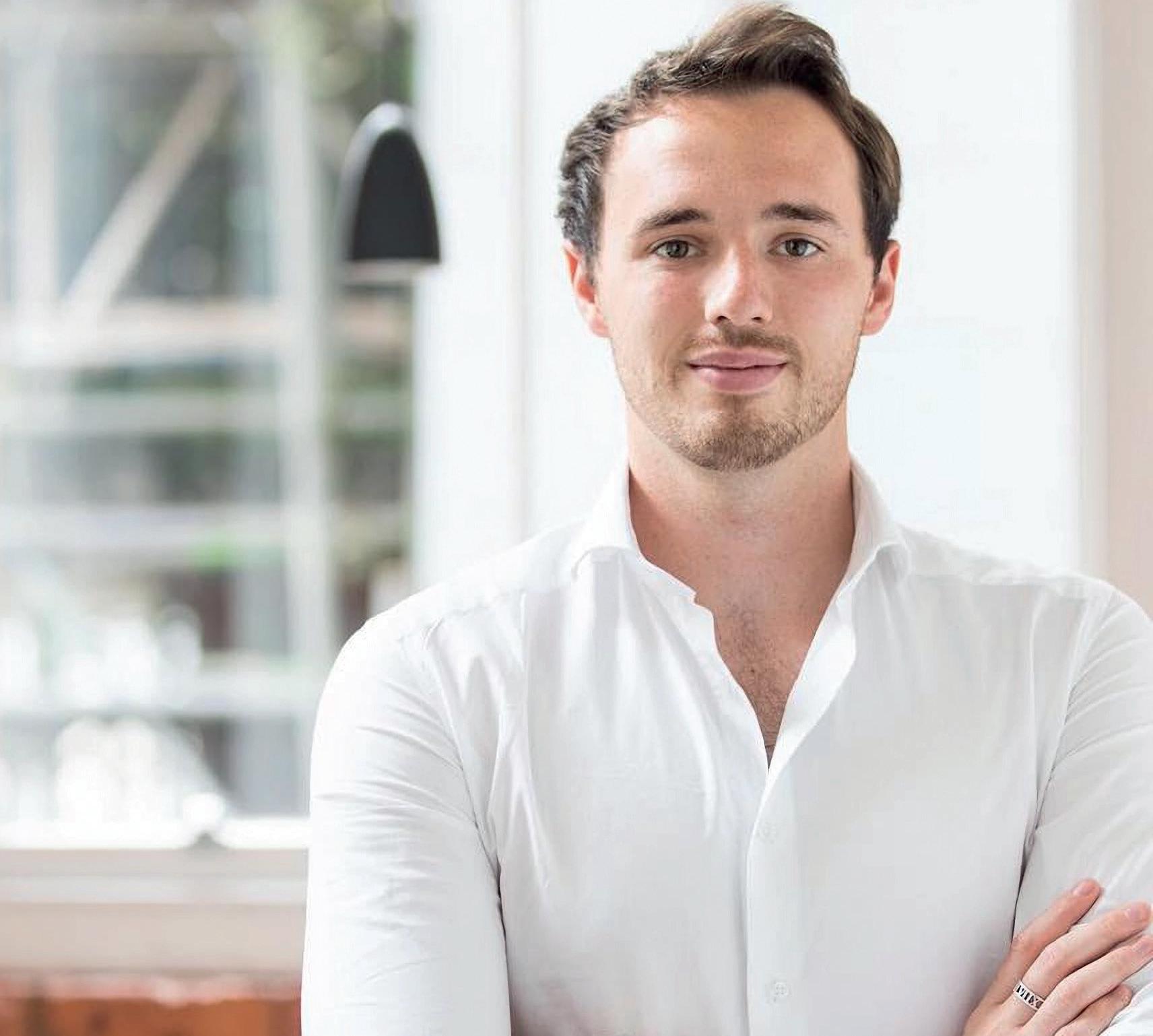
In the last few months the newspapers have been lined with stories of a major banking crisis, which we haven’t seen since 2008. The star of the Tech and VC scene Silicon Valley Bank (SVB) has been rescued by HSBC in the UK for a peppercorn £1.
Credit Suisse one of the major global banking institutes has been snapped up by rival UBS and this feels like just the beginning. There’s a saying in business “Too Big To Fail” which is given to a lot of large corporations that have become part of the establishment and embedded into our everyday lives. In the UK we have a number of these businesses which I would put into this category across a number of major sectors. Everyday household names, like M&S or Natwest.
From my experience in businesses, this statement is very much a myth. As you scale a company and begin to introduce processes, operations and scale you lose the entrepreneurial foundations on which businesses are built on. You introduce a risk that someone may come along and disrupt you. Large businesses are able to pay bigger salaries, and bring in all the experts they can afford but, in my opinion, fail to be able to adapt and move quickly to an ever-changing landscape.
The added complexity of running a large multinational corporation means that these companies are constantly trying to keep up with the pace of small businesses. In a small business, you can literally change the direction of an organisation in days. Bring new products to market in a much quicker way and pivot to the constantly changing demands of the market and consumer habits.

When uncertainty strikes, which we have seen in the last 3 years with a global pandemic, the war in Ukraine and interest rates spikes - smaller companies are best positioned to evolve and create huge value. In the last 18 months, speaking to early-stage founders who are constantly trying to innovate and improve outdated markets there is a huge sense of optimism for their companies. They see how much the world is changing and this presents opportunity.
The rate of change is also constantly increasing and the big boys are needed to play catch up in areas like Tech, Digital Skills, Recruitment and Marketing - all of which smaller early-stage founders realise are their strengths. This leads to the only option for larger companies to acquire the smaller ones - as in the majority of instances their access to capital is their only advantage.
I’m predicting when the markets settle down, we are going to see a flurry of activity in the M&A market of large businesses needed to access and acquire the smaller companies which are disrupting them - my advice to founders who are in these positions is to wait, these bigger companies need you more than you need them and you can continue to build something valuable that you will soon overtake and surpass the household names. Don’t sell too soon, keep building, and keep dreaming because your potential is bigger than even you realise.
Monahans prides itself on being a local firm with international reach. We stay true to our commitment of being a trusted partner to our clients, helping them achieve their ambitions.

The Chancellor’s Budget confirmed UK businesses’ fears that the main rate of UK Corporation Tax would rise from 19% to 25%, with effect from 1st April 2023. However, to soften the blow, a replacement for the super-deduction due to finish this month was announced. This newly proposed ’full-expensing’ regime will allow businesses to write off up to 100% of qualifying plant and machinery investments.
In a period where many businesses are experiencing financial turbulence due to inflation and a particularly tight labour market, this will be a welcome measure. Having said that, the detail of the measure suggests that this relief will operate in a very similar way to the current super-deduction and first year allowances regimes so care should be taken by businesses to fully understand the rules, particularly those surrounding future asset disposals. Although the allowance extension is useful, businesses still face the additional challenge of navigating changes to the way Corporation Tax rates are calculated. Businesses had enjoyed being taxed at a flat rate, regardless of a company’s size, since 2015, giving them sight of current and future liabilities and allowing them to plan cashflow accordingly.
But, from 1st April, companies with taxable total profits of more than £250,000 will face the higher rate of 25%, whereas those earning profits of £50,000 or less will be unaffected – at a rate of 19%. There will be complexities for those in the £50,000-£250,000 bracket, whereby the amount of tax payable by a company will start at 25% but will be reduced (where possible) by a marginal relief factor.
Businesses must also consider their ‘associated’ companies, namely those where there is common control, i.e. one company controls the other or both companies are controlled by the same person(s), in determining their taxable limits. For example, companies within a large corporate group are likely to pay corporation tax at a rate of 25% due to the impact of their related entities, but it is also possible that smaller companies could be subject to a higher rate if the individual shareholders of those companies have other interests.
Understanding where your business stands will be key in navigating the next tax year. If you would like any advice relating to the impact of these changes, please get in touch today.
In November last year, China had its 20th National Congress of the Communist party, which saw Xi Jinping secure a third term as party chief. Spectators looked to Xi’s unprecedented length of rule with an awareness that he has his work cut out.
The International Monetary Fund revealed that Chinese GDP was at a four-decade low last year, while the country continues to suffer from a property crisis and the results of its strict zero-Covid policies, which has impacted its supply chains, manufacturing and ultimately, its superpower status. The world’s second biggest economy isn’t as powerful as it used to be, but exactly how much has China’s superpower status been threatened?
CHINA’S ‘ZERO-COVID’ POLICY
There’s no denying the impact of the war in Ukraine on
global supply chains, especially in the energy sector. Nonetheless, China has an economy ten times the size of Russia, and China’s zero-Covid policies, which saw considerable restrictions and closures in its main cities, may have had a more significant impact on the global economy.
Why is this? China is often referred to as ‘the world’s factory’ because it is responsible for 28.7% of global manufacturing, followed by the US which is responsible for 16.8%. This compares to the UK which is responsible for a modest 1.8% but is still the ninth-highest manufacturing country in the world.
In December 2022, the Chinese government announced it would be loosening its zero-Covid policies, which had been active since the start of the pandemic to decrease the spread of the virus and prevent strain on Chinese
healthcare. Major Chinese cities such as Shanghai – which alone is worth 40% of China’s GDP – came to a halt, and as a result so did its manufacturing and economy.
Oliver Chapman, Founder and CEO of OCI, comments: “The Chinese supply chain will recover, but it may not grow to the extent that seemed likely pre-Covid. In short, the danger to China’s role in the supply chain is not so much that it won’t recover but rather to its growth beyond that. There is now an understanding that supply chains need to be more robust, and over-reliance on any one country is risky.
“This understanding will certainly reduce China’s longterm opportunity with the supply chain. We are, for example, likely to see organisations focus on developing opportunities in the mining and refining of certain metals and minerals, where China is currently vital, in other regions. However, China has emerged as the world’s leading economy in renewables. As the shift to net zero gathers momentum, China’s expertise in renewables and battery technology is likely to be in high demand.”
China exports a third of the world’s intermediate goods, explaining why its zero-Covid policies had such an extreme impact on international trade and its own economy.
At the end of last year, Foxconn’s iPhone factory in Zhengzhou was shut down, which reportedly cost Apple a third of its Christmas sales.
Logistics and transport companies have also been impacted as a result of zero-Covid. At the end of 2022, rail and road shipments from China had dropped by 36%. Major car manufacturers, such as Honda and Volkswagen, stopped production at their factories and experts have claimed that this will have a long-lasting impact for many major tech and car manufacturers, such as Apple and Tesla.
As a result, many companies who have historically relied on China for manufacturing are moving production to, or seeking parts from, other countries boasting cheap labour, such as India and Vietnam. Ultimately, industries have realised that they needed to diversify their supply chains without only relying on China. With multinational companies moving out of China, investment has followed. Zero-Covid policies have also led to a significant drop in foreign direct investment. Companies and investors became less concerned about making money in China and more focused on getting their money out of the country before it was too late.
As a result, economists have raised concerns that movement of manufacturing and investment to other countries could have serious consequences for inflation and the global economy. This is because it’s not guaranteed that other countries where manufacturing is being moved will be able to match China’s low costs. Therefore, having an impact on consumer prices. Cont.
“AS THE SHIFT TO NET ZERO GATHERS MOMENTUM, CHINA’S EXPERTISE IN RENEWABLES AND BATTERY TECHNOLOGY IS LIKELY TO BE IN HIGH DEMAND.”
Oliver Chapman
Christopher Tang, UCLA professor in Global Supply Chain Management, comments: “As multinational firms’ operations in China suffered from a significant drop in consumer demand, many firms either scaled back their operations in the country immediately and others plan to reduce their investments. When both supply and demand came to a halt, China experienced a slow growth rate of 3% in 2022.
“Besides the anaemic growth rate of 2.24% in 2020 during the first year of the pandemic, this 3% growth rate was unprecedented since its economic reform in 1978. And youth unemployment in China has surged to nearly 20% in 2022. The economic decline has pushed back the forecast for China to overtake the US as the world’s largest economy from 2030 to 2035.”
TAIWAN
Geopolitical tensions have forever impacted power dynamics on the world stage. In 2019, Xi Jinping claimed that the unification of China and Taiwan was ‘inevitable’ and has since performed a variety of threatening military acts. Many countries, including the US, have shown support for Taiwan – but what impact does this have on China’s superpower status?
Chapman comments: “China’s position with Taiwan is complex. Its Government has created much political capital among its population with its anti-Taiwanese rhetoric. This political capital was especially important at a time when there was popular disquiet with the Chinese government’s Covid policies. The economic risk to China with its political stance on Taiwan lies partially in the danger of economic sanctions.
“It may seek to reduce its vulnerabilities to sanctions via closer ties with countries such as Russia and Iran. It may also seek closer trade links with India, although this is problematic thanks to border disputes.
But perhaps a bigger short-term risk than actual sanctions is that trading partners may see sanctions as a possibility. Organisations concerned over the possibility of future sanctions may therefore take steps to reduce the reliance on China in the supply chain; this is the biggest short-term risk to resulting from China’s policies regarding Taiwan.”
Indeed, interference in Taiwan could cause another situation where businesses lose confidence in the Chinese economy, while geopolitical tensions and a divide with ‘the West’ may dampen Chinese influence globally.
Jonathan
Sullivan,China
Specialistand Political Scientist at The University of Nottingham, comments: “China’s equivocal stance on Ukraine and belligerence in the Taiwan Strait have accelerated the sharpening of a global divide between the western democracies and China and its sphere of influence. China and ‘the West’ are still interdependent and are not on a collision
“THE ECONOMIC DECLINE HAS PUSHED BACK THE FORECAST FOR CHINA TO OVERTAKE THE US AS THE WORLD’S LARGEST ECONOMY FROM 2030 TO 2035.”
Christopher Tang
course nor ‘decoupling’, but the differences between them are becoming much clearer. The major critique of China is that it is not a ‘responsible stakeholder’ or committed to upholding the ‘rules based international order’. China’s rebuttal is that it does not interfere in other countries’ sovereign affairs and has a legitimate right to defend its own core interests.
“For ‘the West’, China’s stance is a problem. For the rest of the world, not so much. But what it means is that China can expect less of a ‘free ride’ from the West, and a more complicated economic, diplomatic and strategic environment. And other rising powers like India may benefit. But China’s trajectory is towards ‘superpower’ in numerous sectors, and this will continue, even as the US and others try to limit China’s access to the most advanced semiconductors.”
Tang highlights the impact these tensions have on the power dynamic between China and the US in particular. He comments: “From President Xi’s perspective, reunification with Taiwan is only a matter of when. Pursuing unification with Taiwan has intensified the political tension between China and the United States.
“At the same time, the United States is trying to become less dependent on China, but this attempt appears to be working on the surface. Beneath the surface, global supply chains continue to be intertwined and China continues to play an important role. In December of 2022, outbound shipments from China to the United States shrank 19.5% in December, while those to the EU fell 17.5%. However, China’s trade with ASEAN grew by 15% in 2022, and most of these imports are destined for exports to the US via transshipment.
“The hidden issue is that the direct shipments from China to the US may be declining, but indirect shipments from China through various ASEAN (Association of Southeast Asian Nations) members, such as Vietnam and Indonesia, are on the rise. Ultimately, as China continues to dominate in producing components for electronic parts, solar panels, and lithium batteries, the world cannot decouple from China in the foreseeable future.”
‘The rise of China’ has long been the narrative when speaking about the global economy. But amid concerns about China’s economy since the pandemic, many spectators are pointing to its neighbour as a potential new global superpower. India is now considered a strong
emerging market, and towards the end of last year surpassed the UK, becoming the world’s fifth-largest economy.
Chapman comments: “India’s population is now overtaking China’s, and whilst the Chinese population is likely to fall, in India it is likely to rise. Demographic factors alone may be enough reason for the Indian economy to overtake the Chinese economy eventually. Supply-side adjustment to reduce reliance on China is also likely to benefit India. However, at the moment, India’s GDP is less than a fifth of China’s. The Indian economy may well become larger than China’s eventually, but it will have to grow massively for this to happen. How long might it take for India to overtake China and maybe even the US? If this happens, it is unlikely to occur until the end of the next decade and, more likely, not until the decade after that.”
“China’s position as ‘superpower’ in numerous economic and other sectors can certainly bear a couple of lean growth years, although the latter has also revealed weaknesses in the Chinese domestic economy, for which there is no quick fix. Notably, the level of local government debt and the overleveraging of real estate developers. Since so much of Chinese GDP –and middle-class wealth – is accounted for by real estate, the sector’s struggling developers will not be allowed to fail, but the problems of the last few years reveal that this crucial sector is quite shaky.
“In other ways, China’s ‘superpower’ status is pretty solid. It has accelerated slowdown in aid and loans, which will affect the BRI and broader global engagement, but I think that may actually benefit a longer term and more sustainable strategic engagement, e.g., in Africa. In short, China as a prominent global player is not going anywhere, certainly not in the developing world anyway.”
Tang comments: “China will continue to be a global superpower along with India in the future. Because these two countries were the world’s biggest economies from the 1st century until the 18th century, both countries have a strong desire to regain their roles in the world stage.
“While India has the support from the United States as President Biden launched the IndoPacific Economic Framework for Prosperity (IPEF) with a dozen initial partners including India in 2022, China has led the effort to establish the Regional Comprehensive Economic Partnership (RCEP) free trade agreement with 15 signatories in 2020.
“It is interesting to note that many ASEAN countries are members of both initiatives who will benefit from the geopolitical tension between the US and China. India may be leading in software development, but China has the prowess in developing both hardware and software, and there is no country in the world that can replace China as the factory of the world anytime soon.”
Sullivan feels China’s superpower status can’t be easily shaken. He comments: “The Chinese economy obviously took a significant hit due to the restrictions, but paradoxically it demonstrated just how embedded and important China is to the global economy. And I don’t think that will change, even as the US and China both begin to step up policies designed to reduce dependence on each other.
Geopolitical tensions, China’s zero-Covid policies, and a growing awareness of the need to diversify supply chains have all resulted in China’s superpower status coming under threat. Despite this, experts point to the fact that the world’s dependence on China, for manufacturing in particular, runs deep and won’t be easily endangered. Eyes will be on ‘the world’s factory’ over the next few years as tensions in Taiwan and China’s real estate crisis intensify. Whether China has lost its superpower status is yet to be determined.
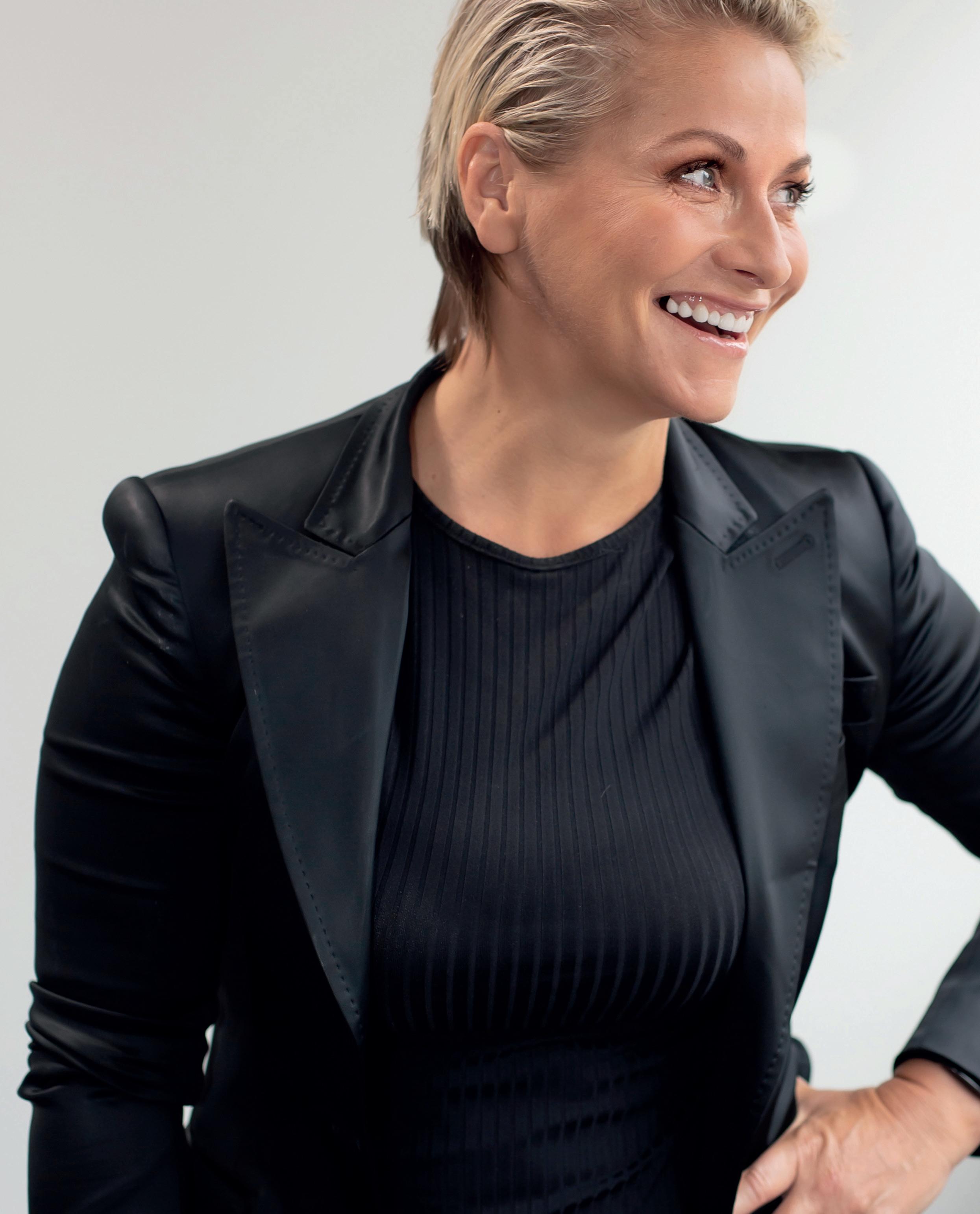
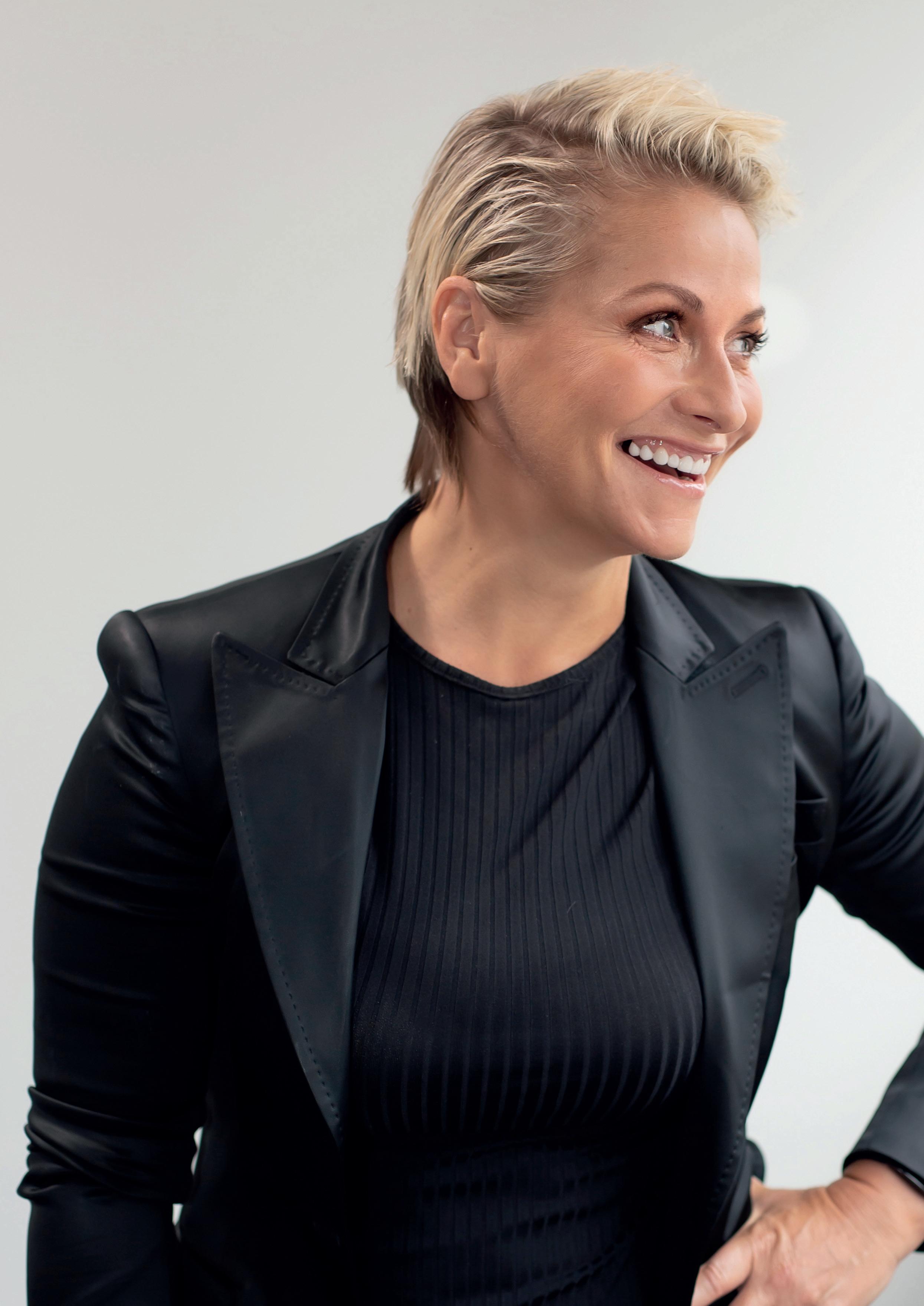
It’s safe to say that firing yourself is a rather unique experience in business. But this is an entrepreneur that has made a career of challenging the norm and thinking differently. Whether it’s taking on the male-dominated insurance industry or questioning the culture of high company valuations (AKA “Ponzi schemes”), she’s not afraid to blaze her own trail.

With refreshing honesty and unwithering self-reflection, in this conversation with Sam White, Founder of Freedom Services Group & Stella Insurance, we cover being “unemployable”, leading teams across the globe, raising funding as a woman, and much more.
COULD
I’d had a job out of university but didn’t really like somebody else telling me what to do. I think I just wanted a bit of freedom. I had this idea that if I started this business, from my sister’s conservatory, I’d be able to choose my own hours, and I’d be able to do a few hours in the day. I was making appointments for other businesses to start with, and then it kind of evolved into this claims management business.
I spent around 10 years building the business that was working with insurance companies, and it built that up to a significant size and scale. We were turning over around £18m and it was very profitable. I got very big for my boots and moved to Beverly Hills. I had a lot of fun over there, like having Robbie Williams sing at my wedding. Then the business hit some challenges in 2010, so I had to scale back a little bit and change direction.

I ended up working much more closely with insurance companies, and then ultimately setting up my own insurance business. Now I have three businesses in the UK, all around the motor

insurance space. I launched Stella in Australia two years ago, which is a brand that is focused on designing financial services products around women. I’ve had lots of fun, got involved in lots of different things and been able to really feed into my desire for joy and adventure. I always say business shouldn’t just be about business. If it is, you’re doing something wrong.
I say it jokingly, and actually, I’m hoping with the change in psychology around businesses that people like me do become more employable. What I mean is, when I took my first job, it was very much in a command-and-control type business environment, where somebody at the top has an idea about the way that things should be done. They tell the staff, it has to be done this way, with this process, and there’s no deviations. Now for somebody like me, that’s hellish.
I like to find my own path and feel my way through things. One of the things that I’ve strived really hard for in my own leadership journey is to get past this idea that just because people work for you doesn’t mean that you are the giver of all knowledge and instruction. You should be creating environments in which people can test and learn, and grow themselves, so they can feel that joy of creating something and building something, as well.
On a personal basis, I’ve always been a big fan of therapy. In a working environment, I’ve always been interested in coaching, and I started working with a coach a few years ago, just to shine the light in the dark corners that I can’t see. What am I missing in terms of my leadership style? This coaching worked so well that I wanted to get the coach involved with the team. They started working on a one-to-one basis, and I saw some real improvements from a team viewpoint. But then I started to challenge this whole concept of a CEO. It feels intuitively wrong to me. The minute you put that structure in where there’s one person above that team, what you do is diminish accountability and empowerment because then there’s a natural tendency to defer to this ultimate leader. When I looked back on some of the challenges that we’d had as a business, it was because I wasn’t actually relinquishing that responsibility to the team.
I speak to a lot of business owners who say the same thing, like “why do I have to come in and fix the problems?” You’re always creating that dynamic yourself. You’re creating that rescue kind of scenario where you lead them for a period, something goes wrong, and then you’re having to dive in and save it, which is really kind of dysfunctional.
I started to toy with the idea of removing myself and replacing the role with a coach role for the team. I really do believe that businesses would function better with a management team that was being coached by someone more appropriate. So, I fired myself and replaced myself with the psychologist that was coaching me and the team. The theory absolutely does stand, as they’ve had a great year and done really well. We’re still experimenting with different elements to the structure, but I am cautiously optimistic about it as a general business philosophy.
DID YOU FIND THAT LEADING TEAMS IN THE US AND AUSTRALIA WAS DIFFERENT TO ONES IN THE UK, AND IF SO, HOW DID YOU ADAPT YOUR LEADERSHIP STYLE?
I think there’s always cultural differences. I definitely had some barriers when I set up in California. For instance, Californians have a very different sense of humour to a northern one. There was a couple of times where I mortally offended the locals with what I thought was just a bit of dark English humour, and they thought it was a sign of a serious psychological issue.
You do hit those kinds of cultural boundaries, but there’s also different rules of the game. So, if you’re raising money in the States, they raise money in a different way to the UK. When I first went over to the States, I was very naive, and just a bit overly enthusiastic and not as well planned as I could have been. Whereas when I set up in Australia, I think I went into it a little bit older, a little bit wiser. Culturally, I find myself much more aligned with the Aussies, and I really enjoy doing business there.
I think finding a place that feels the most aligned to you is really important. So, if I was incredibly process-driven, and left-brain focused, I might love doing business in Germany. However, I think I probably would struggle doing business in Germany because it doesn’t really fit with my personality. So, as an entrepreneur, it is also important to align that stuff. If it doesn’t feel right for you, and there isn’t that fundamental connection for you, then you probably shouldn’t be doing it.
I had a pretty torrid time trying to raise money from the start. Statistically, it is much harder to raise money as a woman than as a man. I really struggled with it probably because when I was approaching banks, they were not seeing what they were expecting to see. Now, it’s ironic, because I grew all of my businesses from scratch, and most of them ended up profitable with multimillion-pound turnovers. But I couldn’t get any funding. I actually got my dad to pretend he was part of the business at one point, just so I could get an overdraft. As the business developed over time, I learned how to leverage what we had. So, I would go to larger partners and do projects with them, where they would put up the funding and I would get the deliverables for them. That’s how we managed to kind of move forward.
Stella was the first time that I really got proper investment in my whole career. The first VC I met with in Australia was like, “I love it. I love what you’re doing and I’m going get behind you.” It’s been absolutely fantastic.
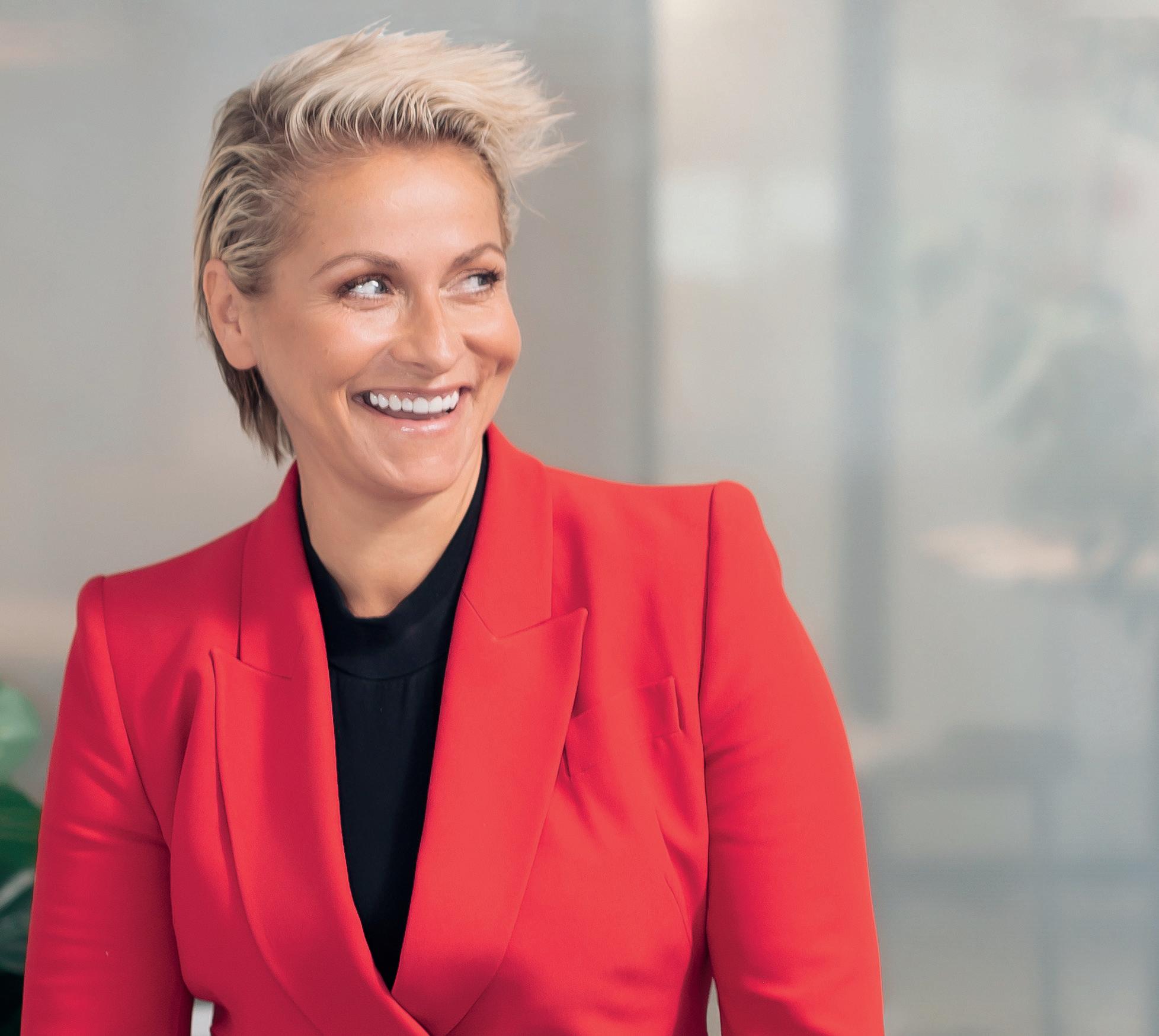
“IN A WORKING ENVIRONMENT, I’VE ALWAYS BEEN INTERESTED IN COACHING, AND I STARTED WORKING WITH A COACH A FEW YEARS AGO, JUST TO SHINE THE LIGHT IN THE DARK CORNERS THAT I CAN’T SEE.”
They’ve been very supportive, and they get where we’re going with it. I’m now on a fundraise, again, because we’ve got global expansion plans for Stella, and I’m hoping that my experience of the whole thing is different to what it’s been in the past.
care. My general experience of people is that they’re far too obsessed with their own stuff to really give a damn whether you made a success out of that thing or not.
I saw something this morning that said, “don’t accept criticism from somebody that you wouldn’t go to for advice.” I think that that’s a great statement, and it’s the same thing with failures. Somebody that’s going to revel in you having a bit of a hard time is unlikely to be somebody that you want to engage with on a general basis. If you remove the fear of what other people think, what you’re left with is just a growth experience.
WHAT ARE YOUR THOUGHTS ON THE TREND OF COMPANIES RAISING A LOT OF MONEY, WITH WILD VALUATIONS, BEFORE EVEN TURNING A PROFIT?
That is how business exists. I was chatting to this investor, and he was saying, “I’m not really concerned with all of that. What I need to know is that in the second round of fundraising, there’s going to be an increase in value”.
So, it doesn’t necessarily have to be linked to any trading, it just has to be that the story is now more powerful than it was to start with. We see this played out to an extreme example with things like WeWork, where the story gets more and more fantastical, increasing that value more and more. I find that fascinating and highly disturbing at the same time because this imaginary valuation of this imaginary unicorn (and we even use the word unicorn!) is actually being given a lot of resources and, as a result of this valuation, that enables people to have these giant super yachts whilst we’ve got cost-ofliving crisis and people really struggling.
DO WE
I love a good failure. When we go back to neuroplasticity, you cannot make change without suffering failure. I think most people are overly concerned about what other people think, and actually, other people don’t
Having not raised money before and trying to understand the way that the game is played, I was recommended a few investor books. This is a bit tongue in cheek, but I read them, stepped back from it, and I was like, “oh, so it’s a giant Ponzi scheme”. If you’ve bootstrapped your business, you can’t spend a pound until you’ve made a pound, so everything about the business is “how do I get it into profit with cash in the bank?”
WHAT MAKES A GREAT BUSINESS LEADER?
I think that the best trait for a business leader is self-reflection. Also, being able to appreciate the things that you, perhaps, haven’t got quite right and make some changes to move forward.

“STELLA WAS THE FIRST TIME THAT I REALLY GOT PROPER INVESTMENT IN MY WHOLE CAREER. THE FIRST VC I MET WITH IN AUSTRALIA WAS LIKE, “I LOVE IT. I LOVE WHAT YOU’RE DOING AND I’M GOING GET BEHIND YOU.”
As London continues to outperform every other region in the UK, do you think levelling up has been exposed as a gimmick? YES


13% NO OTHER
74% 13%
First announced by Boris Johnson’s government in November 2020, the Levelling Up Fund (LUF) is part of the wider “levelling up” agenda, which is designed to address the economic disparities between different areas in the UK. More than two years on and two funding rounds worth £3.8bn have been announced from the £4.8bn fund. But how much of it has gone to “levelling up” the UK’s most deprived areas? We investigated whether the government’s plan is currently carrying out its explicit purpose or whether it was clever political rhetoric.
As mentioned above, so far there have been two funding rounds for the Levelling Up Fund. The first round, the results of which were announced in October 2021, saw £1.7bn awarded to 105 projects. Results for the second round were announced on 19 January 2023, and saw £2.1bn awarded to 111 projects, bringing the total to £3.8bn awarded to 216 projects.

However, across the two funding rounds, there are striking disparities between where funding is being awarded. For example, the North West has received £586m from 27 successful bids, which is 13% of the total funding, whilst the North East has received £209m from 11 successful bids, just 5% of the total amount awarded. Interestingly, London, which accounts for approximately a quarter of UK GDP and is home to some of the UK’s wealthiest areas, has not been one of the fund’s main beneficiaries either.
James Forrester, Managing Director of Stripe Property Group, comments: “London is actually one of the regions to have benefited the least from the Levelling Up Fund, with the 14 successful bids seen across the capital accounting for just 6% of total awards granted.
“Just the East of England and North East have seen a lower number of successful bids, whilst the North East and Northern Ireland are the only areas to have seen a lower level of investment when compared to the £216m granted to London projects.”

At face value, the funding being allocated to London and the North West could be used to suggest the LUF is, to some extent, going where it’s needed. Of course, the lack of funding being allocated to the North East, which is one of the UK’s poorest regions, is contrary to that point.
According to a Bloomberg data analysis, more than three in four constituencies that were already behind London and the South East in 2019 have fared worse on relevant socioeconomic metrics since then, with many of these areas being in the North of England and the Midlands. So, even though London has received a relatively low proportion of the Levelling Up Fund, it seems the fund needs to go much further to address regional inequalities.
However, Simon Danczuk, former MP, and former Member of the Communities and Local Government Select Committee, said: “All the mainstream political parties should stop pandering to this notion that London gets more than its fair share of funding from central government.
“People should recognise that London isn’t just the capital, it’s a major international city, on a par with just a handful of other such cities across the world. Of course, London is always going to perform better than Manchester or Newcastle, that is inevitable. London drives our whole economy because it services much of the world’s commercial activity, this is why we need to prioritise it in terms of government support.”
designated as priority 1 are not actually those in most need of “levelling up”, and a more reliable criteria for determining where funding is needed most is required.
To continue to examine the effectiveness of the Levelling Up Fund, it’s also essential to consider whether the level of funding provided to local authorities has increased in the years since it was announced.
According to the Institute for Government, in 2020, the amount of money spent by the government per head was the highest in London, with £10,835 being spent per person. However, the region with the lowest spending per head was the East Midlands, with £8,879 spent per person.
When compared to the Levelling Up Fund, across its two funding rounds, London has received the lowest level of funding per head, at £24. The East Midlands, however, received the fourth-highest overall funding per head, with £78, which suggests the Levelling Up Fund is somewhat addressing the disproportionate amount of public spending per head on a regional level. However, as London is home to some of the UK’s most deprived areas, this does not necessarily indicate funding is going to the areas in most need of levelling up.
Looking at the Levelling Up Fund on a regional level does not tell the full picture and the reality is that a more nuanced approach is needed to determine whether funding is going where it’s most needed.
During the March 2021 Budget, the government provided a prospectus for local authorities looking to make a bid to the Levelling Up Fund. This stated that funding would focus on the areas “most in need of levelling up” and introduced a system ranking local authorities on a scale of 1 to 3, with those ranked 1 considered most in need.
Across both rounds, 121 of 216 awards were made to priority 1 areas. These awards had a combined value of £2.2bn, 59% of all funding awarded. The North West and Wales had the highest number of successful category 1 bids, with 20 each, while London and the South West had the lowest number of successful category 1 bids, with five each.
With 59% of all funding being awarded to priority 1 areas, most of the funding at least appears to be going to the areas that have been designated as needing it the most. However, according to Forrester, a recent study found that 61 of the top 100 most deprived areas in the UK have been completely ignored by the Levelling Up Fund.
He continues: “While London has received very little in terms of total investment, no less than two London boroughs feature in the top 10 areas that are considered the most deprived and received no LUF funding at all. This is quite remarkable and again demonstrates that this funding isn’t being focused in the areas it should be.”
So, with the UK’s most deprived areas appearing to be ignored by the fund, perhaps the issue is the areas being
The government has confirmed there will be a third round of the Levelling Up Fund, so is it the future of the economy or is it just a political catchphrase?
Andy Street, the Conservative Mayor of the West Midlands, has criticised the fund’s current bidding process and the “centralised system” of allocating funding, arguing the process should be “devolved for local decision makers to decide on what’s best for their areas.”
Danczuk, however, believes the current system is fine but thinks we should scrap the Levelling Up Fund. He comments: “We are a relatively small country geographically, and there is no real evidence that devolving more decisions to a very local level will help achieve very much. The governing structures we already have in place are more or less okay for running and prioritising services.
“Politicians like Andy Burnham, the Mayor of Manchester, should stop creating an ‘us and them’ divide between the North and London, and should start cooperating more with central Government. Initiatives like the Levelling Up Fund should be scrapped and allocations of money from Whitehall shouldn’t be based on competitions but should be based on need to achieve economic success for the country as a whole.
“All the major politicians pay far too much attention to trying to level the economy across the UK, when the reality is that London will always be our major economic driver. They should just accept that and celebrate it.”
Forrester believes that the fund is not working.
He concludes: “It’s not just London that has suffered from this lopsided approach to levelling up. The North West has seen the largest level of investment made, while the North East has seen the lowest. So, all things considered, it’s fair to say that the Levelling Up Fund has amounted to nothing more than electioneering and will do little to rebalance the books on a national scale.”
is a key programme delivered by GC Business Growth Hub. Commissioned by the Greater Manchester Combined Authority and funded by the European Social Fund, this programme plays a crucial role, helping thousands of SMEs in Greater Manchester to find suitable training and fill occupational skills gaps.

Today, we’re turning the spotlight on the programme manager, Janine Richardson, to share why upskilling your workforce is the best thing you can do for your business.
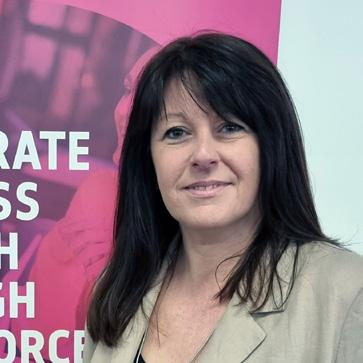
“Your employees are one of your greatest assets, they are working to support you to achieve your business goals. It’s important to keep your workforce engaged, dedicated and invested in, one of the best ways of doing this is by offering them the opportunity to upskill and develop through training.
With the cost-of-living crisis and workforce recruitment challenges, training opportunities can be a benefit that will drive workforce retention, support with succession planning and help make employees more adaptable to change. That’s where Skills for Growth – SME Support comes in.”
KEY
Number of Businesses engaged >7,000
Hours of Support delivered >20,000
No. of Employees Supported > 9,500
Skills for Growth – SME Support helps businesses to identify key skills gaps and provide training options that will increase productivity, grow their talent pool and help in the challenge of retaining staff and reducing turnover.
The support offered by Skills for Growth – SME Support is fully funded, but often the training identified can be fully funded (to date 81% of the referrals made from the programme have been to fully funded training provision), meaning that businesses get a raft of information, advice and training with no valuable funds leaving their bank accounts!
There’s 40 in our team and we are growing, with expertise from different sectors and backgrounds. I am very privileged to have an amazing team to work with who have a wide range of talents and are super enthusiastic and committed to supporting SME’s, all of us have a clear vision on how we can help SMEs to grow. We have weekly team meetings to share updates and bi-monthly skills bootcamps that focus on developing our own skills and knowledge, putting ourselves so we live and breathe what we promote to our clients! I’m so proud of my team, they work hard to make a positive impact, go beyond our client’s expectations, and contribute greatly towards the Greater Manchester economy. When we all have the same belief, we can achieve anything together.
Most business leaders are busy with the daily running of their business, with many often spinning various plates from managing finance, product development, client acquisition, building management, marketing and competitor analysis. From my
experience, business leaders see the value of investing in their people and developing skills. However, the other areas take up their time and focus, so training and development can often fall by the wayside. This is where SfG – SME Support comes into its own, and we can save time and bring the expertise that business owners often do not have. We provide a dedicated Skills Coach for up to 26 weeks to identify the right skills training for the employees to match the goals and needs of the business. Our bitesize ‘E’ learning platform has been hugely popular as it offers accessible, flexible training for soft skills, including over 1,500 pieces of training, resources and blogs, including modules on areas such as IT & Excel and project management skills.
‘What’s the catch?’ Absolutely nothing. The only thing that we need you to do is to invest a little bit of your time in registering, and then we will take it from there. If you are based in Greater Manchester, contact us today!
The next General Election result could be extremely close, and the Conservatives might just win it, but not necessarily for the reasons you might think.




First, there will be boundary changes. The Boundary Commission for England and other parts of the UK are redrawing parliamentary seats so that they all contain between 69,724 and 77,062 voters, to ensure fair representation.

This means fewer seats in Scotland and Wales, traditional Labour (or Scottish Nationalist) heartlands. Whilst Labour gain from new seats created in Greater London, it isn’t enough to compete with new seats created in the South East, which would likely go to the Conservatives. One estimate gives the Conservatives an additional five seats.
Then there’s the way we vote. From this May, anyone going to vote will need to present photo identification, primarily aimed at stopping impersonation, something that does occur in some areas.
This added requirement is likely to adversely affect Labour’s vote. It can be argued
that Labour voters are less likely to have a required form of ID, or are less likely to prioritise it on election day. Any political campaigner will tell you how hard it is to get some people to vote, never mind having to get them to rummage round for their passport or driving licence before stepping out the door.
Incumbency is also a factor. It’s estimated an MP’s personal vote is worth a few hundred votes in any constituency. With the Conservatives having performed well at the last General Election, hardworking MPs might just have a little more chance of hanging on to their seats.
With Kier Starmer having banned his old friend Jeremy Corbyn from standing as a Labour candidate, the far-left former leader might well go off and set up his own party. Whilst such a party would struggle to win any parliamentary seats, it could frustrate results by taking some Labour votes away, and letting Conservative candidates hang on.
Conversely, the Reform UK Party, led by Richard Tice, is polling at around 10%. If this right-wing populist political party stands in every parliamentary seat, they will likely take votes from the Conservatives, letting a Labour or Liberal Democrat candidate win. All these factors will play a critical role at the next General Election, seats can be won and lost on just a couple of hundred votes. But there are other key factors which will determine the outcome for most MPs. Whilst the public often say they don’t like negative campaigning; the reality is that they respond very well to it.
Over the next few months people’s perception of Kier Starmer will become clearer. They will be reminded time and again that he was close friends with Corbyn, that he’s in the pocket of the trade unions, that he struggles to define what a woman is,
that he took the knee in his office for Black Lives Matter, that his party is close to the eco-protestors, that he wanted to take us back into the EU, and that he’s soft on illegal immigration.
It’s much harder to attack Rishi Sunak. He came out of Partygate relatively unscathed. Whilst he and his family are tremendously wealthy, the public don’t generally like successful people being denigrated, and he has quite a clean political record. Plus, Sunak is seen as having delivered during his time as Chancellor, and now, as Prime Minister. In contrast, Starmer has no track record of governing and is seen as a technocrat who used to run the Crown Prosecution Service.
come out and vote. The Conservatives are less good at this, though they’ve become extremely impressive at using social media, particularly Facebook, to target local residents and persuade them to vote for their local candidate, or at the very least not turn out and vote Labour.
The most important factor in the run up to the General Election will be the policies and vision that the main parties offer.
Neither Sunak nor Starmer have yet provided a strong vision for our country. Sunak made his five pledges in January – halving inflation, growing the economy, reducing national debt, cutting NHS waiting lists, passing new laws to stop small boat crossings – but they hardly translate into a vision.
Starmer has been exceptionally vague with his ‘5 missions for a better Britain: secure the highest sustained growth in the G7; make Britain a clean energy superpower; build an NHS fit for the future; make Britain’s streets safe; and break down the barriers to opportunity at every stage.’ But what do some of those actually mean?
Another key factor is the campaigns that the main political parties run. Labour are notorious for being excellent on the ground operations. They identify their voters all year round and are good at getting them to
One suspects that by the end of 2023, Sunak will be able to show that he’s delivered all five of his promises and will then set out a grander plan for 2024, an offering which will appeal to the public. Starmer will try to do something similar, but has the added hinderance of not being able to show that he’s already delivered.
With every single vote up for grabs, subtle changes to the voting system, and negative campaigning reaching a crescendo, the British public might just stick with the Conservatives, and not gamble on Labour.

“ANY POLITICAL CAMPAIGNER WILL TELL YOU HOW HARD IT IS TO GET SOME PEOPLE TO VOTE, NEVER MIND HAVING TO GET THEM TO RUMMAGE ROUND FOR THEIR PASSPORT OR DRIVING LICENCE BEFORE STEPPING OUT THE DOOR.”
In 2022, more than two-thirds of UK companies moved their research and development (R&D) activity abroad. R&D is an important driver of innovation for businesses and failing to create an environment where R&D can thrive can have significant consequences for the economy. So, why are so many carrying out their research and development elsewhere, and what can the UK do to become a more attractive destination for innovation? In this article, we take a closer look.
According to research published in Ayming UK’s inaugural UK Innovation Barometer, 69% of businesses have moved R&D activity abroad in 2022 and 70% are planning to move activity abroad this year. We spoke to Mark Smith, who is a Partner at the business performance consultancy Ayming UK, and he unpacked the report to tell us why he believes so many are moving abroad.
He says: “Our report pointed to a number of concerning factors as to why UK businesses are moving their R&D activity abroad, with access to talent and funding being key. For example, more favourable R&D tax credit systems abroad are tempting people to offshore markets like Germany, where 25% of in-house research staff’s salaries are credited against the annual tax liability.
“Our exclusion from the EU’s Horizon programme has also had a big impact. UK businesses have lost access to a €95.5bn funding pool and will not be involved in some of the most cutting-edge R&D collaborations in the world, which encourages businesses to set up in Europe.
“To put it simply, the UK just isn’t competing at the very highest level and other markets are creating more favourable and supportive ecosystems for R&D activity.”
With the Horizon programme being limited to countries in the EU, it appears Brexit is partly to blame for the lack of UK-based R&D. Another factor, according to Jenny Tragner, Director and Head of Policy at tax adviser ForrestBrown, is that UK is
competing in global markets where technical skills are becoming scarce. However, Tragner is also critical of the changes that have been made to the UK’s R&D tax relief scheme.
She comments: “According to our research, more than a third of UK businesses think the attractiveness and availability of tax incentives is the most important factor when considering where to locate R&D activity. The UK has long been considered a prime location for R&D, given our world-leading academic research institutions.
“Generous tax incentives for companies to base R&D projects here and commercialise this research have helped to attract and retain innovative businesses, as well as encourage global businesses to invest more of their innovation budget into UK R&D.

“Making R&D tax relief less attractive means companies will inevitably have their heads turned by other, more generous, jurisdictions.”
In Autumn 2021, then Chancellor Rishi Sunak announced several reforms to the UK’s R&D tax relief scheme. Set to come into force on the 1st of April 2023, they include:
• Reducing the additional amount of tax relief profitmaking businesses can claim on qualifying research and development activities from 130% to 86%. The amount businesses can claim will also be impacted by the rise in corporation tax from 19% to 25%, which is set to come in at the same time.
• The amount loss-making companies can claim will also drop from 14.5% of the ‘surrenderable loss’ to 10%.
• However, companies who qualify for the R&D Expenditure Credit scheme (generally those who have more than 500 employees and turnover of more than €100m annually) will be able to claim 20% of their qualifying expenditure, up from 13% currently.

Tragner says it’s changes such as these which contribute to why the UK is currently such an unattractive destination for R&D.
She says: “It’s not solely about the rate of relief. Stability and simplicity are important too. Piecemeal changes which make R&D tax relief more complex to access, and continued uncertainty over the future direction of the incentive are viewed
unfavourably when compared to longstanding, more stable regimes in countries such as France. Despite positive signals from Government, the current direction of travel for R&D tax relief policy is not viewed by business very optimistically.”
With so much R&D being taken away from the UK, it’s important to consider the economic ramifications this could have.
According to a report by the National Institute of Economic and Social Research, titled From ideas to growth, R&D stimulates innovation, which directly impacts on productivity, and has potentially other indirect benefits, as it enhances the diffusion and absorption of technology. The report also says innovation occurs more frequently in firms that are larger, more productive, export intensive, and foreign owned, but it is also important for SMEs, particularly in terms of process innovation. Furthermore, SMEs often lack the resources needed to invest in risky R&D activities, which makes them more reliant on external sources of knowledge and R&D capabilities.
Various academic studies suggest there is a link between innovation and economic growth, so as R&D appears so closely tied to innovation, it seems safe to conclude that R&D has a direct impact on the economy.
But that’s not the only issue caused by the UK’s current lack of R&D. According to Smith, “With 70% of respondents planning to move R&D activity abroad in 2023, the UK’s international reputation as a research hub for innovation is at risk.”

He continues: “Innovation is synonymous with economic progress and competitiveness, so
if we are doing less of it in the UK, it could have a significant long-term impact on the economy.
If UK businesses continue to offshore R&D, we will not only be unable to make Britain the innovation-led economy the Chancellor referenced, but also run the risk of losing both talent and high-value jobs.”
Tragner says there will be a loss of spillover benefits too.
She comments: “Increasingly, R&D has become a global endeavour, particularly in developing software, where teams can collaborate without needing to be physically together. Most of the activity which will in future fall out of the incentive is there to support UK-led R&D projects and teams, allowing UK businesses access to the skills and expertise needed to accelerate R&D programmes and compete globally in cuttingedge sectors.
“When it comes to money spent overseas, the recognised spillover benefits of R&D activity are still very relevant, as it is the UK business which grows and prospers from the R&D. But if businesses instead choose to move management of R&D to overseas locations in future, these benefits will be lost, with knock-on impacts to the UK’s ambition to be a science and technology superpower.”
It’s clear that a lack of UK-based R&D could have significant economic consequences. This raises important questions as to how the UK can make itself a more attractive destination for R&D to be carried out.
Smith says there are some immediate changes we can make to do this.
He comments: “One thing that could really stimulate the right kind of innovation could be expanding the scope of R&D tax incentives, specifically to target sustainable R&D activity. By introducing financial incentives in the form of a supercharged green R&D tax credit, not only can the UK stimulate greater levels of R&D, but it will also enable the country to push forward its green ambitions.
“For domestic innovation, the formal launch of ARIA would go a long way and help to counteract the collaborations and funding lost from the Horizon problem. However, the Government should also introduce more local grant funding similar to the EU’s Recovery Fund and the US’s Inflation Reduction Act.
“The UK’s department reshuffle could also be an important move. However, while a Department for Science, Innovation and Technology is a good idea in principle, the proposed changes are significant so the Government must be careful not to get bogged down by the restructuring.”
According to Stanford Graduate School of Business, in addition to offering tax incentives for businesses, there are four additional policies that can improve innovation:
1. Promote free trade
2. Support skilled migration
3. Train workers in STEM fields
4. Provide direct grants for R&D
Considering the second point, the Centre for European Reform says the introduction of the points-based immigration system post-Brexit has led to a net gain of workers in healthcare, education and ICT, which they consider moreskilled sectors. This suggests Brexit could have contributed to innovation where skilled migration is concerned. However, the study also said Brexit has contributed to an overall worker shortfall of 333,000, meaning total economic output has been reduced. For Tragner, going beyond the rate of R&D tax relief is key.
She concludes: “It is important that innovation incentives in the UK compare favourably with those available across the world. This goes beyond the rate of R&D tax relief to encompass factors such as the clarity, accessibility and stability of the incentive, as well as the wider innovation funding ecosystem of grants and incentives available to companies commercialising their intellectual property.
“The newly formed Department for Science Innovation and Technology presents an opportunity for a clear statement of intent for innovation policy and a modernised definition of R&D, which together would provide a vital foundation on which to build.”
R&D in the UK appears to be at a bit of a crossroads. With the Organisation for Economic Cooperation and Development predicting the country will be the worst-hit of all G7 nations in 2023, any measures to bolster innovation would be well-received. However, the incoming changes to R&D tax relief look set to only hinder it further. Interestingly, the notorious exacerbator of so many of the UK’s issues, Brexit, is not the worst impediment to UK innovation either.




















Learn how to make your marketing budget work harder.

business in an ethical way is what has driven them to success since then.
“I think we have a really strong and powerful story to tell, based on real values rather than box ticking. For example, our ESG work runs right through the business at every level.



“The genuine passion to make a difference is there for everyone to see and shared by everyone working in the business. As a result, we now only work with companies who share our values and want to come on the journey with us, and if they don’t, we don’t want to work with them!
“For example, on the Real Living Wage, we now only pay our cleaning teams the Real Living Wage or higher. If a client wanted to pay less, we would not work with them. We have turned away business and are not afraid to do so. That said, most of those clients we turned away came back to us, either because some of our more respectable competitors have taken a similar approach, or because they went with the cheaper option and it failed.
“We are a people business, and we all know that the workforce has shrunk, so we have to look after our people. That starts with pay, but also extends into other areas such as training, well-being and ensuring we provide decent career opportunities.”
Cleanology’s organic growth has been selffunded through reinvesting profits. Although they secured debt finance in order to fund their acquisition, a decision which Ponniah says has made them very conscious of their reporting and performance responsibilities.
Taking care of its staff has been integral to Cleanology’s success, but who’s been there to help Dominic when dealing with the huge amount of stress and responsibility that rests on a business leader’s shoulders?
Whilst Ponniah has never gone for business coaching, the addition of a non-executive director has been hugely beneficial to the running of the company.
He explains: “I have had a non-exec director in the business since 2016, which has really helped focus my team and bring an independent viewpoint to the boardroom. It can be lonely running a business and most entrepreneurs tend to not want to share their problems with their teams. It has been useful to have someone else to discuss sensitive matters with, especially if it relates directly to your senior team.
“I would strongly recommend every business leader has someone around that they use as a sounding board. I don’t have a business coach as such, although I get approached all
the time by people selling business coaching to me!”
Despite having some non-executive assistance, Cleanology has not been without challenges whilst on its journey of growth. The main challenge being one that many businesses struggle with: having the right people at the right time
“I should have been more ruthless years ago and moved people on who I knew in my heart were not right,” says Ponniah. “If I had, my business could have been double the current size, but it’s easy saying that in hindsight.” However, having a good system of checks and balances has helped them to mitigate any people problems.
Dominic continues: “To scale, you have to delegate and work on the business, not in the business. Again, easier said than done. And you can only delegate if you can trust the people you employ. I have now accepted (after 15+ years!) that people will make mistakes and lose me money. You just can’t be everywhere all the time to control everything, which is why it is so important to have robust systems and a solid framework in place which your team operates within. This way you will minimise any potential losses and have the protection and assurance you need to focus on scalingup, while your team operate the business day-to-day.”
another significant problem for Cleanology, placing “incredible financial pressure on the business”
Ponniah continues: “Clients don’t want an increase above inflation, but the reality is many prices have risen well in excess of inflation. There is wage pressure from our cleaning staff (making up 80% of our total costs). But people often forget the junior and middle management teams who are not on massive salaries also need increasing. It’s also not just inflation - it’s competition for talent pushing up salaries to recruit and retain the best people, all well above inflation. We have also had supplier price rises of some 70% on materials, such as toilet rolls and paper products.”
These drastic price rises mean Cleanology, like many other businesses, has been forced to pass on costs to their customers, otherwise they risk making a loss or going out of business. Thanks to their all-electric London van fleet, they have at least had some protection from the massive fuel increases we saw last year, although the price per charge has continued rising.
But despite the recessionary challenges, Ponniah expects Cleanology to continue growing organically by £5m per year and he does not believe businesses will have to compromise on ESG credentials to do this
He continues: “I don’t think the two are mutually exclusive. You can’t have one without the other. Let’s be clear, profit is absolutely fundamental, but to make a profit, you also have to be a decent business and in today’s world, ESG is a key ingredient for generating profit. Those who shun ESG will be playing catch up in the years to come and it will end up costing them more than embracing it now.
“It’s probably true to say that for those businesses who don’t embrace it, ESG could be a burden to the extent that many SMEs may not know where to start. However, ESG should be seen as an investment, not as a burden.”

Like other businesses in the UK, massive inflation, which started to decrease but recently went back up by 0.3%, has been
“IT CAN BE LONELY RUNNING A BUSINESS AND MOST ENTREPRENEURS TEND TO NOT WANT TO SHARE THEIR PROBLEMS WITH THEIR TEAMS. IT HAS BEEN USEFUL TO HAVE SOMEONE ELSE TO DISCUSS SENSITIVE MATTERS WITH, ESPECIALLY IF IT RELATES DIRECTLY TO YOUR SENIOR TEAM.”
With the UK expected to fall into recession this year, Cleanology has also seen several clients cutting back on their cleaning spend. However, a tough trading environment has done little to curb Ponniah’s future ambitions for his company.
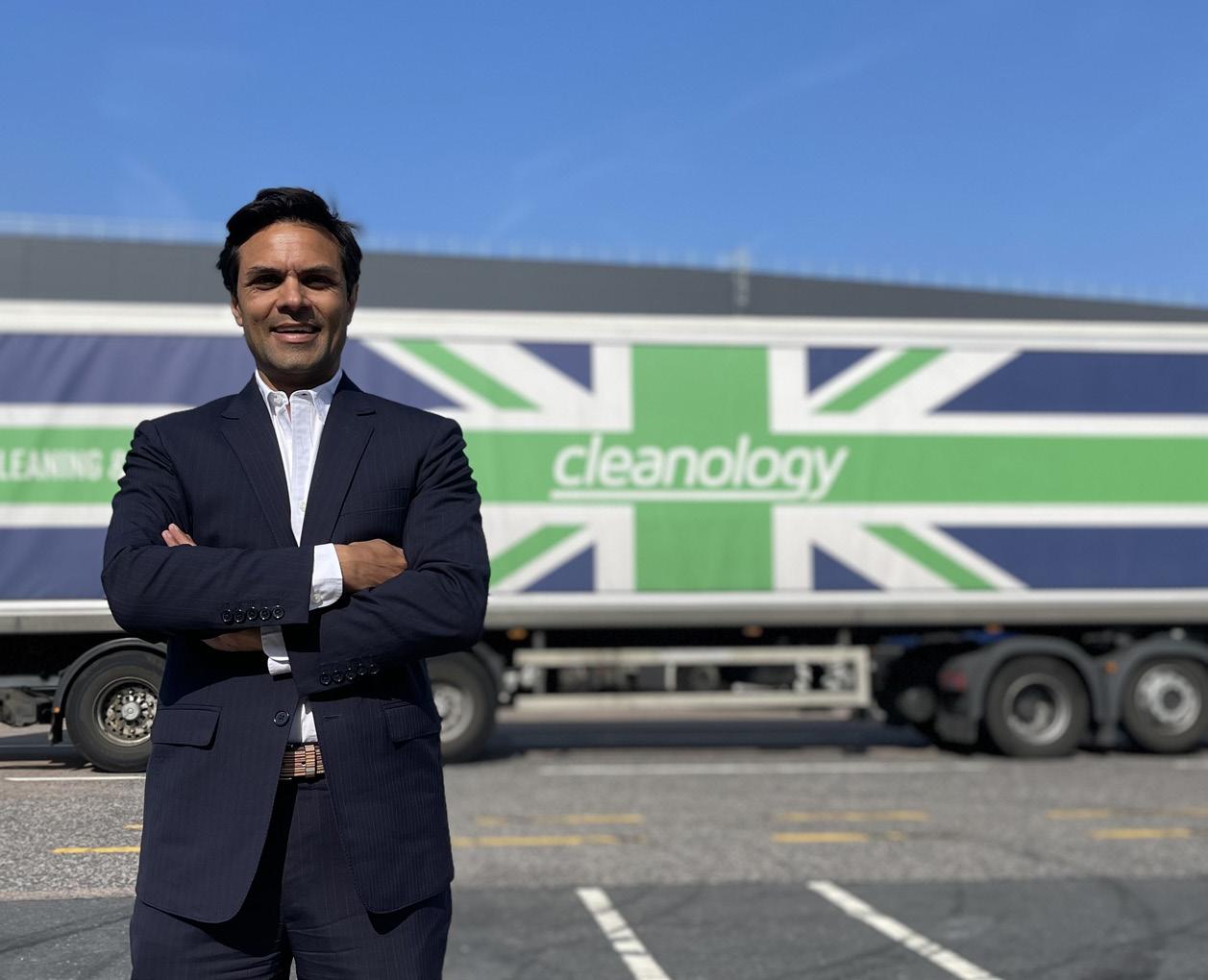
“The big long-term plan is to build a national business, centred around five regions: London (South-East), Manchester (North-West), Bristol (South-West), Birmingham (Midlands) and Scotland,” says Dominic. “We are two-fifths of the way there! The medium-term plan is to grow (possibly by acquisition) the Midlands, South-West and Scotland. My vision is to grow from £25m to £50m in the next three years, however, that could be sooner.” So, is an exit on the horizon for Cleanology’s CEO and founder anytime soon?
“I don’t think I will go on forever, so an exit will have to come at some point in the future, but I’m not ready to sell up yet,” continues Ponniah. to continue to grow our charity partnership with The Hygiene Bank, which has been hugely successful, bringing together our industry for a common cause. There are so many new ideas we want to explore, as well as continuing to push the boundaries on sustainability. It’s a mission never complete, and although we are a long way ahead of our competitors, we are never complacent and will never stop!”

Food tech start-up Heura announced that the animal meat successors secured €31.4m in turnover in 2022, up from €17.7m in 2021.
Founded in 2017 by food activist Marc Coloma and Bernat Añaños, the mission-driven company enters 2023 on the heels of a €20m funding bridge round strategically designed to enable the company to address two of the world’s biggest challenges: sustainability and nutrition.
Responsible for 80% of the plant-based category growth in Spain, the company’s international sales evolution underscores its efficient and scalable model. In 2020 just 6% of sales occurred outside of Spain, while this number hit 12% in 2021 and a whopping 23% in 2022.
CEO and Heura Co-Founder Marc Coloma said: “The last year was a pivotal one for Heura. Our experienced R&D team and world-leading academic and expert partners are creating proprietary technologies that will change the face of the plant-based food industry and unlock the true potential of the movement.”

“THE MEDIUM-TERM PLAN IS TO GROW (POSSIBLY BY ACQUISITION) THE MIDLANDS, SOUTH-WEST AND SCOTLAND. MY VISION IS TO GROW FROM £25M TO £50M IN THE NEXT THREE YEARS, HOWEVER, THAT COULD BE SOONER.”▴ (L-R) Marc Coloma and Bernat Añaños, Founders of Heura
We have collated a list of current billionaires who are self-made, as opposed to inheriting the money and growing with it. Some of these individuals come from almost nothing, whereas others came from middle-class backgrounds, ultimately all billionaires in this list have made their fortune from little-to-no funds, creating a true rags-to-riches story.
However, if you think someone is missing from this list, please send an email to editorial@businessleader.co.uk and they will be added to the digital version on businessleader.co.uk.
This list is in no particular order.
WITH THE IMPENDING DAWN OF THE FIRST TRILLIONAIRE EXPECTED BEFORE 2030, IT’S TIME WE ASKED WHO ARE SOME OF THE WORLD’S RICHEST PEOPLE, WHERE HAVE THEY COME FROM, AND WHAT DO THEY INVEST IN? FOR OUR MOST RECENT TOP 32 LIST, WE’VE LOOKED AT THE TOP SELF-MADE BILLIONAIRES.
 All net worths have been taken from Forbes ‘Real Time Net Worth’ as of the 22nd of February 2023, apart from Lord Alan Sugar and Johnny Boufarhat, where the Sunday Times Rich list was used alongside currency converters.
All net worths have been taken from Forbes ‘Real Time Net Worth’ as of the 22nd of February 2023, apart from Lord Alan Sugar and Johnny Boufarhat, where the Sunday Times Rich list was used alongside currency converters.
$1.5BN
Best known for his appearance on the primetime BBC show The Apprentice, Lord Sugar’s origin is a well-known rags-to-riches story. His original business Amstrad, founded in 1968, produced consumer electronics, most notably selling car aerials from the back of his van.
His current ventures include being the Chairman of Amshold Group which owns Amscreen, an outdoor digital screens manufacturer, and Amsvest, an investment company. Lord Sugar’s main source of income stems from Amsprop, a property portfolio of prime London real estate established in 1985.
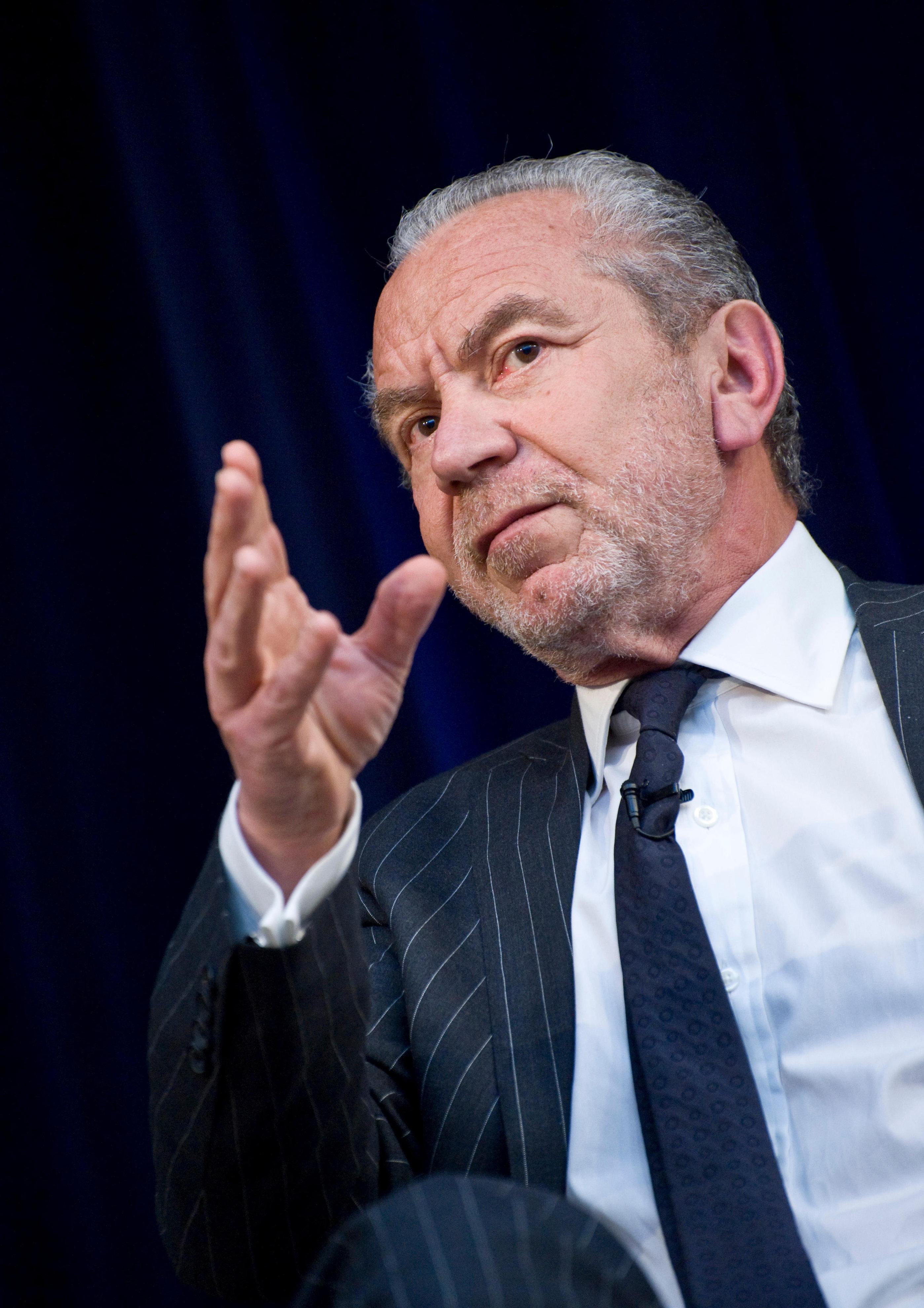
$15.3BN
Sir James Arthur Ratcliffe is the Chief Executive Officer and Chairperson of INEOS, a manufacturer of petrochemicals, speciality chemicals, and oil products. After growing up in a council house in Manchester, Ratcliffe worked for BP and spearheaded a buyout of the chemicals business Inspec Group from BP in 1992. Ratcliffe later acquired INEOS plc from Inspec in 1998, accelerating INEOS with around 19 acquisitions in the first 10 years of owning the company.
$1.7BN
Michael Jordan is best known for winning six titles with the Chicago Bulls, and largely regarded as the NBA’s greatest all-time player. Jordan has reportedly made $1.8bn from corporate partners such as Nike and his Air Jordan deal.
Jordan has equity stakes in companies like DraftKings, where he became a special adviser. He also co-owns 23xi racing team with Denny Hamlin, who owns a minority of the shares.

Jordan became a minority stake owner for the Charlotte Hornets in 2006, later becoming Managing Member of Basketball Operations, and in 2010 sought to become majority owner, with the team now valued at $1.5bn.
$5.7BN
Clive Calder set up his first record company in 1971, CCP Records, and moved to London in 1975 where he then co-founded the Zomba Group in 1976. Most notably, the subsidiary of Zomba, Jive Records, was established in 1981 and may be most well-known. Specialising in pop, hip-hop, and R&B, Jive Records has signed the likes of the Backstreet Boys, Britney Spears, and NSYNC.
He became sole owner of Zomba Group after buying his co-founder’s 50%, but in 2002, he was given the opportunity to sell for $2.7bn, and resigned as CEO a year later.
$2.1BN
Executive Chairperson and Founder for Biocon Limited and Biocon Biologics Limited, Kiran Mazumdar-Shaw is worth $2.1bn, with a current 40% stake in Biocon.
She started her biotech journey in a rented shed in Bangalore in 1978 and was approached by the owner of Biocon Biochemicals, an Irish speciality chemicals company. With foreign ownership limited to 30% in India at the time, she started with a plan to produce enzymes. This expanded to the manufacturing of Papain and Isinglass, with the exportation of Papain to the US and Europe.

$66.1BN
The founder and CEO of Meta, Mark Zuckerberg is most wellknown for his creation of Facebook alongside his college roommates. The Meta platform currently includes popular IP such as Instagram, WhatsApp, Messenger, and Meta Quest, with Zuckerberg having a 13% stake in the conglomerate.
Zuckerberg co-launched Facebook in 2004 to connect Harvard students with one another. This stayed as a college app, reaching one million users by the end of 2004, about seven months after launching. Zuckerberg also has investments in companies like Bluefield Technologies and CarbonBuilt. Along with his wife Priscilla, Zuckerberg is the Co-Founder and Co-CEO of the Chan Zuckerberg Initiative, an organisation set up to help solve some of society’s toughest challenges — from eradicating disease and improving education, to addressing the needs of our local communities.
$1.4BN
Robyn Rihanna Fenty is the CEO and owner of Fenty Beauty, a company launched in 2017 following the failure of the makeup industry to be truly inclusive to all skin tones and types.
Rihanna was discovered in Barbados by Evan Rogers. The then 16-year old’s demo was sent to Def Jam Recordings, where she was invited to audition and signed a six-album record deal. Rihanna also has a 30% stake in the Savage x Fenty lingerie line, which was founded in 2018.

$3.4BN
After dropping out of school at the age of 15, Richard Branson launched his first business in 1968, Student magazine, which provided an alternative to the publications and school magazines of the time.
Branson started Virgin as a mail order record retailer in 1970, under the name Virgin Mail Order, and founded Virgin Records bricks-and-mortar stores after the success of Student magazine, signing the likes of the Sex Pistols and The Rolling Stones.
The Virgin brand has grown tremendously with notable brands including Virgin Active, Virgin Atlantic, Virgin Experience Days, Virgin Galactic, Virgin Mobile, Virgin Radio, and non-profit foundation Virgin Unite.
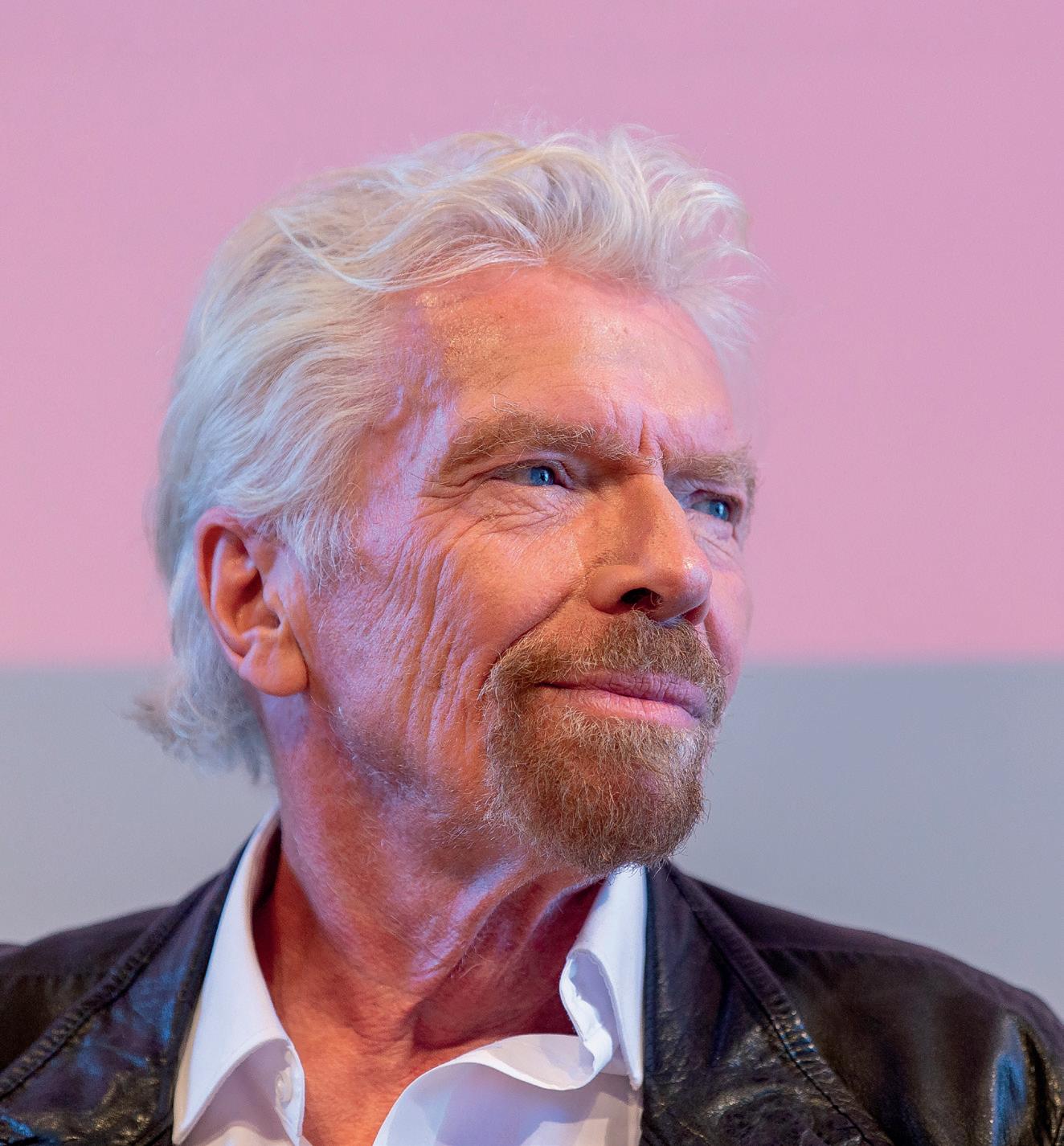
$108.2BN
Warren Edward Buffett is the current Chairman and CEO of Berkshire Hathaway, a holding company with insurance as its main source of capital. Berkshire Hathaway is the parent company of several firms including Clayton Homes, Duracell, and NetJets. The company also has shares in Apple, Bank of America, Coca-Cola, Kraft Heinz, and Mastercard, to name a few.
Buffett is a serial investor, relying on tried and tested rules of investing to work his way up, buying his first stock at 11, and making his first real estate investment at 14. Buffett and his investment company bought the remaining shares of Berkshire Hathaway, turning this merged company into a conglomerate.
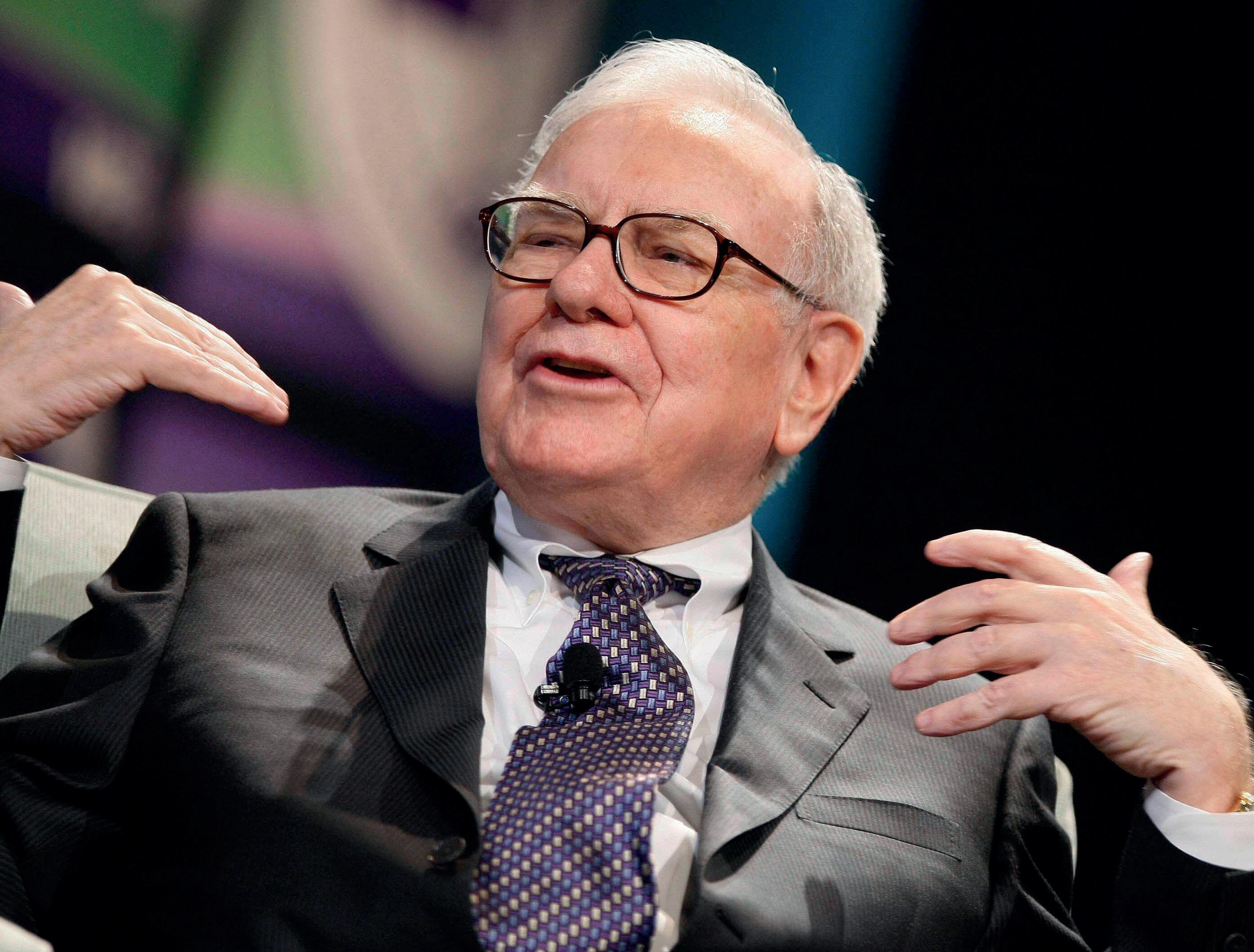
$1.5BN
John Bloor established Bloor Homes in 1969 when Bloor built his first home after training as a plasterer. Two years later, he set up his own building company, becoming a successful private property developer.
Bloor’s other venture is Triumph Motorcycles, which he bought in 1983. Saving the well-known brand from bankruptcy, he licensed a small shop until 1985. He invested over £80m into rebuilding the marque and opened the Hinckley factory in 1991. Bloor’s assets are predicted to have made him an estimated $2.29bn in 2020-21.
$5.4BN
Co-CEO of Bet365, Denise Coates took over her father’s company Provincial Racing, but in 2000, with the dawn of the internet, made the decision to invest in online betting.
In 2005, Bet365’s success was assured, so Coates sold the betting shops to Coral for $50m, and Bet365 now facilitates more than $65bn in bets annually.
In 2022, Denise Coates is said to have taken in one of the world’s biggest ever pay awards of £260m in annual pay and dividends, owning 50.2% of the company.

$3.3BN
Hilton Schlosberg is the Vice Chairman and co-CEO of Monster Beverage. Alongside Chairman and co-CEO Rodney Sacks, the co-founders bought Hansen Natural Company in 1990 after the company filed for bankruptcy, and launched Monster Energy drink in 2002, changing the name to Monster Beverage in 2012.
Schlosberg is stated to have begun his business journey in AAF, a British company investing in firms making alloy wheels. In 2015, Coca-Cola bought a 16.7% stake in Monster Beverage for $2.15bn, opening global distribution. Schlosberg owns 8.7% of the company, a holding worth nearly £2.8bn.

$7.6BN
‘Enjoy failure and learn from it. You never learn from success’ encapsulates James Dyson’s journey to become a self-made billionaire. Dyson became frustrated with his Hoover Junior, so, as an accidental engineer, redesigned the vacuum to be more efficient, using cyclone technology he saw at a local sawmill. His first vacuum, G-Force, was sold in Japan for $2,000 apiece and won the 1991 International Design Fair Prize in Japan. With the royalties from the G-Force sales, Dyson set up Dyson Ltd, of which he serves as Founder and Chairman today.
$6.7BN
George Soros is known as ‘the man who broke the Bank of England’, after shortening the British pound and making a profit of $1bn. Soros is the Founder and current Chair of Soros Fund Management, an asset manager for Open Society Foundations, founded in 1979.
Soros worked as Vice President for Arnold & S. Bleichroeder and used investor’s capital of $4m and $350 of his own money to create a hedge fund in 1969. By 1973, the hedge fund was worth $12m. This urged Soros to create his own hedge fund, Quantum Fund, which he managed between 1970 and 2000.

$5.9BN
In 1998 Patrick Soon-Shiong acquired Fujisawa after selling in vitro generic drugs, and used the proceeds to create Abraxane, the cancer drug used primarily for pancreatic cancer. In 2010, Soon-Shiong sold his drug company Abraxis, and in 2008 sold American Pharmaceutical Partners for a combined total of $9.1bn.
Patrick founded biotech conglomerate holding company NantWorks LLC in 2011, which focuses on biotech, AI, and health care. He also has a 4.5% stake in the Los Angeles Lakers and acquired the LA Times and San Diego Tribune.
$2.5BN
Oprah Winfrey is the Founder, CEO, and Owner of Harpo Productions, a multimedia production company, but Oprah is best known for her hit TV show The Oprah Winfrey Show. Oprah also owns O Magazine, launched in 2000 and has since been rebranded to Oprah Daily and Oprah Insider, a subscription site launched in 2021.
Oprah was originally a news reporter and rose in popularity to do a 30-minute morning show called AM Chicago. Oprah licenced for a national audience through syndication, renaming it to The Oprah Winfrey Show, later expanding and buying the Network to create the Harpo Entertainment Group.

$105.1BN
William Henry Gates III co-founded Microsoft with Paul Allen in 1975. The company was originally founded to develop software for Altair 8800, an early personal computer, and accelerated after a partnership with IBM in 1980 caused Microsoft to begin receiving royalties.

Microsoft includes such brands as Xbox, launched in 2001, and Bing, unveiled in 2009. Gates stepped down as Chairman but remained on the board and served as technology adviser in 2014. He now owns 1.3% of Microsoft’s shares. Gates is also a serial investor, with companies like Deere & Co. and Ecolab inc., and helped launch TerraPower, an environmentally friendly form of nuclear energy.

$78.3BN
Sergey Brin, along with Larry Page, co-founded Google, and is currently a Board Member of Google and subsequently Alphabet Inc., encapsulating Google and its various interests as a conglomerate. Alphabet’s net worth was $1,211.41bn in February 2023. Brin owns approximately 6% of Alphabet’s shares, and, with ‘super-voting’ shares, Larry and Sergey together own 51%, 25% of which are his.
Page conceived the idea of the search engine, and alongside Brin’s mathematic ability, they created an algorithm designed to rank internet results based on linking behaviour, and in 1998, the company began its journey thanks to a $100k cheque from Andy Bechtolsheim.
$6.5BN
John Grayken is the Founder and Chairman of private equity firm Lone Star Funds, which he founded in 1995, as well as an avid investor. Lone Star Fund’s commitments have a total of approximately $86bn. Grayken is also the founder of Hudson, a full-service asset management company, managing Lone Star buys.
Grayken started out in Morgan Stanley’s real estate group and went on to work with Texas billionaire Robert Bass, who partnered with Brazos, a partnership which Grayken oversaw. Grayken was also put in charge of a $130m partnership to purchase 1,300 ‘bad bank’ assets, flipping them to make a profit, but left Robert Bass to pursue Lone Star Funds and raised $400m.
$6BN
David L. Steward is the Founder and Chairman of IT provider World Wide Technology (WWT). Founded in 1990, today the company is the largest Black-owned company in the United States, with Steward holding a 59% stake.
Steward sold railed services with the Missouri Pacific Railroad company, then joined FedEx as a Senior Account Executive. Steward borrowed $2,000 from his father to launch Transportation Business Specialists, and subsequently founded Transport Administrative Services, the successful start-up companies that led Steward to begin WWT with a handful of employees.
$112.5BN
Co-Founder, Chairman, and CTO of Oracle, Lawrence Ellison owns around 35% of the company, having relinquished his position as CEO in 2014. He also has stakes in Tesla, along with real estate holdings, amounting to his staggering net worth.

Alongside fellow Oracle Co-founders, Bob Miner and Ed Oates, Ellison dropped out of college to start a company that developed relational databases. Intending on developing a software that works alongside IBM, but becoming a competitor instead, a working version of Oracle Version 1 was created by 1978, but never released. This company grew as it improved its database and suite of software products.
$2BN
Alexander Beard holds a 2.5% stake in Glencore, a natural resource company. Beard became CEO of the company in 1995, until retiring in 2019. Before this, Beard was an oil trader for BP from 1990-95, and worked his way up the company to become Chief Executive Officer.
In a significant move away from the economy Beard gained his net worth from, Beard is now the Director and shareholding founder of Adaptogen Capital, which focuses on renewable energy opportunities.
$7.9BN
Sir Christopher Anthony Hohn is a notable investor and philanthropist. He invested in a wide array of industries, including manufacturers and consumer product companies after joining Richard Perry’s hedge fund, Perry Capital in 1996 and launching his own portfolio.
He co-founded The Children’s Investment Fund in 2002 and is currently Chairman. He is a successful investor that gives generously to charitable causes.
$6.5BN
Nathan Kirsh heads the Kirsh Group which holds a majority stake in his business Jetro Holdings, owning over 70% of the company. This is the parent company of Jetro Cash and Carry and Restaurant Depot. Whilst Jetro Holdings is his main source of income, Kirsh has multiple ventures in multiple countries, like a security systems firm in Isael from the late 1970s until 2014.
Kirsh joined his mother running their original malt factory in 1952 and launched his own corn milling and malt business later in Eswatini. In 1970 he acquired Moshal Gevisser, becoming a dominant food retailer in South Africa. In 1976, Kirsh launched Jetro Cash and Carry in Brooklyn, New York, and bought Restaurant Depot in 1994.
$1.3BN
Shawn Carter, more notably known as Jay-Z, founded Roc Nation in 2008, signing the likes of Rihanna and Rapsody. Jay-Z also founded Roc Nations Sports in 2013, supporting athletes the same way the company supports musicians.

Shawn Carter also has an impressive investment portfolio adding to his net worth. He served as President of Def Jam Recordings, launched the ‘Made in America’ festival, acquired Armand De Brignac Spirit brand, and is the majority owner of 40/40 sports club and bars. He is also the co-owner of TIDAL, the global streaming service since 2015.
$76.8BN
Amancio Ortega Gaona co-founded Inditex, which is best known for Zara fashion, with his ex-wife Rosalia Mera in 1975. He currently owns around 60% of the company.
In 1963, Ortega opened a small dressmaking workshop called Confecciones GOA, but made the move from maker to retailer when Zara was founded. Inditex also includes companies Pull & Bear and Massimo Dutti, among others.
Ortega has also invested in real estate with American big tech companies amongst his tenant list, like in Spain, where Ortega rents offices to both Google and Apple.
$5.1BN
Joseph Lewis is the owner and Chairman of the Tavistock Group, an investment and holdings group for large-scale developments, commercial, and residential properties, including the Premier League’s Tottenham Hotspur and Mitchells & Butlers.
Lewis founded Tavistock Group in 1975 in Nassau, Bahamas after selling the family business, Tavistock for $40m. Joe then moved into currency trading from 1979 and allegedly made more than £1bn short selling the Mexican peso and the British pound in the 1990s.
$2.2BN
Worth $2.2bn, Michael Ashcroft made his fortune from buying and selling companies, like the home security giant ADT in 1987.
In 1977, after selling his first business, a cleaning company, he became Chairman of Hawley Group plc and transformed it into a successful business. But in 1988, he rebranded Hawley into ADT after a US merger and sold the new company to Tyco International in 1997 for $6.7bn. He has also invested in companies like Waterloo Investment Holdings Limited and Gusbourne plc, among others.
$2.9BN
John Caudwell is worth $2.9bn, but John Caudwell founded Phones 4u on the back of operating a car dealership, creating a deal for mobile phones in 1996 by buying in bulk and selling them on for a profit. He sold his stake in the company in 2006 and 2011.
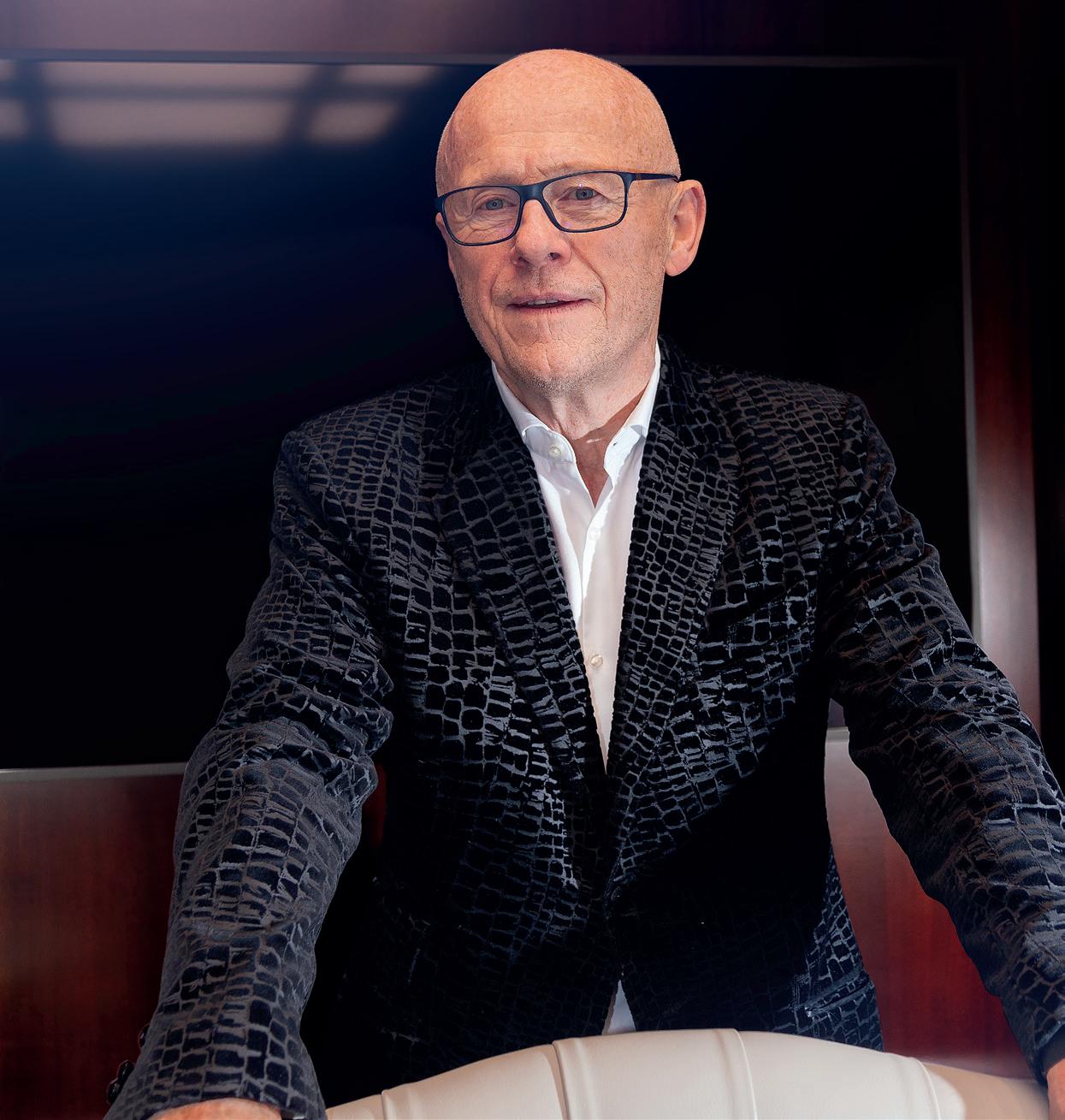
Caudwell now focuses on philanthropic work and property development with his business, Caudwell. Caudwell Children helps disabled and autistic children across the UK, and Caudwell LymeCo promotes the health of sufferers of Lyme disease.
$1.9BN
Strive Masiyiwa is the Founder and Executive Chairman of Econet Group, which is comprised of Cassava Technologies and Econet Wireless.
Masiyiwa first launched Econet Wireless Zimbabwe, the largest of his Econet group, in 1998, and owns just over 50% of the business. He returned to Zimbabwe after fleeing when he was seven with his family. He joined Zimbabwe Posts and Telecommunications Corporations, the state-owned telephone company, but left after he became frustrated with the government bureaucracy, and started an electrical contracting firm called Retrofit Engineering.
Masiyiwa saw the potential for wireless in sub-Saharan Africa due to the lack of fixed-line phones and the threat of copper wire theft. He sold Retrofit Engineering in 1994 to start Econet Wireless Zimbabwe.
$116.8BN
Jeff Bezos is famous for his co-founding of Amazon and is currently Executive Chairman of the e-commerce giant, owning less than 10% of the company.
Amazon was founded out of his garage in 1994 as a website that sold books, with the aim of making it an ‘everything store’. Thanks to a $250k loan from his parents to get started, Amazon is now worth approximately $960bn.
Bezos also founded Blue Origin, a company that focuses on getting people living and working in space, and he owns The Washington Post. Bezos has acquired further wealth with strategic investments in companies like Airbnb, Inc., Uber Technologies, and Alphabet Inc.
$3.4BN
Founder of Graff Diamonds, Laurence Graff set up a business with a more experienced jeweller repairing Victorian jewellery at 18. Later meeting a diamond dealer led Graff to put 33 diamonds on one ring, starting his diamond business.
Graff Diamonds was established in 1960, and two-years later opened two retail boutiques in London, gradually increasing brand awareness and taking it to a global market.

Today, Graff owns a polished diamond trading firm in Switzerland, real estate in Mayfair, and a stake in a South African diamond wholesaler. As well as owning Delaire Graff Estate, a vineyard and winery with a boutique hotel and restaurant in South Africa.

Freeing up entrepreneurs and their teams to thrive and grow in a world of rapid change.

The Strategic Coach® Program is a quarterly workshop experience for successful entrepreneurs dedicated to never-ending growth and an exceptional quality of life.
If you’re ready to maximize your entrepreneurial success and freedom, download your FREE copy of The Self-Managing Company ebook.
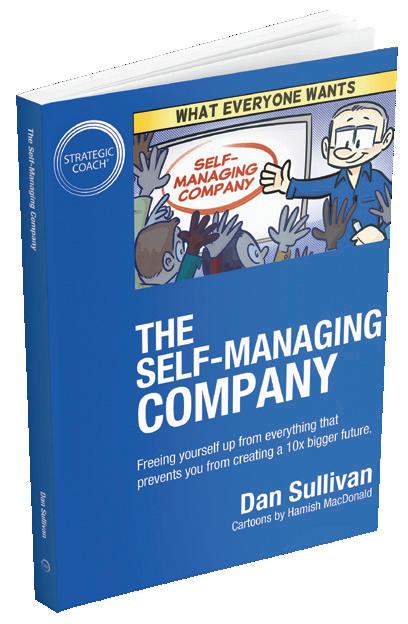
“Through my experience with Strategic Coach, I've gained mindsets that help me think positively and look for opportunity, even in dire situations. Coach has equipped me with the tools and con dence to automatically focus on the positives in any given situation and nd solutions quickly. I’m grateful that Strategic Coach has helped position me and my business so that we’re better prepared for unforeseeable events.” -
Guy RemondIn a bid to control costs during an intensifying economic crisis, the world’s biggest tech companies laid off more than 150,000 employees. Meta, Alphabet, Microsoft and Amazon have all cut jobs, leaving the world wondering if this signifies a marked shift towards a new world of work. Did giant tech companies hire too quickly during the pandemic? Are we finally seeing a mass exodus of jobs which are being taken over by AI? Or were these layoffs just a means to cut costs during increased economic strain?

As society stood still and we were confined to our homes over the pandemic, most tech giants saw a spike in the use of their products and services. As a result, many hired intensively to keep up with demand. According to reports, the ten major tech companies collectively increased their workforce by 875,000 employees.
“I believe that many in the technology sector thought we were entering into a paradigm that wouldn’t see us go back to how it was,” says Jason Foster, CEO at Cynozure “This led to many taking on vast numbers of people, not only to meet the current demand but on the assumption that demand would sustain.

“The reality is that the period over the pandemic was an outlier and whilst some increased demand has remained, largely we’ve seen this dampen and return to pre-pandemic levels. This has resulted in a sharp drop in demand, and therefore layoffs ensue.”

Although the large swath of layoffs may signify an overzealous hiring spree, the layoffs are still only a small fraction of these pandemic hires, so cannot entirely be attributed to this period.
Bernard Marr, Futurist, Strategic Advisor, and author of Future Skills says the reasons behind the layoffs are diverse, but we are seeing significant layoffs in one area in particular. He says: “Big tech
saw record revenues during the Covid-19 pandemic, which made them go on a massive hiring spree, but is now faced with a different business reality of economic downturns, supply chain challenges, high inflation, higher interest rates, and investor pressure. So, it’s not a surprise to find that the median time a recently laid-off employee has been in their role is roughly two years. What’s more, cutting back on recruitment means less need for HR staff, and indeed, 28% of all layoffs came from HR.”
Rapid recruitment can also have the consequence of improper training and an inadequate skillset, which could be a part of the reason for the layoffs. This begs the question of whether companies should be more cautious and take more responsibility when hiring at scale. John Paul Caffery, Founder and CEO of RAMP Global, comments: “The other point to note is that when you’re hiring at velocity, it’s very difficult to implement a proper onboarding, training, and development programme for your workers.
“You end up with lots of individuals and teams coming in to make a genuine impact but not necessarily the right structure for them to excel in their respective roles and add real value to the business. Then, when businesses inevitably don't see the expected output, they are more likely to make mass layoffs in response.”

With the rise of ChatGPT, many are concerned about the potential of AI to replace jobs currently performed by humans. Although this may seem like an obvious part of the reason for the mass layoffs in tech, it’s only a part of the picture, as AI is currently more prominent in specific areas, not all of which experienced mass layoffs.

Marr points to the changes we are already seeing as a result of AI, but stresses that there are job losses in one department of businesses in particular. He comments: “Artificial Intelligence is playing an enormous role in augmenting pretty much any job role. Although modern AI tools are improving at many tasks, the field of HR is experiencing the replacement of certain functions through automation. There are already platforms that automate the routine tasks of interviewing and onboarding new hires. These platforms conduct activities such as verifying identities, checking references, carrying out health and safety assessments, and performance monitoring.”
AI offers the potential for a revolution in the working world. Despite this, Caffrey feels that a more likely threat to tech jobs is the ability of companies to seek talent from countries with cheaper labour. He comments: “A final point worth mentioning is that global tech companies are realising that, while they may have hired or over-hired in a particular country or region, they are realising they can hire the same talent in a different location at a cheaper cost. There are now a lot of providers making it simpler for global employers to find, hire and pay workers anywhere, so some of the layoffs taking place may well result in re-hiring in different locations for lower costs.”
The recent layoffs indicate that relentless business growth isn’t always a positive thing, and there can be long-standing implications on the business, the economy and society at large. Despite unsustainable growth having a temporary negative impact on the economy, there can be long-lasting positive effects too.
“This type of overcharged growth can create distortions in the economy, artificially inflate salaries in the rush for talent, and create a spending splurge that is not sustainable. When the bubble bursts, as we’ve seen in the past 15 months, this is perceived as having a negative impact but there are possible benefits too,” says Julien Lafouge, CFO at Spendesk
“These strategies can lead to accelerated learning for employees and can enable new markets to be created that become sustainable in the long-term. In fact, many people being made redundant have high employability and have developed competencies that will prove valuable in the wider job market. We cannot ignore that there is suffering in the short-term, but there are indicators to suggest a positive impact in the long run.”
The personal and emotional impact of mass layoffs cannot be ignored. Many employees may feel hard done-by as a result of being let go, especially if they have only been at a company for a short period of time.
Clare Loveridge, Vice President and General Manager EMEA at Arctic Wolf, points to the security risks businesses may face as a result of mass redundancies. She says: “As we continue to see layoffs by companies in almost every industry, it’s also important to consider the wider effects of these reductions - including the security threats these pose to the companies involved, big or small. While access management has always been an issue with employee departure, this is going to be heightened due to the sheer numbers of workers being laid off.
“For example, employees may want to take action if they feel they have been unfairly targeted, while bad actors could bribe exemployees into granting access to internal systems. This is why we are continuing to see businesses of all sizes, even SMEs, prioritise security spend amidst belt-tightening. ‘Cyber cuts’ simply aren’t an option. The risk of an incident, and the consequential costs, far outweigh the temporary relief a programme cut could bring; and leaders realise it is critical to have operations in place to protect their people and businesses.”
While a business’s security could be at risk from fast growth, Marr suggests that ‘growth at all costs’ can negatively impact a business’s internal structure as it takes away from the long-term goals of a company, which include the needs of its customers and stakeholders. He comments: “Business owners should consider alternatives to "growth at all costs" because this approach can lead to negative consequences for both the company and its stakeholders. Instead, a more balanced approach that prioritises sustainability, long-term profitability, and stakeholder value is often more beneficial.
“When a company prioritises rapid growth over all other considerations, it may engage in practices that have negative impacts on the environment, workers, and communities. It is therefore important for companies to consider the social and environmental impacts of their growth strategies and adopt more responsible and sustainable practices. In doing so, companies can create long-term value for all stakeholders, including society and the economy as a whole.”
Indeed, rapid growth in a company can have the unexpected consequences of bringing attention away from other, equally as important, areas of the business. In this sense, positive business development doesn’t always have to mean increasing your head count at pace.
“When you consider what the costs to rapid growth could be - cultural changes leading to staff turnover, changes to client relationship management and satisfaction, and more - it makes a ‘growth at all costs’ approach seem nonsensical. I believe that growth can be achieved at a pace without rocking the allimportant foundations of a company,” says Matt Hammond, Founder of Talk Think Do.
‘Sustainable growth’ seems to be the phrase on everyone’s lips. While the internal structure of your business will surely be impacted by redundancies, so too will society. Some in tech are concerned about the consequences these mass layoffs have for the reputation of the tech community and attracting talent.

Hammond continues: “The almost continual news of international redundancies will be
doing very little for confidence within the tech community and that is bound to have consequences in places. The Big Tech landscape isn’t reflective of the entire sector and I worry for the wider impact these mass redundancies will be having on morale and appeal of the industry. I am keen to promote the message that there are still fantastic opportunities available in the tech sector, particularly with growing UK-based firms.
“These roles might not be with the international household names, but that doesn't mean great tech roles don’t exist at all. SME-sized tech firms may have been considered the industry underdog historically, but I believe 2023 is going to shine a light on the immense opportunity, and stability, this section of the market can offer.”
Rapid growth is desirable for almost every business founder. For many, it’s their ultimate goal, which could lead them to sell their business, achieve international expansion, or take in record breaking profits. Despite this, the large layoffs in tech suggest that if growth is too quick, it can be unsustainable and can have negative consequences for the business, society and the reputation of an industry.
Nonetheless, workers experiencing even a few years at a big company means that when they are released back into the job market, they are more experienced – having a positive impact on the economy and number of skilled workers. Highlighting that the secret to positive growth, that has a good impact on the society your business operates in, is one that is done considerately and sustainably – which will ultimately lead to a healthier business in the long term.
We couldn’t agree more.
Albert Goodman, a friendly, fair, forward-thinking and fabulous bunch of accountants.
Our brilliant people are with you wherever you are on your journey, through the ups and the downs. We will be here to celebrate with you when things are fabulous and support you through them when they’re not.
See what the rest of our clients have to say at www.albertgoodman.co.uk
Once touted as the future of finance, cryptocurrency has taken a few steps back in recent months. With the collapse of FTX demonstrating its volatility and the emergence of crypto shadow banking showcasing its potential for high risk and high reward, many are questioning if the current iteration of crypto will reach the heights that many first predicted for it. So, is crypto just experiencing growing pains or has the bubble well and truly burst? In this article, we take a closer look.


The Corporate Finance Institute defines the shadow banking system as “the broad collection of financial institutions and financial markets that offer the same type of services as commercial banks but that are not within the regulatory environment that traditional banks are subject to.”
Anton Golub, a Strategic Advisor at decentralised OTC marketplace Pazar, claimed in a LinkedIn post that Genesis Trading is the largest player in crypto’s shadow ecosystem. Golub uses their loan book as a proxy for their shadow banking activities and says their active loan value collapsed from a peak of almost $15bn in Q1 2022 to $2.8bn in Q3 2022, a drop of over 80% in less than six months.
According to Brendan Beeken, the Chairman of Moni Talks, Genesis Trading is not the only company engaging in shadow banking practices either.
He says: “If it looks like a duck, quacks like a duck, and acts like a duck, then it is a duck - so the saying goes. But just because it acts like a bank, that doesn’t make it a bank, and this is the case
with shadow banks. Some exchanges and entities within the sector do act like this. FTX was a true example. It has been going on under the noses of governing bodies for too long. My concern is how quickly policies can be implemented globally to ensure shadow banking - which symbolises one of the many failings of the financial system leading up to the global financial crisis - stops!”
However, banking industry expert Emmanuel Daniel says the practice in crypto is tiny compared to other shadow banking industries.

He continues: “I would argue that the crypto shadow banking industry has not even started yet. The phrase is a reference to the lending and
leveraging of cryptoassets in decentralised finance to generate income. Shadow banking refers to activities of non-banks to lend to traditional bank customers to leverage their traditional assets. The crypto version is mostly contained within the decentralised finance space where the lending and leveraging is designed to fund staking and generating new cryptoassets. This kind of lending is an important component of growing the digital asset space, which is an area that banks are not present in the first place.
“Naturally, when leveraging grows unbridled, the fall in the value of the primary asset that is leveraged causes a chain reaction that destroys all the players that are exposed to the credit. It is true that in the absence of regulations on how much capital the lenders in the crypto space should carry, or how they should value their assets, many of the players over-leverage and cannot survive a liquidity crunch. They deserve the consequences, especially if they have been greedy.
“But these fallouts are an important part of maturing an industry. It removes bad actors, it strengthens decentralised finance so that no one player is able to dominate the asset, and
it causes the industry to start self-regulating and set in place governance structures. All very reasonable phases in the growth of any industry.
“The fallout in crypto shadow banking was not a symptom of a problem in the crypto industry, but a forerunner of the fallout that was to come in all other regulated lending industries.

“We now see the fallout in the banking industry itself, with banks like Silicon Valley Bank, which has nothing to do with crypto going into a tailspin because the traditional lending assets it was invested in started to lose their value, including treasury bonds. I am waiting for widespread corporate defaults next.”
THE COLLAPSE OF FTX IN EARLY NOVEMBER 2022 SAW BILLIONS KNOCKED OFF THE CRYPTO MARKET, TAKING IT BELOW A $1TN VALUATION

So, although the lack of regulation poses some risk, especially where crypto lenders who over-extend themselves are present, crypto shadow banking may not be as widespread as many think, and any potential fallouts could just be a precursor to a better regulated, more-refined crypto industry.
FTX’S
Speaking of fallouts, the collapse of cryptocurrency exchange and hedge fund FTX in early November 2022 is the biggest seen in the industry to date. Its collapse knocked billions off the crypto market, taking it below a $1trn valuation. Incredibly, just hours after filing for bankruptcy, FTX experienced a possible hack and close to $500m worth of tokens were stolen.
According to Beeken, the crypto market has not yet recovered from its collapse either. He continues: “With other collapses in the sector, from banks to lenders, we are seeing uncertainty still and a cautious approach from the average investor. I do think, unfortunately, that we will see another top 20 exchange disappear from the industry, but we need to focus on the long term now and look for stability, along with regulation.”
Daniel Takieddine, CEO MENA at BDSwiss, says the risk of collapse also remains present as cryptocurrency prices remain at very low levels after a year-long decline.
“Several entities have assured their partners and clients of possessing sufficient reserves to operate but the nature of those reserves has not always been clearly and independently identified,” continues Takieddine.
“Moreover, the absence of regulation leaves some uncertainty in this regard. We have periodically witnessed episodes of major crypto industry players failing, adding to the pressures on the sector.”
“NATURALLY, WHEN LEVERAGING GROWS UNBRIDLED, THE FALL IN THE VALUE OF THE PRIMARY ASSET THAT IS LEVERAGED CAUSES A CHAIN REACTION THAT DESTROYS ALL THE PLAYERS THAT ARE EXPOSED TO THE CREDIT.”Emmanuel Daniel
As the lack of regulation is creating some uncertainty in the sector, does this mean crypto will become better regulated in the future?
Beeken believes regulation of the sector is “inevitable” and “essential”.
He says: “We are seeing the shift in the UK happening this year with the impending Financial Promotions Regime. However, just having regulations in place in relation to anti-money laundering (AML) and promotion isn’t enough when it comes to cryptocurrency exchanges. This industry needs to be regulated to a level like that of a stockbroker, that’s where the industry needs to be longterm. Regulation of assets should ensure we don’t have as many scams in the market or projects with a short-minded mindset. Those investing need to do their own research and investigate the project behind the asset rather than just its short-term performance.”
However, looking at the US, Emmanuel Daniel says the different regulatory agencies are pursuing sometimes widely different agendas.
He comments: “The SEC wants to regulate cryptos as a security, the OCC wants to regulate stablecoins as deposit taking companies and so on. They are fast in punishing a Binance for crimes it has not committed yet, and very slow in pursuing an FTX for its clearly reckless and criminal conduct. They are very accommodating of a Circle and its USDC stablecoin but quick to pursue other stable coins and Silvergate’s exchange network, Sen. I certainly believe that the SEC’s definition of all cryptos except Bitcoin, as a security, has a potentially positive impact on “cryptonomics” or the economics that drives crypto today to be valuable only because of its price hikes. The real value in crypto is in its utility and applications.”
It seems crypto’s future is one that will be better regulated. But that’s not all. Traditional banking institutions, such as Morgan Stanley, Goldman Sachs and the biggest bank in the US, JP Morgan Chase, have already jumped on the cryptocurrency bandwagon and more could follow suit.
According to Beeken, institutions large and small cannot ignore the shift in this sector and risk being left behind but the current recessionary environment, crypto’s volatility and the collapse of Silvergate Bank at the end of last year mean there will be caution from many institutions. However, he believes that big names embracing the space can only have a positive impact in the long-term.
Takieddine also believes the tough economic climate could also have an impact on the willingness of big institutions to get involved in the crypto space.
He says: “The cryptocurrency market has been in a consolidation phase after declining for more than a year while investors’ sentiment improved to a certain extent. However, the market could come under renewed stress as inflationary pressures could push major central banks to continue tightening their monetary policies more than was previously anticipated. As a result, and like other risky assets, cryptocurrencies could see a decline in prices this year before lower inflation and softer monetary policy allow for more suitable conditions.”

According to Daniel, the highly paid bankers will only confirm what the cryptokids have always known: the future is in decentralised finance that will require these traditional banks to reimagine their own roles in the future of finance.
Cryptocurrencies have certainly experienced a few hiccups in recent months and, combined with the tough economic climate we’re currently experiencing, those operating in the industry are likely to proceed with caution in the near future. However, with regulation looking like an inevitability and more traditional banking institutions plunging themselves into the world of cryptocurrencies, the long-term outlook for the future still looks very bright indeed.
“THOSE INVESTING NEED TO DO THEIR OWN RESEARCH AND INVESTIGATE THE PROJECT BEHIND THE ASSET RATHER THAN JUST ITS SHORT-TERM PERFORMANCE.”
Brendan Beeken
The shift from five working days in the office from 9-5; to going either hybrid or totally remote has shaken up how employers and employees view each other. Like it or not, switching from formalwear to elastic band joggers comes with its benefits and repercussions. It is your job as a business leader to identify these factors and ensure your employees not only feel comfortable in their work environment, but also set up to succeed.
It’s understandable to question if your employees or team members are working to the level they should be whilst at home. In fact a report by Citrix (2022), found that half of all business leaders believe that when employees are working “out of sight,” they don’t work as hard. While a further 48% installed monitoring software on company owned-tech to check on their employees. As a result the ‘new normal’ we were all wishing for has led to an era of “productivity theatre” where workers feel they have to prove their value by leaving crumbs for senior bosses in order to illustrate their activities. Employers must figure out how to navigate their employees to success, but also understand how to avoid applying too
much pressure that could be damaging to individuals. Employee monitoring and surveillance have been a mainstay in companies for years but with work and home life blurred as a permanent fixture for today’s workforce we need to consider impact more deeply.
A report by the Advanced Workplace Associates (2022) found that the average attendance was 29% – just 1.45 days of a standard five-day working week – peaking at 39% mid-week indicating that across the board people prefer working from home. When we begin to look at perceptions of the traditional office we start to see significant generational differences. Younger workers seek the communal nature of offices, which helps fill the need for a social and collaborative way of working, whereas older workers typically favour hybrid environments, as they tend to have more domestic duties to tend to.
Taking personal preferences into consideration is crucial to building a productive and dynamic team, but as a leader you’ll also have to manage expectations about the expected outcome
By Geoff Lawrence, Vistage Managing Director UKof in-office days - particularly if growing numbers of people feel more productive in a flexible environment. My biggest tip?
When your team is together – make use of your time. This way in-office days become beneficial for everyone in some way, avoids bringing the isolated work-from-home mentality into the office.

When you are in person with team members, create a structure in place to work on group focused actions and goals, while also creating a safe space to discuss any other projects, assignments and any issues or grievances they may be having.
It's clear that there is more to be done when understanding the balance between working from home and being in the office. We need to ensure everyone is excelling in both spaces, not only performance wise, but also from a mental health front. Avoid applying too much pressure when working in person or virtually, and in return you will see a more prosperous workforce wherever they are.



In this exclusive interview, we spoke to Danny Gray, who rose to fame on Dragons’ Den having founded the male cosmetics brand War Paint. His most recent venture is JAAQ, an interactive mental health platform that gives users access to knowledge from experts and known figures with lived experience.
Danny tells us why his battle with body dysmorphia led him to found a men’s make-up brand, what the biggest challenge of his career was and how he dealt with it, and how he manages his mental health with the stresses of being a business founder.

CAN YOU TELL US A BIT ABOUT YOUR JOURNEY AND WHAT YOUR MOTIVATION BEHIND STARTING WAR PAINT WAS?
I came out and told the world for the first time that I suffered with a mental health condition called Body Dysmorphic Disorder, which is a mental health condition where you obsess about the way you look. When I got to about 15/16 years old, I was getting spots and I turned to my sister who gave me a bit of concealer. I couldn’t believe what that product did, how easy it was to use and how it made me feel. I’ve been wearing makeup for the last 20 years going on today. But for those 20 years, I couldn’t find a brand that related to me as a man. I decided to create my own brand back in 2017 and we launched in November 2018.

WAR PAINT IS A UNIQUE BRAND IN A MARKET THAT ISN’T SATURATED, WHICH EXPLAINS WHY YOU GOT SO MANY OFFERS ON DRAGONS’ DEN. WHAT IS THE PROCESS LIKE AFTER YOU GET THAT INVESTMENT?
You achieve the investment and there’s a whole due diligence process afterward. I’ll be honest, I came off the show, even though it went very, very well, and I was a bit gutted. I was annoyed with myself that I’d done a deal for 12%. Not every deal happens afterward, and it just so happened that the deal that we did just never materialised from both parties.
Four or five months later, I actually did get investment from a VC firm for considerably more money. We had gone viral prior to Dragons’ Den and got negative backlash. I was on the primetime BBC show, so it was a chance for me to tell my story, which I’d never really done before.
MAKE-UP COMES UNDER CRITICISM FOR PERPETUATING ATTITUDES TOWARDS PERFECTIONISM. HOW DO YOU ENSURE YOUR BRAND DOESN’T DO THIS?
It’s a tool that I use, it’s not the fix. I use it to help with my mental health and, if you start using it as a tool and depend on it, it can be very difficult. I use loads of different tactics for my mental health around helping me manage it. If you go back to when I was 28, I didn’t manage my mental health.
YOU EXPERIENCED NEGATIVE BACKLASH ON TWITTER WHEN YOU FIRST PUT OUT THE BRAND AND IT WENT VIRAL. HOW DID YOU DEAL WITH THIS?
I didn’t deal well. We put an advert out on Twitter using guys who weren’t being used for this type of product – like muscley guys with tattoos. We were trying to show that different types of guys can use these products. We got eight million views in 24 hours. Every major news outlet was speaking about us, and I had two days of them wanting an interview.
For every bit of criticism we got, I also got a message from someone thanking us and telling us that their son uses it and loves it. When I went on Dragons’ Den, I made a conscious effort to tell my story and then that’s when everything changed. It was a big turning point. A brand isn’t really about the product, it’s about what you’re trying to achieve and explaining that.
IS ANY PRESS, EVEN BAD PRESS, STILL A GOOD THING?
What that did do for us was take us from being unknown to being in every publication. People will jump on the negative things online.
Sometimes it can make your brand stand out. People who are lambasting the brand and those who were criticising us aren’t our customers. You can’t please everyone.
YOU’VE STARTED JAAQ, HOW DID YOU END UP DOING THIS?
It dawned on me that there is such a lack of information out there about mental health. The message that we need to talk has been around for a while, but we need to do more. I had the idea that there would be people with lived experience giving advice.
War Paint has recently gone into Superdrug, how are you scaling the business even during a recession?
There isn’t a lot in the market for what we are doing, so there is a lot of interest in us. Self-care is doing well at the moment. Even during a recession, people want to spend money on things that make them feel a bit better.
ARE YOU A NATURAL LEADER AND WHAT IS YOUR LEADERSHIP STYLE?
Leading a business is tough. I didn’t know what ‘imposter syndrome’ was until I started my business and I get it every day. I don’t know if I’m a born leader or a perfect leader, but I just believe in the mission. If you’re doing something you’re passionate about, it will be easy.
HOW DO YOU MANAGE YOUR MENTAL HEALTH WHILST RUNNING THE BUSINESS?
At first, I found it really difficult. I was working a lot of hours. I have cold showers in the morning and look after myself. If I’m having a bad morning because of my body dysmorphia, I’ll tell the team that I’m not feeling 100%.
When I get home, I won’t look at my phone. I won’t take any of the work with me when I’m home and I just like to spend time with my kids. I’m a million miles an hour, so I’m like that at work. If I did this at home, I would burn out. My proudest achievement is this exact moment.
This article is by Steven Oliver, Director at Peritus Group.
In my last column, I started with the song ‘What a Difference a Day Makes’, and in keeping with the musical theme, the soundtrack to this column is ‘Back in Black’ by AC/DC. I have chosen this song as we are in the midst of a market shift. Borrowing rates have skyrocketed and are outpacing property returns, and in turn, it’s now much harder to purchase commercial real estate when you need to borrow money to support the purchase. So, the question is when will property be Back In (the) Black?!
As we have all heard on the news and felt at the shop tills, prices have been rising in almost all areas, but especially the price of food and fuel. The Bank of England has reacted to above-trend inflation by raising interest rates and this has affected all areas of the economy. However, as with all policy decisions, there’s a delayed effect here and the impacts will get more deleterious even after the interest rate cycle has peaked, given how borrowers often take fixed interest rate products. The MPC has to operate with a view typically two years ahead.
Normally we expect
In saying this I mean that as the cost of borrowing goes up, the value of real estate (and most other assets) fall. Property investors focus on a property’s yield. This is the level of return (typically rent divided by the value of the property). The low cost of
debt post-Brexit and during Covid triggered a material increase in real estate values. When you were getting 0.1%pa interest on your savings, a property yielding 3.5%pa seemed very good value.
Fast forward to today though, and you can get over 4%pa on your savings which are easy to access, and well protected by the Government (through the FSCS scheme), so why would you accept a lower return for property which is large, bulky and far less liquid?
The graph above shows the total cost of borrowing over time, comprised of the reference rate (SONIA), the average margin and a lender’s typical arrangement fee. As you can see, over the last 36 months, the cost of borrowing has doubled. So, and as noted above, we should normally expect the value of real estate to correspondingly fall. However, the overall drop in property values has not been as large as the increased cost of borrowing would imply.
For comparison purposes, Quarter 4 2022
was a record for commercial property in terms of outward yield shift, and negative yield impact (falling prices) – greater than the Global Financial Crisis even. However, the negative impact was relatively short-lived and for some prime assets, yields are in fact starting to fall again (increased pricing). Overall then, pricing hasn’t dropped as much as it “should”, given the increase in borrowing costs.
In part, this is because the increase in the cost of borrowing took an unprecedentedly sharp step up (notably after the mini-budget in late September) and has thus presented the market with a range of investors with different borrowing costs – not everyone is borrowing at the new rate, and other buyers aren’t borrowing at all. Such a big market shock needs a certain amount of time to adjust from one equilibrium to another.
Whilst lots of people talk about ‘The Property Market’, it is not a single market, rather one comprised of several different segments, each with their own structural headwinds or tailwinds. Each of these segments react differently to external market forces, be it industrial/distribution, offices, residential, retail, hotels, and many others.
Post- the Kwasi Kwarteng disastrous minibudget in the autumn of 2022, we saw a rapid correction in property values. Industrial property, which had been the hottest asset class over the past few years, fell by 13%, offices by 9% and retail assets by 8% in the final quarter of 2022. But even this is hugely generalised, given these average figures cover all types of properties in each segment, and mask wide variation in quality, availability, and occupier demand.
This graph shows a broad range of asset classes and locations with the black line showing the total return (income return plus capital growth) from January 2022 to
January 2023. You will note all the asset classes and locations show a negative total return.
We have spoken about two key elements:
1. The rising cost of debt
2. The falling value of property
We spoke about correlated events earlier and the rising cost of debt has indeed caused a fall in property values, which is as it should be. However, the fall in value and the increased cost of debt have not fallen (or risen) at the same rate as they have in the past, and this would suggest that, technically, property could have further to fall.
The increase in debt costs caused a narrowing of the spread of different property segment yields at the back end of 2022. Lower-yielding assets that tend to be more transparent and liquid (i.e.prime industrial) repriced more quickly. However, pricing on more secondary and thinly traded assets was less obvious and was stickier. Now in early 2023, the SONIA forward curve suggests a much lower peak in Base rates than previously expected. It’s now around 4.5%, compared with an expectation of around 6.5% after the mini-budget. Thus prime assets probably overcorrected and are now ‘bouncing back’ a little, while secondary assets probably still have a bit further to go to re-establish their appropriate segment relativities.
Debt should have two positive factors.
1. It reduces the level of equity you require
2. It enhances your overall return
But these factors only work when debt costs are lower than the yield on your property. If the cost of your debt is say, 5%, but your
property yield is 10%, it’s clear that debt is helpful. We now however find ourselves in a world where debt costs are closer to, say, 7% and property yields are, say, 6%, so debt is actually working against you, as it costs more to service your loan than you can expect to earn. Now this does hugely simplify the issue obviously, as you may have rent increases due (increased income) or you may be able to develop or create additional space (increased rental ability). But for an asset without those options, debt no longer works, and property prices aren’t currently falling sufficiently to make debt a viable option. So, why is this?
Large real estate investors tend to be specialist, sector-driven funds, such as insurance companies or pension funds, that generally require long-term income and asset backing. In short, these cash-rich investors aren’t focussed on borrowing as they have large cash balances available to deploy. For these specialist funds, even a 5-6% return is still more attractive than sitting on cash, especially given the possibility of distressed and over-leveraged buyers being forced to sell. In general, these investors are content to sit on the side-lines and pick up prime assets at what they see as ‘knockdown’ prices. However, this will produce a two-tier market.
Prime assets will be snapped up by these cash-rich investors, but secondary assets (including older stock in need of refurbishment, buildings in non-prime locations or those with poor EPC ratings) will be less desirable and could see prices continue to fall to the point where leverage makes sense again. So, for instance, offices in out-of-town locations or with weak redevelopment/refurbishment potential, or retail assets outside ‘prime pitches’, are still likely to face downward pricing pressure.
This trend is likely to be compounded by the impending MEES regulations covering the EPC ratings of buildings. For some assets, this will require significant capital expenditure, which in turn will need to be reflected in property valuations. As per the current legislation, any properties with a rating of F or G will not be MEES compliant after April 2023. Five years later by April 2027, this will include D or E rated properties, and this extends to EPC grade C by 2030 when only the top-rated EPC grade A or B properties will be acceptable.
Consequently, buyers of older buildings will need to factor in what may be significant costs to bring a building within the guidelines, and this may mean old properties become and remain empty - but this is a whole other subject which we will cover at a later date!
Business Leader gives a rundown of recent appointments and promotions across various sectors.
Tony Abbott, former Prime Minister of Australia, has joined the Board of Trustees of the Global Warming Policy Foundation (GWPF).
Abbott was Australian Prime Minister from 2013 to 2015 and served as a member of the Australian parliament from 1994 to 2019.
OSS Craft Distillery, the company behind Bareksten Spirits, has brought in Henrik Ellström from Pernod Ricard to lead international large-scale investment and further commercial growth.
Ellström takes up the role as CEO of OSS Craft Distillery from 1 March 2023 and most recently held the position of Global Brand Director for Absolut Vodka.


Creative Dock, the independent corporate venture builder in Europe and MENA, has appointed Gabriela Teissing as its new CEO.
Teissing takes up the position after Martin Pejsa, who remains part of the board in the newly established position of Executive Chairman. Gabriela has been part of the Creative Dock team since 2019.
Criteo S.A., the commerce media company, announced Marc Fischli has joined as Executive Managing Director, EMEA, and Nicole Kivel has been appointed Managing Director, Northern Europe.
The appointments add a wealth of retail media, digital and eCommerce advertising experience to the EMEA Client Solutions Leadership Team, complementing the recent expansion of this team in the Americas.
LEADERSHIP
PKF Francis Clark has appointed technology and customer experience specialist Subhash Sreedharan to the newly created role of Chief Information Officer.
Subhash has worked across many industries in the UK and multinational companies. He joins from McCarthy Stone, where he was Director of Technology.
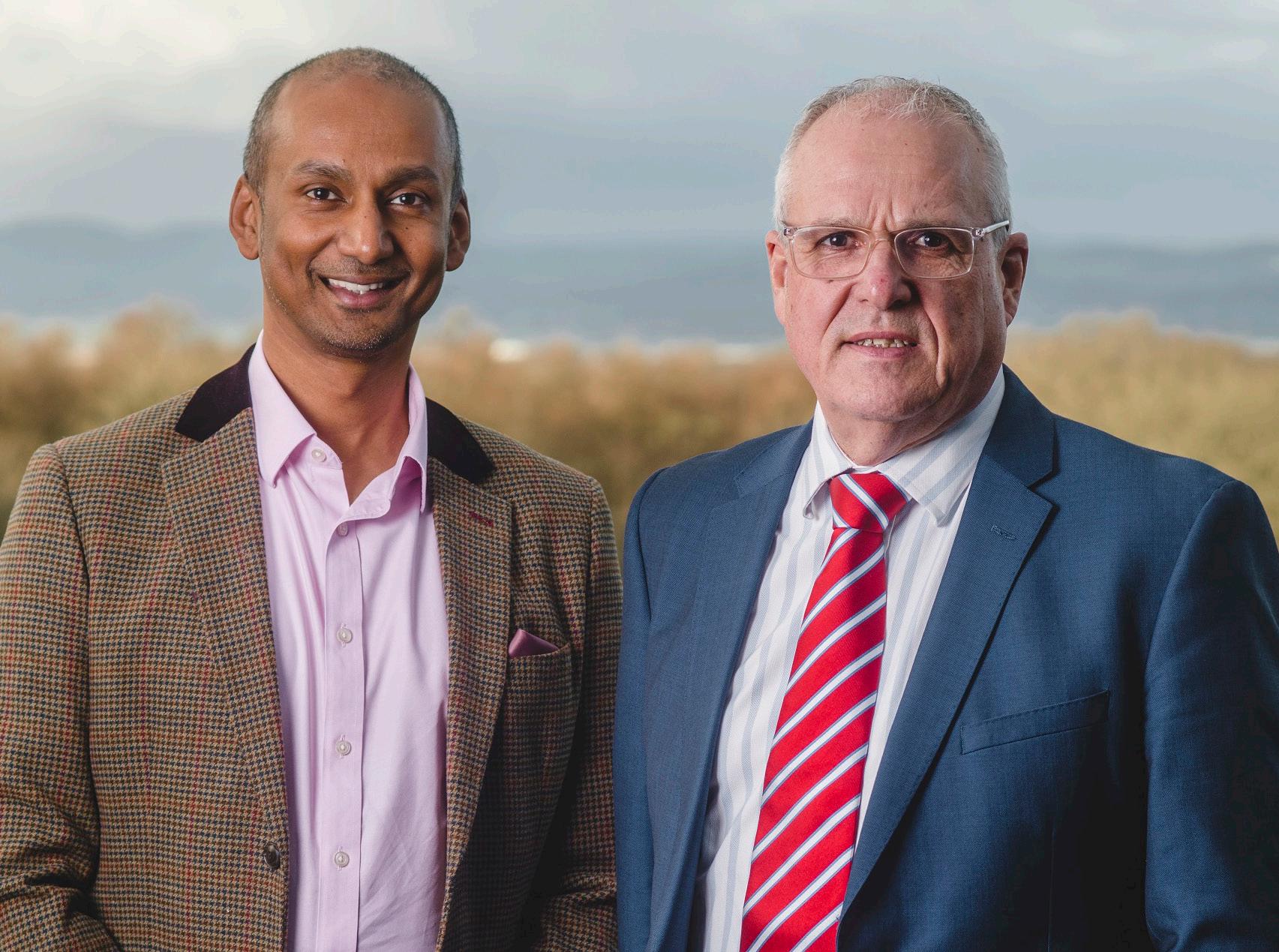
EMPLOYMENT & SKILLS
Pioneering rec-tech company Clu has appointed decorated tech executive Emily Foges as Senior Advisor and Chair of the company to drive a strategic step change as the company prepares for its first major investment round.

London, Foges’ award-winning career spans over 25 years and includes senior roles at Deloitte, BetFair, BT Retail and Equifax.
EMPLOYMENT &
Global influencer marketing business, Influencer has announced the appointment of digital media veteran Luke Barnes as President, EMEA and Michael Pekhazis as Vice President of Client Services in EMEA.

These appointment signal Influencer’s continued dedication to cementing the integration of influencer marketing into the wider marketing mix, while also signalling the start of an aggressive EMEA expansion plan.
DKK Partners, an emerging markets (EM) foreign exchange (FX) liquidity provider, has appointed former Citi MD Sandip Sen as Board Advisor. Sen, who held senior posts at Citi for almost three decades, will oversee DKK’s international expansion, and help develop the company’s FX capabilities and services in emerging markets.

Home Grown is the private members’ club dedicated to growing businesses by blending the values of a luxury club with a strong business aesthetic together with unrivalled networking opportunities. Based in the heart of Marylebone and part of the Home House Collection, the club features business lounges, pitching and meeting suites, private dining rooms, a restaurant, a Unicorn Bar and 35 bedrooms.

A global community of experienced entrepreneurs, sophisticated investors and business leaders, the membership package compounds an array of members benefits and events. Business talks from Rockstar entrepreneurs, leadership seminars, pitching events, a ‘How to…’ series and invite-only ‘entrepreneur-meet-investor’ dinners are just some of the activities designed to help members develop their businesses and connections.
Home Grown celebrates women in business all year round. Our diverse community is proof positive that female entrepreneurs are capable of not just surviving but thriving in the business world.
Despite that, challenges persist. Beauhurst’s latest report The Deal, recently presented at Home Grown Club in partnership with Coutts, unveiled that just two pence of every pound invested went to all-female founding team, versus 85p to all-male founding teams. The Rose Review Progress Report, the findings for which were also recently disclosed at Home Grown, further highlighted the additional support needed for female-led businesses to thrive, especially following the Covid-19 pandemic.
There are plenty of ladies moving building blocks in the business community (Home Grown is full of them!) but how can we pave the way for even more women to succeed in the business world? We have turned to the female entrepreneurs and investors within our community for insight.
fellow female founders (and allies), so build a peer group where you get answers to both mundane and key questions.”
First up is Priya Guha, Venture Partner at Merian Ventures, a San Francisco HQ-ed VC investing in female-led innovation.
“One of the most powerful tools women have, is their network. I’d encourage female founders to leverage their network and make the ask. Even if you’ve never met someone, tools like LinkedIn enable you to get connected to someone who can make a transformational difference in your business’ trajectory. But nothing beats face-to- face events, and it’s great to see those restarting at Home Grown and elsewhere. However, you’ve been introduced to someone, be proactive! Follow up and build relationships with the people you meet. There’s also an incredibly supportive community out there of
As an investor for Alma Angels, Home Grown member Deborah Saunders has been engaged in helping more female led businesses get the funding they need to flourish. She too has some words of wisdom for female CEOs seeking investment.

“There are some stellar examples of womenled businesses doing well at attracting investment. My personal view is that a lot of deals happen through the network. Men have traditionally been a bit better at building professional networks, and this helps them get in the door to speak with investors. Women are starting to pick up speed here, thanks in part to more networks and VC’s backing female founders (such as Alma Angels, Halogen VC Pact VC, Female Founders Collective, to name a few). A lot of deal flow comes through networking, so it’s important that entrepreneurs have a strategy for this.”

Luckily, Home Grown offers the perfect setting for making unforgettable introductions and striking unusual collaborations.
Terra Ventures and Vireo Ventures, and helped to build two more, including Shark Tank Ventures.
One of her latest achievements was assisting in bringing in Flypop’s seed funding round during the COVID-19 pandemic. While most start-ups were ceasing business during this time, the seed funding she helped to raise allowed her to secure match funding from the UK Government’s Future Fund. Airlines are famously hard to get off the ground, never mind finding funding for, so hats off to her! More recently, Cassy has been focused on start-ups solving climate change, she talks about it on her very own The Unicorns Podcast.
perpetuates the stereotype that women are less capable than men. Instead, we should be encouraging both men and women to lean on each others’ strengths and empower each other to create more diverse workplaces, which are statistically stronger after all.
“My advice for other women who are just starting out is to invest in building relationships with investors and mastering the art of fundraising for your business as early as possible. As we all know already, a massive challenge faced by female entrepreneurs is access to capital. Even though the percentage of female entrepreneurs is increasing year by year, the percentage of total VC funding they receive still is well below the halfway point. It’s not just getting better at doing due diligence and building financial models, but also forging relationships with the right people.
Whether you’re meeting people digitally or inperson, the more opportunities you seek out, the faster you’ll see the effects compound. You might even find a mentor along the way.”
“Someone told me an interesting statistic that men apply for roles if they can confidently perform just 40% of the job specification, whilst women want to be able to say they can do all of it. If that is true, I think this is one the biggest factors to the lack of gender balance in the sector. Deep tech needs women, it needs our insights, our experience and our intuition. If you are interested in deep tech and you don’t have an AI, science, or academic background, believe me it’s fine. My advice to women looking to succeed in the industry would be to find your people and allies. You can have all the money in the world but you can’t build alone.
“When people believe in you, they are so generous with their time, networks, advice and support. And make sure you give back too, keep paying it forward. Finally, don’t worry about the people who didn’t believe in you because of whichever pre-conceptions they came to the table with. After all, though we only get less than 2% of VC funding, and 53% less capital, we are 63% more successful delivering higher returns.” Let’s go!
To gloriously conclude our round of interviews with brilliant ladies of Home Grown, we spoke to Cassandra Harris, Founder and CEO of Litestream Ventures, who has been building a network of co-investors such as Buoyant Ventures, Burnt Island Ventures, Agfunder and Prelude Ventures. She is a venture partner in two other pre-existing funds, Una

We asked her about her experience as a female entrepreneur and her tips to other women who are just starting out in the world of business and finance.
“A while ago, I was invited to the World Economic Forum to speak on stage to a group of investors, but had to deal with a demeaning former partner who had very little faith in me it seemed. He policed my dress code despite not ever seeing me speak on stage before, and told me I wouldn’t be able to close the investment round, and that investors would only invest in someone who didn't look like me. I was completely anguished by this. But this experience was fuel for me to ensure that women are supported in this space.
“Despite only a very small percent of venture capital flowing to women it has become very trendy to be a female founder. It is so trendy that some companies front themselves with women, although the shareholders consist mostly of men. Yet, while women could employ the same approach and leverage the presence of men to help pitch their funding rounds, this isn’t a long-term solution, as it
It turns out that Cassy is also involved in creating docu-series and TV shows that profile entrepreneurs making a positive impact. We wanted to know her thoughts about how media can be used to inspire and encourage more women to become entrepreneurs.

“Strategically produced media allows you to shine the spotlight on female or male entrepreneurs on a global scale, increasing their ability to access funding and other resources, allowing them to tell their founder stories, and acting as a huge driver of inspiration for the generations to come. Women need mentors and role models to show them that it’s more than possible to overcome the perceived roadblocks to entering the world of entrepreneurship and defying the status quo.”
Well said! However, whatever the challenges faced by women in the industry, they continue to persevere and thrive. The insights and advice shared by our female members highlight the importance of building networks, finding allies, and believing in oneself, as well as the need for greater support and opportunities for female founders. Home Grown Club provides a platform for these women to connect, learn, and grow, and we can’t wait to see even more ladies breaking barriers and achieving success in the years to come.
 BY: GAVIN LEWIS
BY: GAVIN LEWIS
Gavin Lewis is the Managing Director at BlackRock and Co-Founder of the #TalkAboutBlack movement. With a self-proclaimed 44 years experiencing and 22 years of learning, he uses his experience and learned perspective on racial inequality, acknowledging the symptoms of inequality, but focusing on the root economic cause in an excellent attempt at social change from the ground up.
“This book doesn’t lift the lid on what causes racial discrimination but instead focuses on the hope left in Pandora’s box with an optimism for how we move forward
in tackling inequality, institutional cultural bias, and planning for a world where there is a higher standard than simply the absence of discrimination being celebrated.” – Tim Campbell MBE, BBC’s The Apprentice, and Business Executive
This groundbreaking new book reveals how managers all over the world can ditch the command-and-control leadership model and adopt an enquiry-led approach that cultivates a new wave of engaged, problem-solving employees – and it starts with how we use questions in a more purposeful way. Co-authors Dominic and Laura Ashley-Timms are the co-creators of the STAR® model – a simple 4-step management framework that helps leaders to adopt coaching-related behaviours.

“For any leader or manager in business, you need this! It has truly changed the way I think about leadership, for the better!”
– Nick Pointe
Arnaud Chevallier and Albrecht
Enders are co-authors of this practical guide that helps develop the invaluable critical skills needed to successfully solve complex problems at work and at home.
Arnaud Chevallier is a Professor of Strategy and prepares executives for the strategic challenges that organisations face in today’s dynamic global marketplace. Albrecht Enders is Professor of Strategy and Innovation, and has worked for clients from different industries, including Deloitte, Deutsche Bank, Siemens, Honda and Vodafone.
“Strong problem-solving capabilities are essential, especially when you confront complex problems that have a profound and long-lasting impact on your organisations. This book provides a thorough-yet-accessible approach to help you elevate your complex problem-solving game.” –
Jørgen Vig Knudstorp, Executive Chairman at the Lego Brand GroupThis book is the ultimate guide to becoming a more powerful communicator, influencer and leader.
Grounded in neuroscience and behavioural psychology, this book reveals how to cultivate a more engaged, value-driven workforce. René Rodriguez has almost 30 years of experience researching and applying behavioural neuroscience to solve complex challenges in leadership, sales and change.

“If you want to improve your presentation skills, this is the book for you. René has masterfully organised a series of strategies that will improve anyone’s influence regardless of their experience. I consider him a ‘black belt’ in influence and communication.” ― Rorion Gracie,
Co-Founder of theUFC

